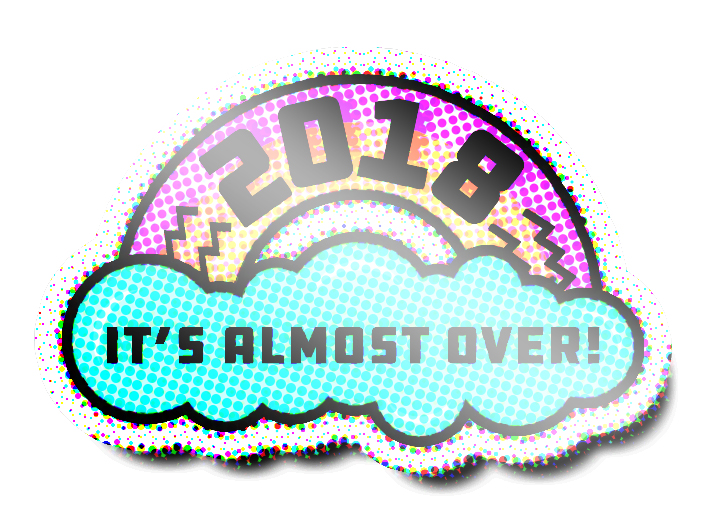We Need More Jewish Queer Women On The Teevee
2019 brought us the hotly anticipated musical finale of Transparent, undoubtedly one of the most resolutely Jewish television programs of all time. The over-intellectual, neurotic, navel-gazing and sexually freewheeling Pfefferman family initially made history for being the first TV show centering a trans woman character but, quietly over the course of its run, also made history for its portrayal of an almost entirely queer nuclear family: the now-dead matriarch Maura Pfefferman (trans and queer), the very-much-alive matriarch Shelly (mostly straight, but kinda queer), youngest child Ari (non-binary and queer), Sarah (bisexual) and Josh (the family’s last remaining heterosexual). Sarah, Ari and Maura dated and slept with men, women and non-binary people at various points throughout the show’s run. The two-hour series-ender was a distinctly Jewish kaleidoscope of bitter grief, stubborn joy and existential sexual dread. Arguably it did a better job portraying Jewish culture than it ever did at showcasing a diverse or representative portrait of the trans community. New Yorker television critic Emily Nussbaum once described the show as “aggressively specific: Jewy, screwy, L.A., upper middle class, not so much queer-friendly as queer-saturated.” When it debuted, Tablet Mag called it “the most Jewish show to come along in years,” and not just for the tangible details, like the East Side J and Cantor’s Deli, but because “Jewishness with its rituals, its spiritual wrestling and doubt, its biblical stories and metaphors, is interwoven, appearing effortlessly within the narrative.”
But Transparent is also one of three shows with queer Jewish characters that ended in 2019.
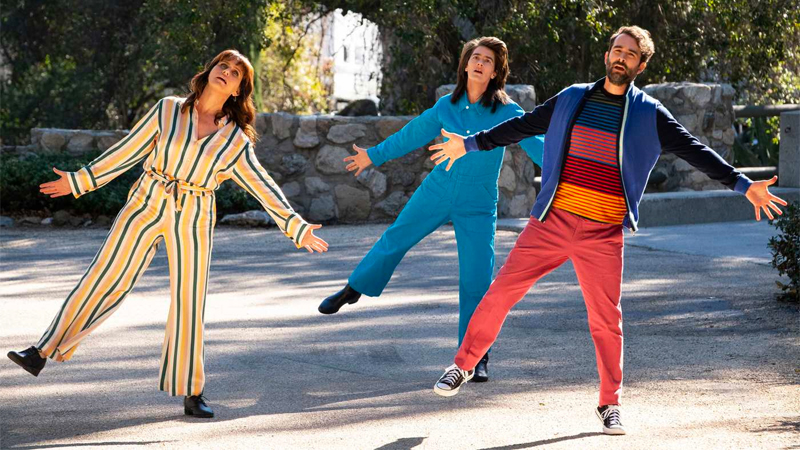
Amy Landecker (Sarah), Gaby Hoffman (Ari) and Jay Duplass (Josh) in the “Transparent Musical Finale” (2019)
There may be some truth to the stereotype that the Jews and the Gays are disproportionately likely to be “running Hollywood.” There’s even scores of lesbian and bisexual Jewish women currently writing, producing and directing television including Ilene Chaiken, Ali Adler, Carol Leifer, Carrie Brownstein, Sara Gilbert, Diane Flacks, Abbi Jacobson, Jan Oxenberg, Lisa Cholodenko, Liz Feldman, Nina Jacobson and Rebecca Sugar. Yet the stories that make it from studio to TV screen rarely reflect this abundance, even though Jewish and queer representation on television, independently of one another, has increased.
Some of TV’s most lauded shows of the ’90s and early ’00s had Jewish lead characters, like Friends, Seinfeld, Will & Grace, The Nanny (a rare bird for starring a Jewish actress who was also writer and co-producer) and The O.C. The 2010s comprised what at least one writer referred to as an era of “peak Jewish TV.” “If you kept up with critically-acclaimed TV comedies this past decade,” wrote Michael Fraiman earlier this year in The Canadian Jewish News, “you’d have noticed a hefty number of Jewish actors and showrunners behind some of the decade’s biggest hits.” He cites Golden Globe wins by shows created by and starring Jewish characters like Girls, Transparent, The Marvelous Mrs. Maisel, Brooklyn Nine-Nine, Mozart in the Jungle, and The Kominsky Method; as well as critical favorites like Schitt’s Creek, Broad City, Moshe Kasher’s Problematic, Crazy Ex-Girlfriend, Inside Amy Schumer, Sarah Silverman’s I Love You, Man Seeking Woman, Nathan For You, Workin’ Moms, The Goldbergs, Wet Hot American Summer, Better Things and Orange is the New Black.
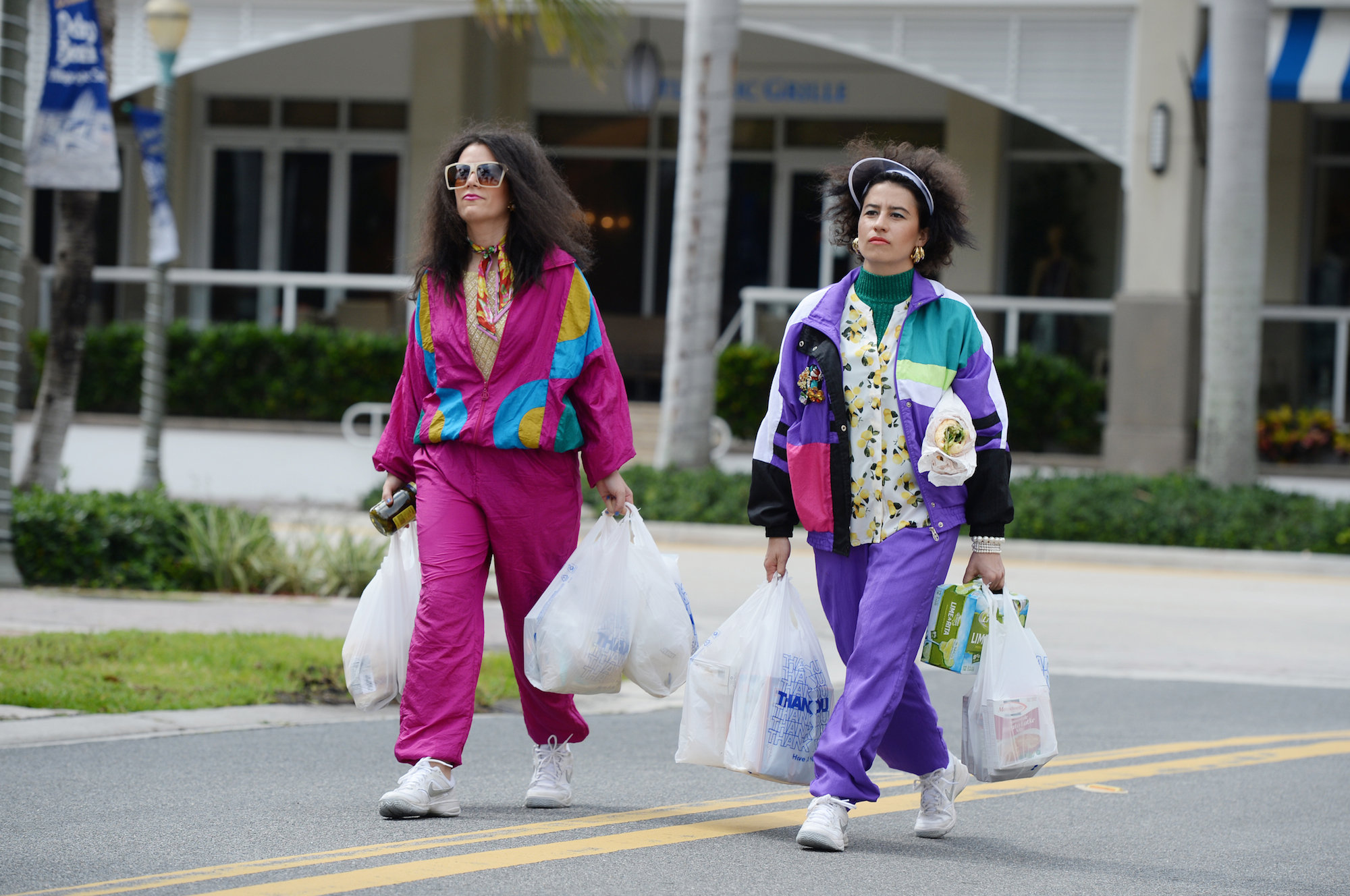
Abbi (Abbi Jacobson) and Ilana (Ilana Glazer) go shopping in Broad City “Florida” (2017)
But, Fraiman points out, “after the initial gold rush, the era is slowing down,” as most of these programs wrapped up recently or are about to. If this is true for Jewish television generally, it’s doubly true for queer Jewish women and non-binary characters specifically.
This year the number of explicitly Jewish regular or recurring queer women or non-binary characters on television is taking a huge hit, and we weren’t exactly thriving to begin with. Of the 1,024 LGBTQ regular and recurring women and non-binary characters we have in our database, only 22 are Jewish, only oof those characters were Jews of color, and nearly half of them were on shows ending in 2019: The Pfeffermans and their associates on Transparent, Abbi and Ilana on Broad City and Nicky Nichols from Orange is the New Black. Although Crazy Ex-Girlfriend’s queer characters weren’t Jewish, the show still offered an opportunity to enjoy Jewishness and queerness in the same televised package, and it too wrapped up in 2019. All four of those shows were critically acclaimed, pushed the boundaries of form and style, and resonated deeply with populations who’d previously felt underrepresented — as addressed in pieces like What Broad City Meant to Millennial Jewish Women, Broad City’s Celebration of Romantic Friendship and Bisexual Culture Has Changed TV Forever (full disclosure: I wrote that one), Orange is the New Black Wraps Up With a Very Jewish Final Season, Transparent Changed Me (and TV) Forever and Crazy Ex-Girlfriend Gave Us the Nuanced Jewish Heroine We Needed.
What remains? Susie Myerson on The Marvelous Mrs. Maisel, maybe, depending on your read of her sexual orientation. The Beverly Hills 90210 reboot BH90210 saw the in-world Gabrielle Carteris and her character of Andrea Zuckerman exploring her bisexuality, but the show didn’t earn a Season Two pick-up. The very Jewy animated comedy Big Mouth returned for its third season in October — lead character Jessi’s Mom, Shannon, had an affair with her cantor in Season One, but she hasn’t explored her feelings for women since. Sweetbitter‘s lesbian character Ari is played by Jewish actress Eden Epstein, although I’m not sure if her religion is ever mentioned on the show. The L Word: Generation Q reboot confirmed the death of its Jewish lead, Jenny Schecter.
Thus what absolutely remains is the pansexual Lauren Heller, played by Molly Bernard, on TV Land’s Younger (the actress credits her character with helping her come out, too) and Nomi, a bisexual college student on the Freeform series Grown-Ish. There’s also, most notably, Batwoman, played by the very not Jewish model/actress Ruby Rose, although references to her Judaism have been sparse thus far. We’ve also still got some Jewish shows that boast queer characters, although none of the queer women and/or trans characters are Jewish: Schitt’s Creek (which ends this year), Russian Doll and G.L.O.W.

According to our 2018 “Lesbian Stereotypes Survey,” which garnered 12.3k responses, queer women and trans folks — at least the ones peripherally aware of this website — are WAY more likely to identify as Jewish than heterosexual Americans are. This was true with Pew’s analysis of LGBT populations as well, and their survey also found Jewish respondents to be more accepting of homosexuality than adherents of other popular religions in the U.S. There are so many prominent queer Jews at the forefront of activist and artistic movements. Yet we are uniquely hard to find on television, although stories about the intersection of faith and homo- or bisexuality have been some of the most popular queer stories ever told.
For many queer Jewish millennials, Transparent and Broad City were the first time we saw anything that looked anything like us on television. It can be one of those things you don’t realize you need until you get it, and then you’re left craving so much more, especially at a time when Anti-Semitism is very much on the rise. Stereotypes about Jewish people permeate even the most socially conscious queer communities — most nefariously, the assumption that all Jews are Zionists — and stereotypes do their best work in absence of alternate narratives.
I started writing this post in the fall. In anticipation of the Transparent finale, I wanted to do a list of all our top 25 favorite queer Jewish characters. But there weren’t 25 characters to include. So this is what I wrote instead.
“Orange Is the New Black” Season Seven: Everything Is Different Our Final Time Around
Orange is the New Black debuted its final season last week and the TV Team took some time to reflect on its legacy including, of course, its unprecedented inclusion of queer characters.
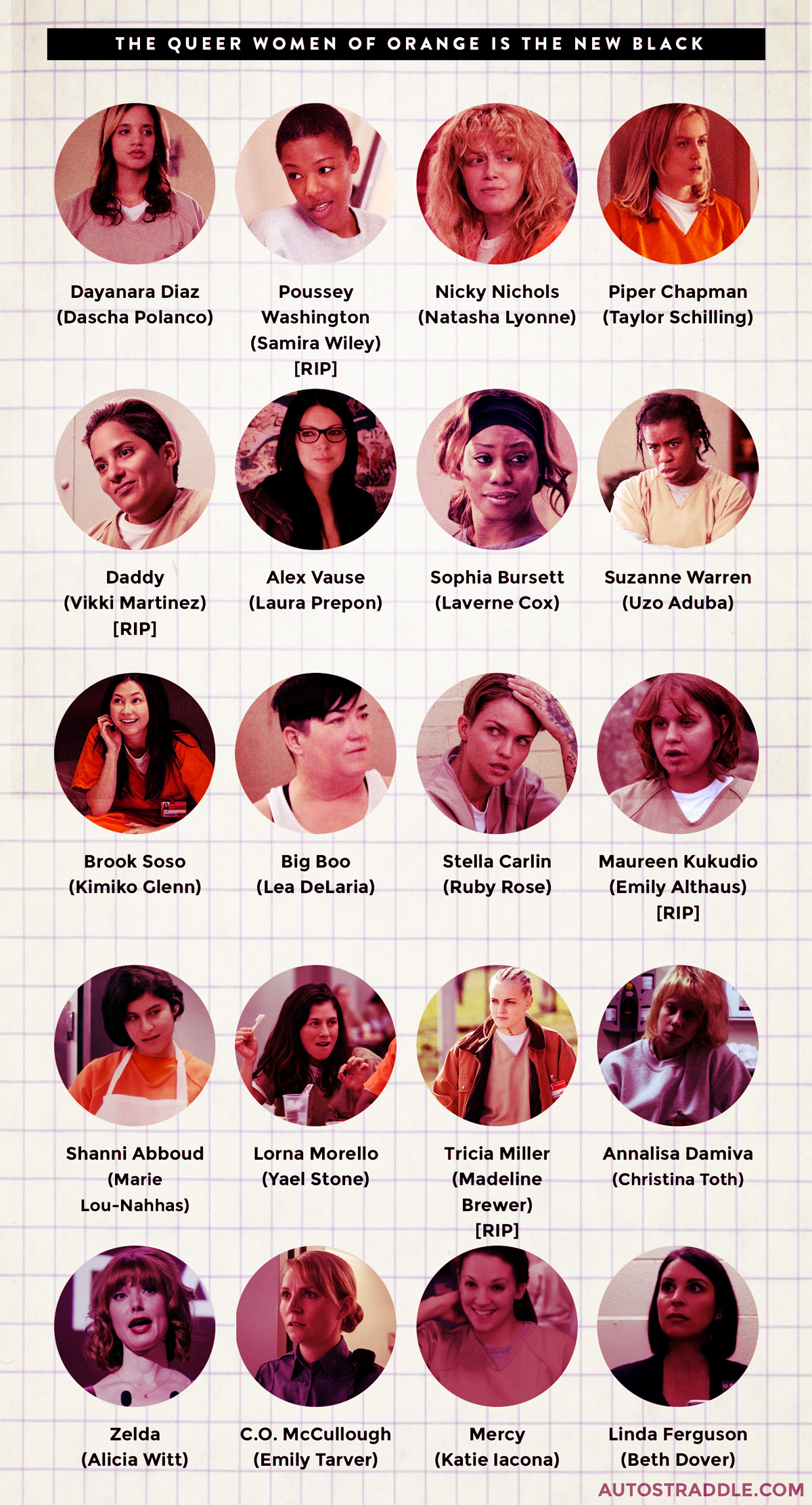
Today, the only two TV Team members who still participate in the annual OITNB Holiday Binge Ritual Weekend — Carmen and Riese — are here to talk about what they witnessed and how it all wrapped up.
Riese: Well, we had our last Orange is the New Black weekend binge ceremony! How do you feel?
Carmen: To be honest, I wasn’t sure how I was going to feel when I started this season. I had a lot of butterflies when the theme music started on the first episode. (Side Note: Am I the only one who has a bit of Stockholm Syndrome for “You’ve Got Time”? I remember really hating it in the early years, but this time when the familiar notes first hit, I couldn’t help but tear up! ANYWAY! Enough about me!) There are few shows that I have loved with the ferocity that I loved Orange is the New Black, and there are exactly zero shows that have broken my heart the way this show did. So when it came to the final season, I was trying to prepare myself for anything.
I have to admit right away: By the time we hit the final montage, I was barely holding it together. When they got to the scenes where we caught up with Big Boo, Yoga, and Norma? My heart was caught in my throat. When the camera panned to Janae running outside with Alison keeping time and Soso walking just ahead of them? I jumped up and down in my bed like some kind of tween! I fist pumped the air! Then I openly sobbed. I felt so settled to know that they were OK, out there in the world. Their lives had continued. The last time we saw them, it was in the midst of trauma. This was healing.
Riese: I was wondering when we’d see them again and wow my heart skipped a beat when Soso and Watson popped up, like seeing old friends! Who I wish we’d still had on the show instead of all those new white characters in Max!
Carmen: The last season was far from perfect, and I didn’t love how they wrapped up every character, but the final minutes really impacted me, and it left a real impact on how I reflect back on the rest of the season.
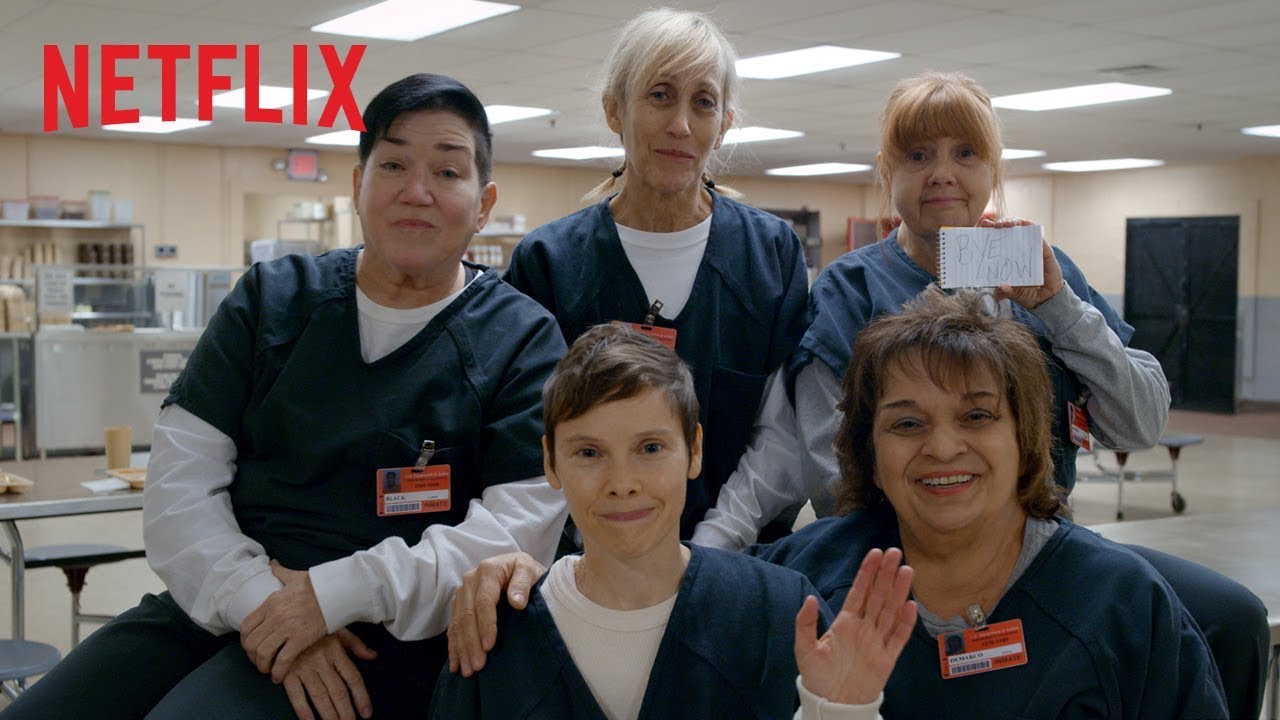
Riese: For sure. Also, I dare you to watch the 19-minute “Orange Forever” featurette Netflix casually suggested I experience and try not to cry. I don’t know there’s ever been another show where there were this many characters I cared for so deeply — or a show besides The L Word with this many queer women characters. But I was also really moved by the actors talking about how they’d been struggling to get cast for so many years when this job came along — I’m sad we lived in a world where Uzo Aduba and Selenis Leyva and Jessica Pimentel weren’t getting jobs.
Carmen: Well Netflix clearly doesn’t love me, because they didn’t suggest that featurette! I agree though, by far the strength of Orange is the New Black has been the depth of its cast. Hopefully, that will be their legacy. I mean, they won the Screen Actors Guild Award for Best Ensemble in a Comedy Series for three years in a row for a reason. Do you remember when Viola Davis became the first black woman to win a Best Actress in a Drama Emmy? She said, “The only thing that separates women of color from anyone else is opportunity.” That’s what I think of when I think about this cast. There are so many supremely talented women of color actors who just need someone to give them a shot.
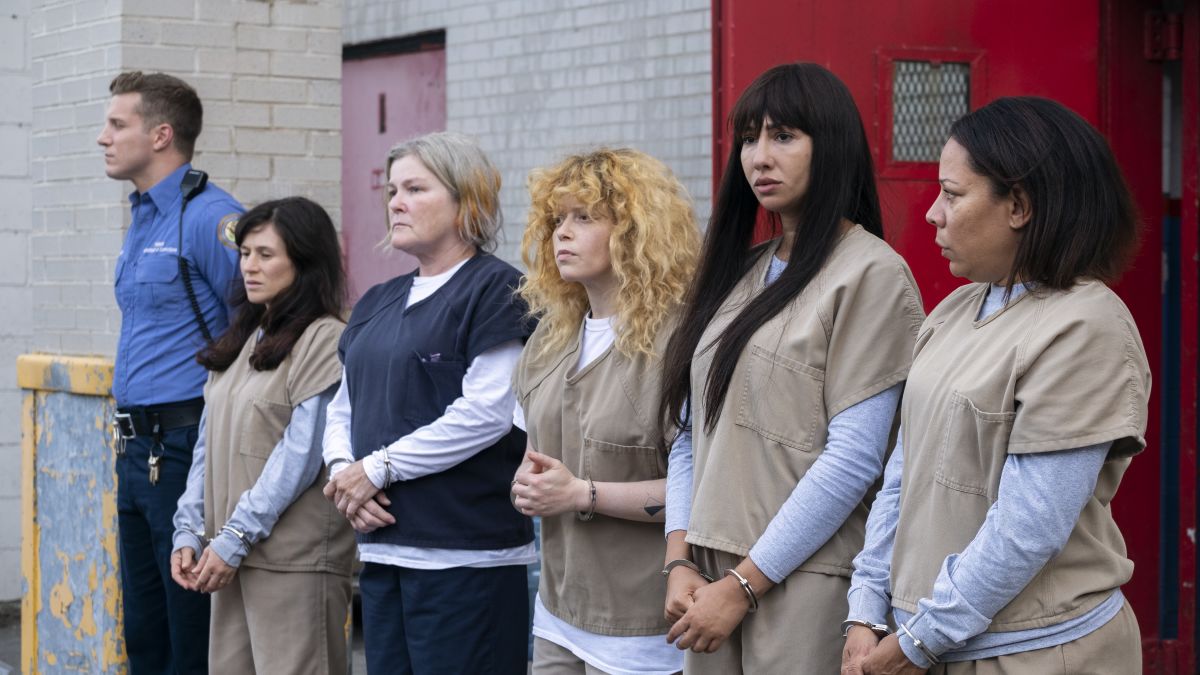
Carmen: I’m curious, where would you rank the final season, compared to OITNB’s previous outings? Obviously, nothing for me will be as painful as Seasons Four and Five, when the show really lost itself to what amounted to torture porn and, in my opinion, betrayed its queer and people of color viewers. I was pretty surprised that Season Six found its way back to firmer ground. For me, the final season lands somewhere in the middle.
Riese: I think so, too, and I’m not sure where I’d rank it. — I think they effectively accomplished what Season One also did pretty well too, which was expose the cracks and earthquakes and deadly canyons of the system without subjecting us to a hopeless parade of women getting beaten down literally and figuratively over and over and over again with minimal hope on the horizon. This season approached old themes and some new ones too: the difficulty building a new post-release life on parole or with a felony conviction, the impact of solitary confinement on the human body/soul, how one copes with the death sentence of a life sentence and, of course, the inhumane horrors of ICE and Trump’s current immigration policies. The interpersonal relationships definitely had a “winding down” feeling to them that was inherently less edge-of-your-seat compelling than rising conflict, and a lot of the flashbacks felt inconsequential. But I rarely felt subjected to torture porn in the way I have felt in previous seasons — although honestly showing us Karla stranded in the desert at the end of that episode was a big WTF moment? Like… why??
Carmen: I absolutely, positively hated what they did with Karla! I think her story was heartbreaking enough, they could have left it with her goodbye phone call with her sons.
Riese: Yeah they sure could have!
Carmen: I appreciated following Karla’s arc and the personal face it gave to child separation, even though I always knew going in that it was going to end with her losing her case. I had no need to see her crossing back across the desert, especially if they were going to leave her stranded and injured! What is the point of leaving her like that, alone and facing certain death?
Riese: I was also surprised that they weighed down this season with two inmate deaths — and killing Daddy in the first episode? How are you gonna go and kill another masculine-of-center lesbian of color after how mad we got the first time? What the hell, show?
Carmen: I AM STILL PISSED!! And not just because of my well-documented Daddy Thirst from last summer! I cannot believe that this is how they chose to open their final season, by proving that they had learned nothing from their most defining mistake!
Riese: Yes I would like to also hold space for my Daddy Thirst.
Carmen: I understand the overarching storytelling choice to remove the “new” characters and focus on the core cast in the final season, but why didn’t they just transfer Daddy to another prison like they did Badison? Or give her early release? Their options were endless.
Riese: I would also like to hold space for how relieved I was that they got Badison out of the show. When she swaggered up to the plate in the first episode and opened her mouth and words began coming out of her mouth I was like Oh for fuck’s sake.
Carmen: I was so happy to see her go! And, I mean, obviously I didn’t have the same emotional connection to Daddy’s death as Poussey’s, that goes without saying. Thankfully the writers decided to kill her off-camera, unlike some of their other more gruesome choices in past years. Ultimately, by mid-season my mind wasn’t focused on Daddy anymore at all. But still, it was shortsighted and incredibly disappointing.
Riese: Is… Daya dead? I can’t tell what we were supposed to think there. LezWatchTV added her to their death database.
Carmen: No. I didn’t read her final scene as being her dying at all! First of all, I refuse to live in a world where Aleiada would kill her own daughter – even Daya. That goes against everything we’ve learned about her character. This is a woman who landed back in prison because she was protecting her daughter from a predator! Aleida screws up royally, but there’s one thing we learned from her flashback, it’s that she never wanted to repeat the same mistakes of her own mother. She never wanted to actively harm her kids.
Second, the guard was running right towards them! In a crowded, open room full of people! It takes longer than that to choke someone. I read Daya and Aleida’s final scene as confirmation that their relationship will continue on as toxic and violent as it has been. It’s a depressing full circle from the first episode of the show, when Aleida slaps Daya on her first day inside.
Riese: I appreciate this perspective because I was shocked to see it listed as a death! Speaking of death! Tiffany’s overdose. So. Total body count for this show: Tricia, Poussey, Maureen, Vee, Rosa, Barb, Carol, Daddy, Doggett and two guards. Not out of line for a show about prison but still. Damn.
Carmen: Karla’s scene and Tiffany Dogget’s overdose were two of the most glaring missteps of the season for me. I feel so conflicted about Doggett’s overdose! It caught me completely by surprise. I didn’t necessarily believe throughout the season that Taystee was going to die by suicide, but the graduation episode was the closest I came. She convinced Tamika to bring in Storky’s – which she had told Daya earlier in the season was her final meal of choice. Her lawyer told her that her case had no future because Suzanne wasn’t a reliable witness and Cindy was nowhere to be found. She said goodbye to everybody. It was already the end of the season, so I was sincerely worried.
And at the last minute – it was Doggett instead.
Riese: Because I am a fool who never learns from her mistakes but also an idiot with a lot of trust issues, I was both completely terrified and completely confident they wouldn’t kill Taystee.
Carmen: I don’t know if I believe that Doggett overdosed intentionally, but maybe she did. To be honest, I think Orange is the New Black failed Tiffany Doggett. She was a joke because of her rural poverty, then she was raped and fell in love with her rapist. When it looked like she was finally going to have agency and a happy ending, it was snatched from her hands. Then she died. Doggett was never my favorite character, but this felt terribly unfair.
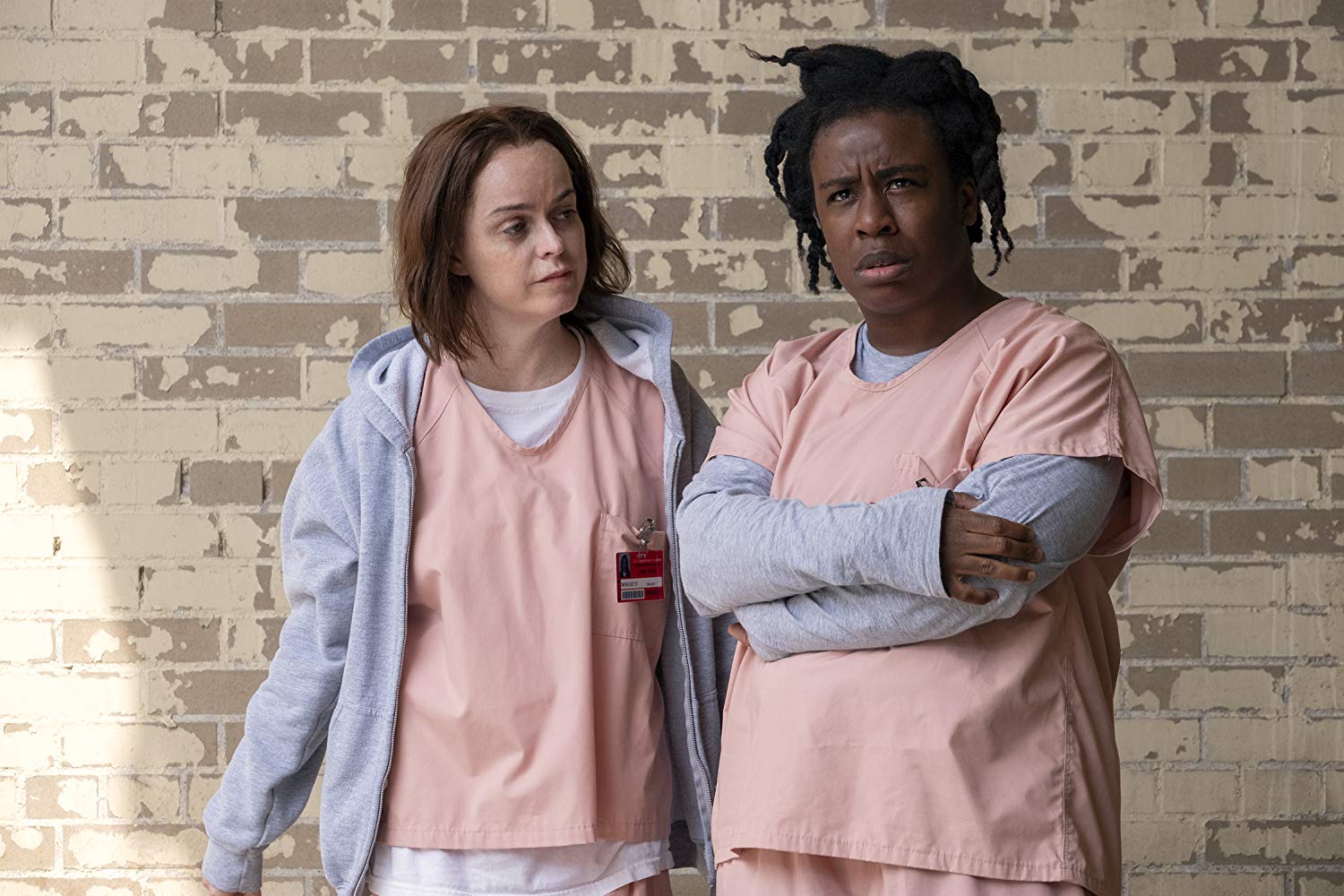
Riese: I thought a lot about that Shawshank Redemption line about how you “gotta give em hope” this season. Although the new warden was eventually fired, I enjoyed the refreshing break for several episodes where programs were taking place that gave inmates something constructive to do besides just destroy each other out of restlessness. I think sometimes television does have an obligation to deliver a narrative that models how things could potentially get better instead of doubling down on the most dramatic narratives possible wherein everything gets incredibly worse. Like how Glee eventually made the choice to turn the high school football players into Kurt’s defenders rather than his attackers, as per the general coming out trope, which I think had a genuine impact on culture. I know this is a totally different scenario with different stakes, but you know what I mean?
Carmen: I think I do, yes. It’s like in our Orange is the New Black roundtable last week, Drew wrote “it would be disingenuous to end on an entirely happy note. We can’t pretend like prisons have been abolished, we can’t even pretend like prison abolition is even in the near future of this country” – so then, what does hope look like in this situation?
I think that, despite the odds, Orange is the New Black ended by finding that balance. For some of the women, a “happy ending” was finding peace with the help of their chosen families on the inside. For Nicky, it was growing up after losing Red and Lorna, and deciding to become a kitchen mom to a family of her own. Flaca decides to honor Martiza by helping more immigrant women. Gloria is released and reunited with her kids and grandchild. For Cindy, it was fighting back against recidivism and homelessness. Even Lorna and Red are there to comfort each other in their own way. Then of course there’s Piper and Alex. I’ve never been a fan of their relationship – but the final shot on Alex’s smile? It got me.
Riese: Yeah it was cute! Again, I know it’s a different situation but I oddly found myself relating to Piper for the first time ever on just one specific circumstance, which is the disorientating nature and logistical nightmare of designing your life around visiting your girlfriend during visitation hours at the not-conveniently-located facility where your girlfriend lives! (From when my then-girlfriend was institutionalized.) We’ve seen a lot of visitation scenes throughout, but it’s usually not twentysomething girlfriends who we follow out to the bus stop afterwards. It was always so disorienting to walk out of that locked, controlled environment to the train stop, surrounded by everyday people doing everyday things. Or when Alex got her hands on a cell phone! Every now and then my then-girlfriend was able to score a phone and it was like Christmas. So that kinda hit me in the gut.
Carmen: A lot of queer women were first drawn into Orange because of Piper and Alex’s relationship, but to keep it real – I always kind of hated them. Part of that was because I always hated Piper, I’m sure, but their relationship was toxic from the start in a way I couldn’t root for. Which is why I was so surprised by how moved I was with their prison wedding in Season Six! Season Seven continued that trend. I was so touched by watching them try to navigate (and mess up! and try again!) finding a new, healthier terrain for their relationship now that Piper was on the outside.
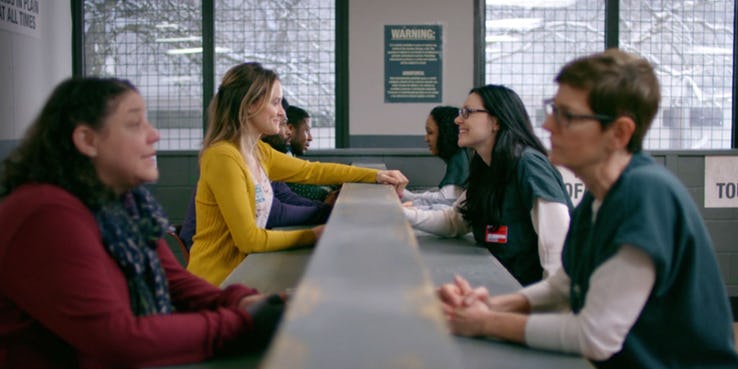
Carmen: Were you surprised that the show didn’t end with Piper writing the book? Orange is the New Black is based on Piper Kerman’s memoir of the same name, so I always thought Piper Chapman getting out and writing about her experience was a forgone conclusion.
Riese: I sure was! I thought that’s exactly what would happen next. But I think at this point Kerman and Chapman’s similarities have vanished into the ether. Kerman is a better and more socially conscious person than Chapman, you know? Realistically it wouldn’t be consistent for her to suddenly start caring deeply for anybody besides herself. Once she’s gone, the only inmate she still even thinks about is Alex.
Speaking of questioning the system though — I really wanted Suzanne’s interrogation of her fundamental trust of the criminal justice system to go somewhere further than it did. I was really hopeful about it.
Carmen: Yeah, I was struck by how meditative and thoughtful this season was! Between Suzzane’s personal interrogation of the faults of the criminal justice system, Caputo’s Restorative Justice classes, Tamika starting an education program, and the (admittedly heavy handed) analogy of the chicken coops, there were a lot of productive avenues to explore about how we think about prison reform. I’m glad Orange is the New Black got those conversations started, but given the slower pace of this season, and the fact that it was their absolute last opportunity – I agree that they could have dug deeper.
In particular, Suzanne’s scene with her mother, when she asks “Do I deserve to be in here?” just broke my heart. It was such a pitch perfect breakdown and distillation of all the ways we often mistakenly associate guilt with punishment. I think the intention was for Suzanne’s exploration to continue through her treatment of the chickens. Lolly (welcome back, Lori Petty!) points out to Suzanne that she’s essentially creating a chicken SHU and that it’s cruel and unusual punishment. Suzanne eventually learns the point, and I loved the scene when she and Taystee let the chickens back out into the fresh air, but I think the connective storyline was a bit muddled. Which is too bad.

Riese: Let’s talk about ICE and the detention center, which I thought they put into the main narrative in a really effective way, bringing us back to familiar characters through unexpected routes while introducing a limited number of new narratives. On the lightest note possible, they also gave Nicky a new love interest, Shani! It was sweet, revealing a softer side of Nicky and giving her some lightness amid a lot of loss. The top v top thing was funny until I realized where it was probably leading, but I felt that development was handled delicately and tenderly, both within the story and between the two women. It was a hard season for Nicky, but she also grew a lot.
Carmen: I definitely didn’t realize where we were going with Shani’s plot until we got there. I completely bought into the top verses top narrative and didn’t question it. I think it’s great that OITNB told the story of a Muslim queer woman before they took their final bow. Though it’s very important to note that not all Muslim women, and not all women from Africa, are required to go through genital mutilation. I wouldn’t want anyone watching the show to walk away thinking that! Still, I agree with you, it was handled so sweetly and delicately. I was touched by Nicky’s tenderness and care for Shani, we haven’t seen her show that side of herself with any other lover except Lorna. I also appreciated that we got to see Shani’s life in Egypt – that she lived in a city, that she had an Instagram account, and a girlfriend. It’s vital and further helps break down the one-dimensional stereotypes that we often receive about Muslim women from television.
Riese: Agreed. And I cried when Maritza and Flaca reunited!
Carmen: I was so thankful to not only see Maritza back, but to have her back with Flaca! I’ll never forget their Season Five goodbye outside of the prison buses when they realized they were going to be separated. There’s something about the way that characters from Orange is the New Black have felt so lived in over the years that even now, having not seen or heard from Maritza since 2017, it felt like being reunited with family. That familiarity was used effectively with the ICE storylines. It hurt to be brought back with Martiza, only to lose her again so suddenly. But that was the entire point – and I think they did it well.
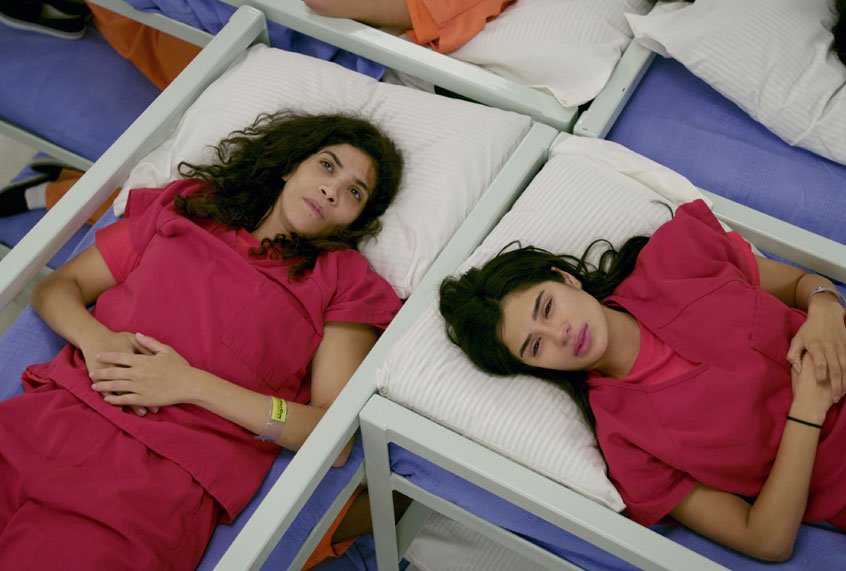
Carmen: I also think it was intentional that Martiza thought she was born in the United States; Diane Guerrero is a DREAM Act activist and was born in the United States, but grew up here alone after the rest of her family was deported. The truth is that if Orange is the New Black was going to be serious about discussing the prison industrial complex and mass incarceration, then we were going to have to talk about ICE and the privatization of detention centers. Without it, we were never going to get a complete picture – they’re connected arms of the same beast.
I think a lot of people will assume that this storyline was brought on by the recent media focus on deplorable and inhumane conditions of the detention centers at our borders, but actually Jenji Kohan first made this storyline decision in 2017. Having the storyline finally come to fruition in 2019 meant that no matter how awful Orange is the New Black depicted life for these immigrant women, we already know that the reality is unspeakably worse.
Riese: I mean when shit is so bad that Fig actually feels moved to take a risk to offer help to a pregnant woman in the center and when prisoners down the hill have more access to resources than you do… it’s just despicable. And that facility was pretty decent compared to what we know about the situation at many detention centers / concentration camps now.
Carmen: To be frank, I find it really hard to talk about immigration centers and ICE. Mostly because it’s near impossible for me to do so without crying. What’s happening right now is a crisis. I’m thankful that Orange is the New Black took precious time out of its final season to focus on it. Ultimately, I think they did so smartly and effectively – by once again putting the stories and humanity of women of color at the center of their narrative.
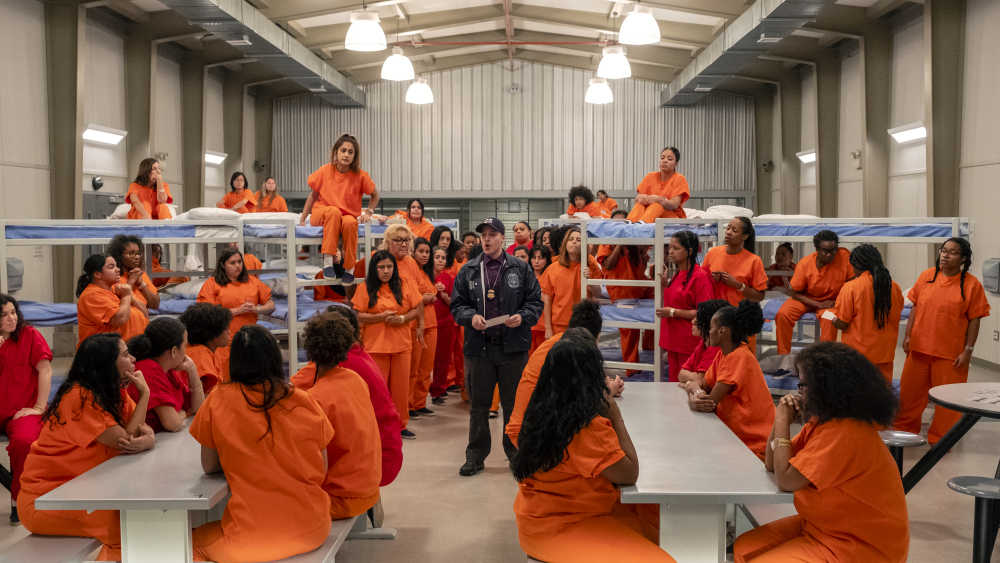
Riese: I really feel like they left us in this story they’d barely started to tell, putting it on us to keep up with it in the real world. It’s a story that I think is arguably the United States’ most pressing humanitarian issue / crisis right now.
Carmen: I’m also SUPREMELY GRATEFUL for Blanca’s happy ending. I rarely root for straight couples – but Blanca and Diablo? Turns out that they are my Orange is the New Black OTP.
Riese: No, I agree.
Carmen: I hope they are happy in the Dominican Republic, eating moro de habichuelas and having lots of great kinky sex.
Riese: I would love that for them! So, we both wanted exoneration for Taystee this season, and we… didn’t get it. I was gonna have to light my television on fire if she killed herself, but thankfully she did not.
Carmen: 100% I was going light my TV on fire and then I was going to riot. I was prepared.
Riese: I like where she ended up, though — throughout the series it’s been suggested that Taystee is a deft, patient and talented teacher and it’s good to see her in a position where she can put those skills to use, while working towards a broader goal with her microloans initiative.
Carmen: I completely agree! When Orange is the New Black first introduced “The Poussey Washington Memorial Fund” via their cast’s Twitter and Social Media accounts the night the new season dropped, I rolled my eyes.
Riese: Yeah, same.
Carmen: I appreciated the fund’s dedication to support criminal justice and immigration justice organizations that help disenfranchised women like those we’ve spent the last seven years getting to know, but I also couldn’t shake the way that it felt like a cheap ploy. The introduction of the Poussey Washington Fund from within the show, that Taystee is naming her microloans initiative after her lost best friend, worked a lot better for me.
Earlier we talked about how disappointing it was to see Orange is the New Black start their season by killing off another masculine-of-center lesbian of color – which is still emphatically true – but, this ending felt right. It felt right that if Taystee wasn’t going to be exonerated (which is still my preferred ending), that she was going to be able to do such good in this world.
It felt right that a show that caused such harm with the murder of Poussey Washington ended its legacy by saying her name.
“Orange Is the New Black” Changed Everything We Thought We Knew About Queer TV
The final season of Orange Is the New Black lands on Netflix today; before we publish our review, our TV Team decided to take a look back at the ways this revolutionary show brought us together and tore our hearts apart.
Are you still watching Orange Is the New Black? Why/Why not?
Valerie Anne: I’m not. I tried to watch Season Five, I did, but I just could never get past Poussey’s death. It didn’t help that they were trying to make me empathize with the guard who killed her, while also trying to give Tiffany’s rapist guard a redemption arc. It was hurting me too much for even Alex Vause to heal me, so I had to let it go. Which isn’t something I do often or lightly.
Drew: I am still watching. Despite the flaws, despite the arcs that felt like a real chore to watch, despite certain decisions that have angered me, I love these characters too much to ever give up on them. And it’s still one of the few shows with this many queer women. I’ll also say, even at its worst, there has never been a season of the show I didn’t still find some worth in. It will always be a treat to watch these actors if nothing else.
Natalie: I am not. I made the mistake of logging onto the internet on the weekend that the fourth season dropped and someone added a comment on our Bury Your Gays tally that included spoilers about Poussey’s death. I happened to see it on the frontpage sidebar and thought, “Nope, I’m not doing this to myself.” I’d already been wavering about continuing to watch after they sent Sophia to the SHU at the end of the third season but killing Poussey felt like a bridge too far. I never watched another episode of OITNB after that.
Heather: Oh wow, Natalie, that is EXACTLY what happened to me, down to my doubts about Sophia in SHU and the comment in the sidebar. I also haven’t watched since then.
Carmen: I am still watching! It’s complicated, to say the least. Like Natalie and Heather, I was also spoiled about Poussey’s death the weekend the fourth season dropped. A friend messaged me “It looks like OITNB added another dead lesbian to the list” – and let’s just say, I knew it wasn’t going to be Piper or Alex, for obvious (white) reasons.
I still watched the fourth season though, and it was painful. There’s never been a television death that broke me like Poussey’s. Never, not once ever. I mourned her. I still can’t watch her, even in old episodes, without a visceral pang in my chest. Which is to say, for at least a year after the infamous death scene I swore off the show completely and was 100% committed to burning everything Orange is the New Black touched to the ground and salting the earth upon which it stood. But something changed for me. I decided I wanted to stay a part of the critique, of the conversation.
I’d once loved this show so deeply and openly, and to be honest I’ve still found ways to love it even now. It’ll never be the same as the earlier seasons, there’s a hurt that lingers underneath that I can’t shake. But I’m glad I watched until the end. Orange is the New Black was an important part of my coming of age – as a black queer woman in my 20s, and now in my 30s as a television critic and writer. I wouldn’t be here doing this job if it wasn’t for that show. For that I am thankful.
Riese: I am. I’m also right there with Carmen — Poussey’s death, in my opinion, was the most devastating and most poorly handled TV character death in queer television history. I kept watching because it still has a cast that is mostly women and racially diverse with multiple queer characters, and because it’s full of incredible actresses doing work that is very valuable to them. I want to remain part of the cultural conversation around it.

If you are still watching, what are your hopes for this final season?
Drew: I don’t know! Usually I go into a show’s end knowing whether I want it to do something bold or do something crowd-pleasing. But with Orange I just don’t know. I think I don’t trust them to do something bold, but am hoping they prove me wrong. The problem with subject matter like this is it would be disingenuous to end on an entirely happy note. We can’t pretend like prisons have been abolished, we can’t even pretend like prison abolition is even in the near future of this country. But still I hope the end is not too maudlin. I hope they find a way to respect these characters as human beings and not just political talking points.
Carmen: Well, I’m the exact opposite! I know what I want – for Natasha “Taystee” Jefferson to be exonerated.
I want OITNB to take their final bow by giving respect to organizations like The Innocence Project and those others who are already doing the work of changing the prison industrial complex, improving the quality of life for those incarcerated, and working to free those who have been wrongfully imprisoned. There’s a lot of ways that Orange is the New Black brought mainstream national attention onto the lives and stories of these women, but the show also did a lot of damage. The most just thing they can do at this point is to acknowledge their hurt and move the spotlight that’s been so graciously bestowed upon them to those organizations and voices that need it and deserve it most.
Riese: I want Taystee exonerated too. There’s no such thing as justice for Poussey, but it’d be cool if they at least aimed for it. I’d love to see Sophia finding happiness on the outside. Honestly at this point I think a lot more about what I hope I don’t want to see.
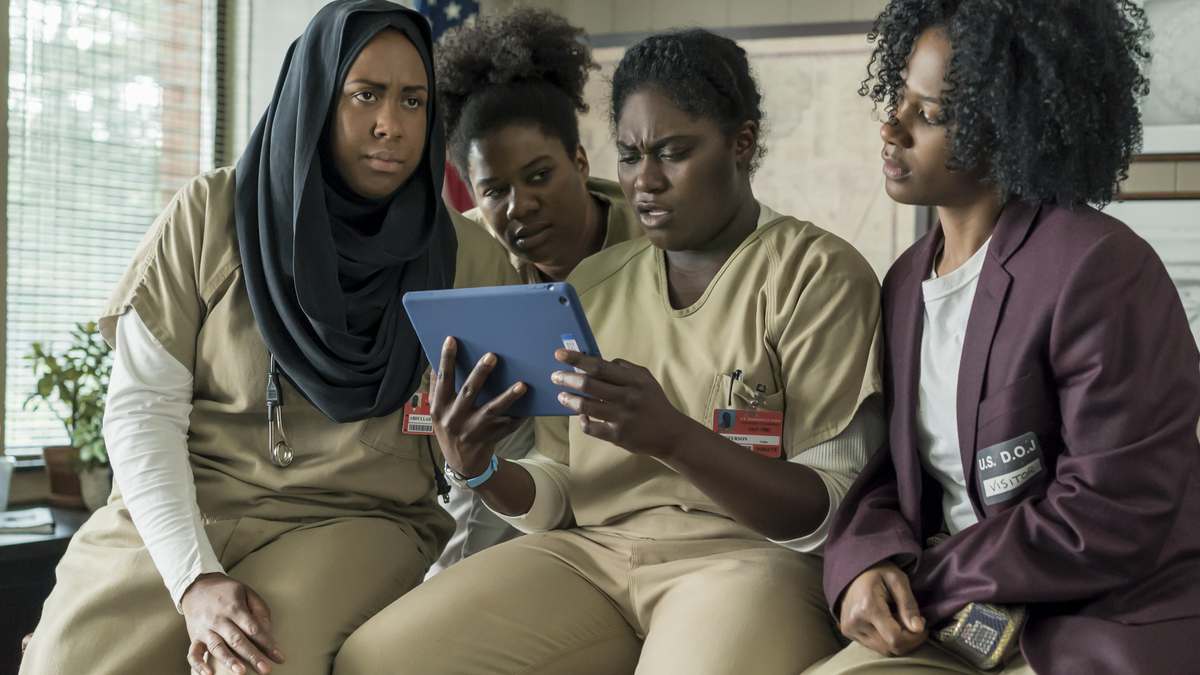
Do you remember how you felt when you watched the first season of the show, back in 2013? What struck you about it then?
Valerie Anne: I remember being struck by how centered around the women it was. And how… flawed everyone was. There were no shiny princess characters. Piper sucked. But that was okay. The whole point was kind of her figuring out that she sucked. It was immediately obvious that this was a queer show, and it as immediately obvious that this wasn’t a queer show about a bunch of skinny white girls from LA. It won’t say it was REAL but it was raw and it was new.
Carmen: Valerie took the words right out of my mouth! “It was immediately obvious that this was a queer show, and it as immediately obvious that this wasn’t a queer show about a bunch of skinny white girls from LA.” I spent my college years watching The L Word on smuggled hot pink DVDs, YouTube compilations, and cable reruns that I quickly erased from our family’s queue so no one would know I was gay – which is to say that I learned a lot about queerness from women who looked nothing like me.
In the Season One finale of Orange is the New Black, Samira Wiley sings “Amazing Grace” during the Litchfield Christmas pageant. I melted, and then I wept. I’d never seen it before. I had never seen the low buzz cut and swag and soft eyes of a black butch like the black women and masc folks I’ve loved in my own real life. I’d never seen someone capture their tenderness, when so often other stories about black butches (the few that exist!) focus on their hard exterior. Between that – and literally everything about Laverne Cox and Sophia – I knew OITNB was different. It was going to change the game.
Drew: I actually didn’t start watching in 2013! I caught up around season three. I’d originally skipped it because of how focused on queer women I knew that it was. That was such a large part of the cultural conversation even in my straight/closeted circles.
Carmen: Awww, Drew!
Drew: When I did finally catch up, a lot of people I knew had already stopped watching. But, ever the contrarian, I actually liked the show more as it went along from season one to season three. I appreciated how much of an ensemble the show became and I was thrilled to see characters who I’d never before seen on TV pull focus from the more obvious protagonist of Piper.
Natalie: I was really nervous about watching this show to be honest. I’d stopped watching Weeds, Jenji Kohan’s previous series, out of frustration over how one dimensional the characters of color were, so I walked into OITNB carrying that weariness. Not Ryan Murphy, post--Glee, level weariness but pretty close. I worried that Piper was just going to be the new Nancy Botwin and I didn’t want to see that. Thankfully, that’s not the show Orange turned out to be. I remember being so relieved.
But beyond the stories, I felt the seismic shift that OITNB created right away: Both in terms of how we consume television and in terms of what was possible in this new medium.
Heather: I was lounging in bed on a Saturday the weekend Orange debuted and I just sort of languidly pressed play on it — and I vividly remember shooting up like a bolt when, three seconds into it, Piper and Alex were making out naked in the shower. That’s the kind of thing that, before that moment, we’d have known was coming for weeks or months in advance because One Million Moms or whoever would have been protesting it and networks would have been flipping out about ad sales and it’d have been this big lesbian controversy. But Netflix doesn’t run ads. They don’t have Standards & Practices like broadcast networks. So it just happened. And that was only the beginning. I am not actually much of a binge-watcher, unless I’m forced to be (I like to savor my stories), but I blitzed through that first season in a single sitting.
Riese: We watched it at our Senior Staff Shakedown in 2013, ’cause we’d heard buzz, and we turned it on and within five minutes the protagonist was making out, naked, with a woman in a shower. This was UNPRECEDENTED. Then it turned out she wasn’t even the only queer character? And it had this incredibly diverse cast of women, women of all ages and races and sizes, many with theatrical chops? AND it cast a black trans woman to play a black trans woman? AND it addressed an issue that I’ve been pretty passionate about for 15 or so years — the utter despicableness and thorough racism of our criminal “justice” system and the prison industry in the United States. Suddenly conversations I tried to have around mass incarceration and injustice were easier to start — people had an inroad.

Now, here in 2019, what can you look back and see that OITNB was a catalyst for changing, both in terms of broader pop culture and queer TV specifically?
Valerie Anne: I think Poussey’s death sparked a lot of necessary conversation. I don’t think it had to happen, though. (#ForeverMad) I will say, this show was one of the rare shows that were part of queer canon and queer vernacular but that also a lot of straight people I knew watched? It bridged a gap few shows seem to succeed in bridging.
Heather: Yeah, that is a really good point! I can’t think of any other show (besides I guess Game of Thrones) that my straight friends were talking about as much as my gay friends.
Riese: I think one of the things Poussey’s death did for the critical conversation was really drive home the need to have a writers’ room as racially diverse as the characters they were writing for. It’s inexcusable not to. And I think the queer presence in the writers’ room (including Piper Kerman as a consult to the program) is part of why we got so many authentic queer stories. But we have to push for more than that — it’s not enough to tell good lesbian/bisexual stories if you aren’t doing right by your poc and qpoc and/or trans characters.
Drew: There’s a lot to critique about the show itself, but the overwhelming positive impact Orange has had on television is undeniable. This was only Netflix’s second breakout show and its first breakout, House of Cards, was directed by David Fincher and had two movie stars. Orange was an ensemble led by women, mostly queer women, largely women of color, including a queer trans woman of color played by an actual trans woman. And this is the show that made Netflix the machine that it is today!
I think one of the reasons TV is so far ahead of film in regards to representation is because this new wave of streaming television is intrinsically tied to this show. It makes it all the more painful that Netflix has become so disloyal to other shows pushing similar representational boundaries. Thankfully the rest of the landscape is picking up that slack.
Natalie: Just to add to Drew’s point about House of Cards. It was Netflix’s first breakout show — it debuted five months before Orange — but that was a show very much built to succeed on network television. House of Cards would’ve been the perfect compliment to HBO’s The Newsroom — both had two white movie stars as leads with prominent white male executive producers — but in the end, Netflix outbid HBO for the show.
Orange, on the other hand, was very much crafted to exist in this space. Even though there was some network interest in the show — neither HBO nor Showtime would go to series without seeing a pilot first — I’m not sure that it could have existed anywhere else…and I think, ultimately, that becomes the way that Netflix is defined in the early part of the streaming era.
With respect to the show’s impact on queer TV specifically, when it debuted back in 2013, I think Orange really set a new bar for the portrayal of lesbian sex. Alex and Piper in the shower. Poussey and her German girlfriend failing at scissoring. Big Boo’s strap-on scene. Those sex scenes felt raw and honest. They were true to the characters participating in them and reflective of the actual sex that queer women have…and never did it feel like it was done to appease the male gaze. I hope that other queer TV aspires to achieve or exceed what Orange has done.
Carmen: I was watching Pose this week and I thought to myself, “I don’t know if this show would be here if OITNB hadn’t existed.” Maybe that sounds like a large claim, but I definitely think Pose, with the largest trans women cast (most of whom are black trans women and trans women of color) and Janet Mocka as its black trans woman writer/director/producer, wouldn’t have happened without Laverne breaking down doors. Laverne Cox became the first out trans actress to be nominated for an Emmy Award because of OITNB. The platform that the show gave her – she ran with it. She changed the scope of how we see and listen to trans women’s stories. And that’s not to say that other trans women haven’t fighting before Laverne Cox, and won’t continue to fight after her! It’s just an acknowledgement of what she was able to do with the baton while it was handed to her.
I also agree with Natalie about OITNB’s depiction of sex on screen. And with Drew that OITNB built the backbone of the Netflix machine as we know it today (though Netflix’s continued insistence on canceling other narratives that emphasize stories of queer women or women of color is worth signifcant pause). I also think that OITNB helped usher in a new era for women’s stories on television more broadly. I don’t know if we have Big Little Lies or The Handmaid’s Tale without Jenji Kohan proving that a cast full of women can garner both critical acclaim and financial success. Before Orange is the New Black, so-called “prestige television” was mostly associated with white men anti-heroes like Tony Soprano, Don Draper, or Walter White. I think the show helped change that.
Riese: For sure, it was the first time that we saw a show with a queer protagonist and a mostly all-female ensemble that got not only mainstream critical acclaim, but huge audience numbers. It was so heartening to see fandom rallying around a group of actors who are, with a few notable exceptions, mostly not twenty-or-thirtysomething thin white cis femme straight women.
Heather: These are all excellent points, and I agree with all of them. The one thing I’ll add is that Orange also drastically changed what queer, trans, and POC viewers demanded from television. Only a couple of years before Orange landed, Fox tried to pass off Brittany and Santana, like, touching necks like a couple of giraffes in a nature documentary as kissing on the mouth. That Orange was willing to just go there without apology or explanation in its sex scenes changed our expectations, even for non-streaming shows. It also, of course, skewered the argument about “Oh but there just weren’t any POC/trans actors, we tried.” Orange was busting at the seams, out of the gate, with talent no one had ever heard of, but talent so standout that they were pulling down Emmy and Golden Globe and Screen Actors Guild and Television Critics Association Awards over the known cis, white actors on the show. It takes one show to fuck up the oppressive narrative.
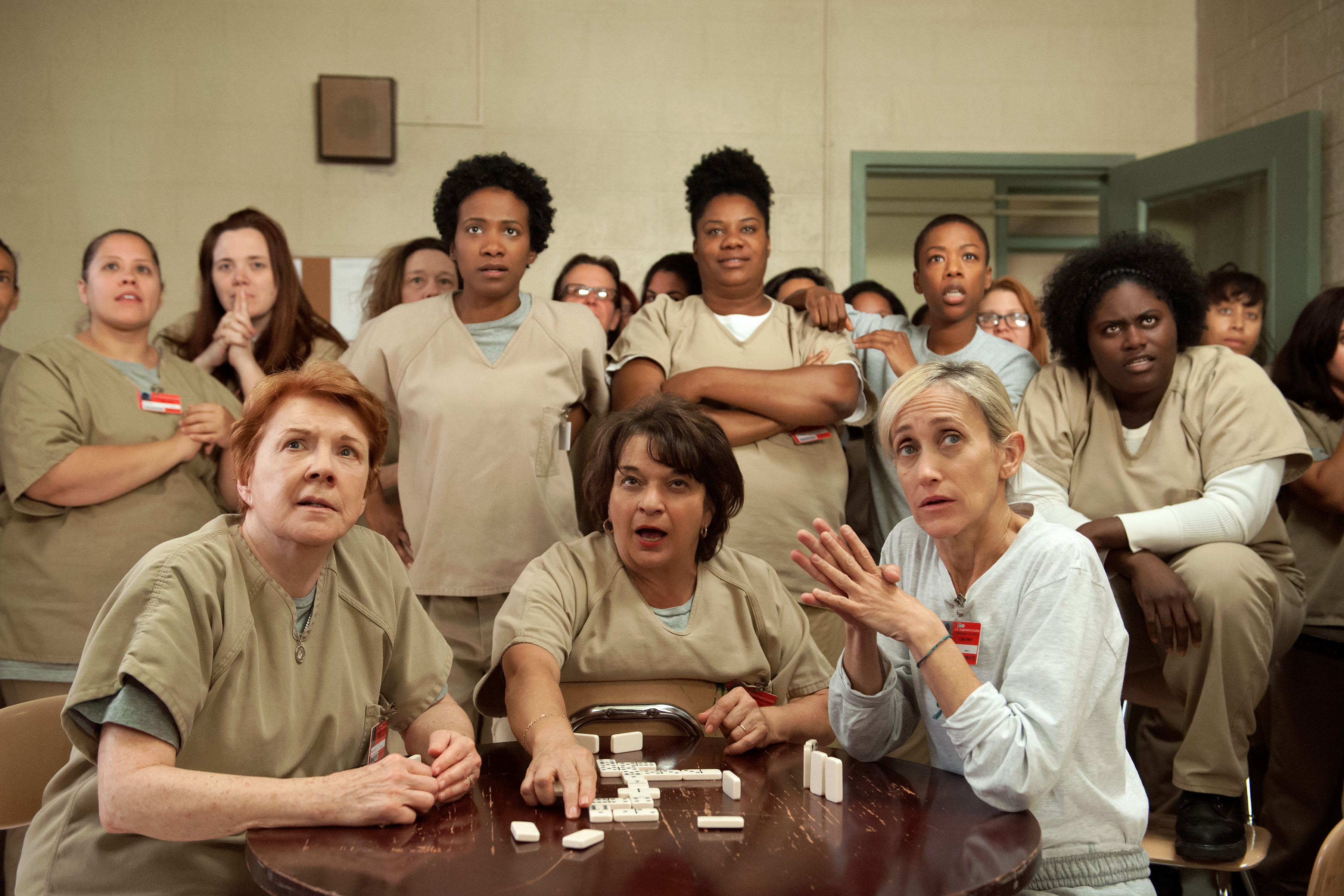
What are some standout storylines to you (in a good way)?
Valerie Anne: I’m an emotional masochist so I loved the angst of the Piper/Alex relationship. I like that they were both kind of shitty to each other but both extremely drawn to each other. I love that they hated each other but couldn’t keep their hands off each other. It was toxic and terrible and not something I would ever want it real life but gosh was it fun and sexy to watch.
Drew: I don’t even know how to begin answering this question. There are so many characters, so many seasons, so many storylines! I think as a result, I just think of long-term relationships, like Taystee and Poussey’s friendship which is pretty easily the highlight of the show as far as I’m concerned. Also Flaca and Maritza’s friendship! And Nicky and Red’s mother/daughter friendship! Not to take away from all the amazing lesbian sex, but there were so many beautiful platonic relationships between women on the show and I think those have stuck with me most.
Natalie: So, admittedly, I’m a little hamstrung by having not watched the show since Season Three but thinking back to what I did watch, I think the relationships really connected me to the show. Taystee and Poussey’s friendship really stands out because no matter the circumstances, queer girl falls in love with her straight best friend is #relatablecontent. I loved the fight between Aleida and Gloria in the second season over who could be the best mother to Daya.
But I think my favorite character arc was Suzanne “Crazy Eyes” Warren. That character could’ve gone wrong in about a thousand different ways but the writers threaded the needle so finely and Uzo Aduba just imbued the character with so much heart that she became impossible not to cheer for.
Carmen: I think it’s all the little moments, you know? The friendship between Taystee and Poussey will stay with me forever for all the reasons Natalie just highlighted. But also – Maritza and Flaca!! Daya and Aleida!! Red and Nicky!! Big Boo and Tiffany!! Orange is the New Black absolutely excelled at telling stories about how women related to each other, built each other up, have each other’s back, and yes, cause each other pain. Maybe that’s cliché, but not a lot of shows grasp those nuances and showcase our humanity. Even in its worst moments (and there have been a lot of worst moments) – Orange never stopped putting women at the center of its narrative.
Heather: I’m with all of you about Taystee and Poussey. One of my all-time favorite fictional friendships ever. That funeral for the books will live in my heart forever. I enjoyed Piper and Alex in the first season because I, too, am a sucker for that “Why do you feel so inevitable to me?” kind of gay angst. (I just hated Piper, and not in a good way, by season two so I had hard time rooting for her much after that.) Like Natalie, though, my favorite is Suzanne’s storyline through season three. It was a singular joy to watch Uzo Aduba breathe so much heartbreak and humanity and humor into that characters.
Riese: Yep, Taystee and Poussey’s friendship for sure! Poussey’s relationship with Soso. Anything involving Watson / Black Cindy / Poussey / Suzanne / Taystee’s friendship group. Sophia’s friendship with Sister Ingalls. Any time the women were actually allowed to do some version of “thriving” within the prison — Rogers’ theater class, Suzanne’s fan-fiction, Cindy and Flaca’s radio show with Flaca, Red’s garden, Sophia’s salon. I think Big Boo’s flashback episode was pretty incredible in terms of butch representation. Cindy’s conversion to Judaism was a HUGE one for me too.
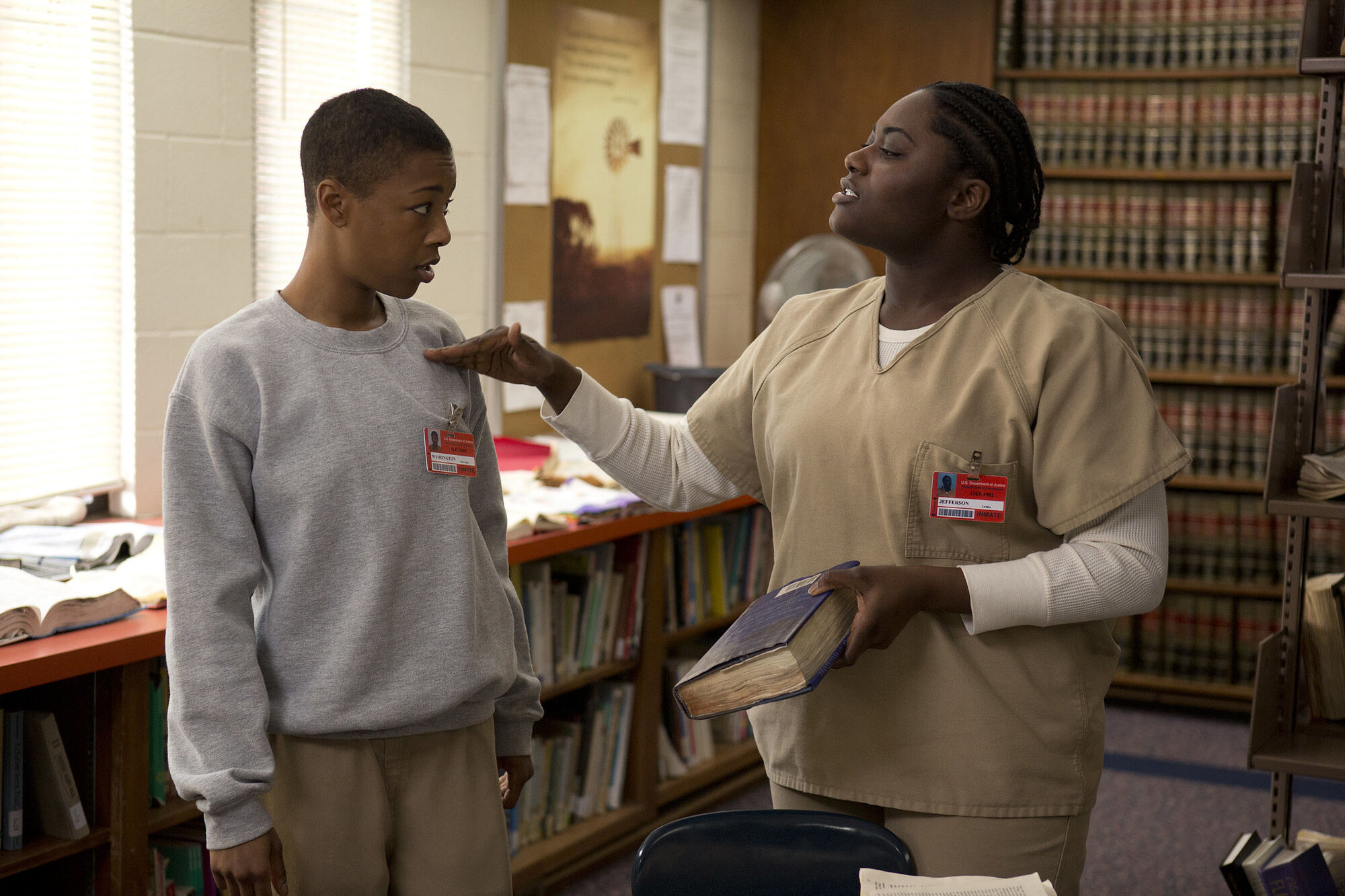
What do you hope TV creatives take away from OITNB, the stuff to do more of and the stuff to never do again?
Valerie Anne: I hope they never “preach to the choir” again. I hope they don’t try to teach their audiences lessons that their audience knows all too well. Tell our stories, but don’t networksplain our stories. Find that fine line and never, ever cross it. I hope the success of this shows gives more networks courage to green light stories that center around women – women of color, trans women, big women, all women – even if they’re not shiny and perfect. I hope it leads to more queer content nestled neatly into ensemble stories without being a Very Special Episode About Queerness.
Drew: I truly believe all the problems of Orange is the New Black could have been solved if their writers room reflected their characters. I’m all about hiring the best possible writers. But unlike Jenji Kohan, I don’t believe that means hiring the best writers I personally know or agents were quick to recommend. It’s not just about fixing mistakes. If a more inclusive writers room had existed, the actual moment by moment quality would have improved. It would have been more specific and specificity leads to better art.
Carmen: EVERYTHING THAT DREW SAID!! 🙌🏾 The glaring whiteness of OITNB’s writing room – and their stubborn, bull-headed refusal to fix it for so long – should be their most damning legay. That’s not a small point, and I hope that future writers and showrunners never make Jenji Kohan’s mistake again. If you’re commited to telling the stories of queer women, trans women, women of color – then those stories begin with the writers, not just the faces on the screen.
Natalie: Absolutely. It’s also interesting to juxtapose how the writers’ room was structured compared to how the show itself was structured… because there is such a dichotomy. So many of the actors on the show, particularly the actors of color, were new faces. Aside from random appearances in the Law & Order universe, most of these actors were unknowns. I didn’t know Uzo Aduba, Danielle Brooks, Dascha Polanco or Diane Guerrero before Orange but the show was so greatly enhanced by giving these actors an opportunity and letting them shine. I hope part of OINTB’s legacy is to push other creatives to seek out new talent, particularly in underrepresented communities, and give them a chance. The talent’s there.
I only wish that Orange had taken that same philosophy into the writers’ room.
Drew: I also think artists making work that’s political should really think about who they’re making their work for. Is the goal to teach privileged people a lesson and traumatize those you’re supposedly helping in the process? Is it worth it? Is it even most effective? I’ll fully admit that when I started watching Orange I only vaguely knew about the prison-industrial complex. Those first three seasons did inspire me to do more research. And that shows how powerful television can be even when it’s as flawed as Orange. But I question anyone who wasn’t moved to do this research until Poussey’s death. Anyone who required that level of grotesque tragedy to care about these issues was not worth winning over. I deeply believe that television should first and foremost be for the people the stories are about.
That said I think the show proves how interested people are in seeing stories about women, about people of color, about trans people, about people who are lower and middle class, about people who have had a full range of human experience. Because the vast majority of us fit into one or more of those categories.
Carmen: To that point, I also think that Orange is the New Black proved that you can let your actors be activists. I know I’ve spoken about her before, but I’m not just thinking about Laverne Cox’s advocacy for trans women at this moment. Diane Guerrero (Maritza) has been a vocal activist for the DREAM ACT and undocumented immigrants. Danielle Brooks became very vocal about body positivity. Uzo Aduba, Samira Wiley, Natasha Lyonne – all have used their mic to better serve communities that are otherwise left behind.
Riese: Once again as the last person to contribute to this roundtable, my points have already been made! As Drew said, “the problems of Orange is the New Black could have been solved if their writers room reflected their characters.” I was disappointed that in mainstream criticism, Poussey’s death was largely treated as a successful storyline when it ABSOLUTELY WAS NOT.
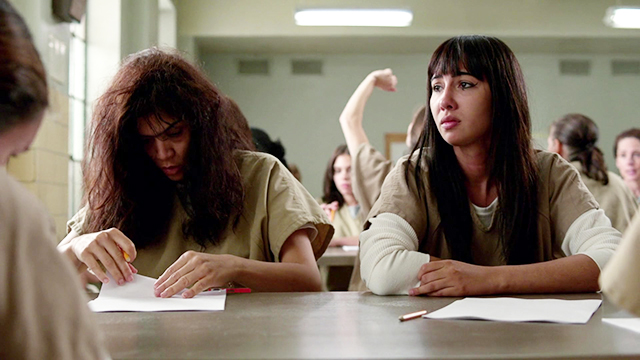
Make one prediction about one breakout star from the show.
Valerie Anne: I mean I think Samira Wiley is already becoming the queer icon we all deserve. As you may have guessed because all of my answers centered around Poussey, I think she’s very talented, and I think she can do great gay things in this world.
Drew: When the Emmy nominations came out a couple weeks ago, I met Laverne Cox’s third with a shrug. I was too distracted by the Pose snubs to realize how monumental it was that Cox getting a nomination feels… normal. It’s no longer a headline about a trans first. She’s just an actor being recognized for her work. I’m thrilled how many movies she’s going to be in over the next couple years and I know it’s just a matter of time until she moves from supporting to lead. We can roll our eyes at the “transgender tipping point” but it’s impossible to overstate Cox’s influence as a public figure. Now I sort of just want to see her be an actor. Because she’s a really, really great one.
I also predict that I will continue to have crushes on basically the whole cast.
Carmen: Hahahaha. Big Same! ( I hope that Samira Wiley and Laverne Cox know they’re never getting rid of me now. It’s far too late.)
Natalie: This is a tough question because, honestly, it could be any of these women. There was just so much talent in this cast. I will say, though, that if, ten years from now, Uzo Aduba isn’t ¾ of the way to an EGOT, I’d be shocked. It’s hard to believe that, just before she got the call for Orange, she was ready to walk away from acting entirely. She is brilliant and with OITNB now behind her, I can’t wait to see what she does next.
Heather: Maybe I can manifest this: Samira Wiley headlines a TV series that deserves her and it brings home a wheelbarrow full of trophies.
Carmen: Yeah, I think it’s too hard to predict a “breakout” because they’ve all already become breakouts. So many women of color who maybe wouldn’t have otherwise gotten a chance now have the world as their oyster. When you start running down the show’s large cast – it boggles the mind. On some level, I still can’t believe we were all here to witness it.
No but seriously, I predict that we will all be here again in ten years when they reboot this show. That’s the one thing I can count on.
27 Summer 2019 TV Shows For Queers To Watch Out For
Summer TV is upon us; here are 27 queer shows to watch out for!
Vida (Season Two)
May 23rd, Starz
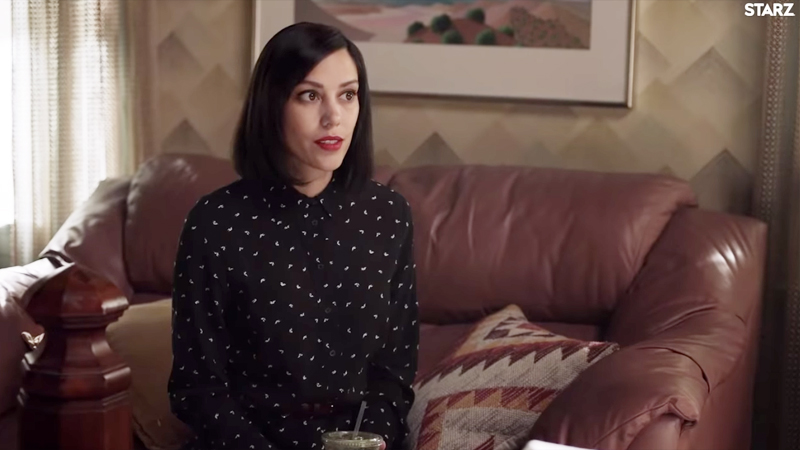
The most important tenets of Vida‘s phenomenal first season remain the same — Tanya Saracho has no interest in answering questions easily. She doesn’t want queerness that can be explained away by Merriam-Webster or a college Gender Studies 101 class. She has no use for gentrification that can be reduced into a simple “us vs them” narrative. What would even be the point of sisters who love each other without baggage? Vida is messy, perhaps even more so than it was in Season One, if that’s possible. — Carmen
She’s Gotta Have It (Season Two)
May 24th, Netflix
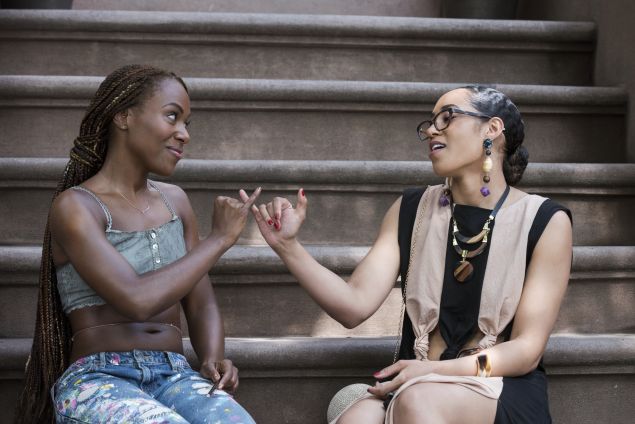
SHE’S GOTTA HAVE IT
What’s merciful about Season Two of She’s Gotta Have It is that, for once, Spike Lee loosens his grip just enough to let a black woman character speak for herself. She’s given wide space to selfishly explore her own desires and responsibilities on no one’s terms but her own. This iteration of Nola Darling is finally, and sublimely, allowed to step into the light of summer. — Carmen
State of Pride (Documentary)
May 29th, YouTube
The filmmakers behind this incredible documentary traveled to Salt Lake City, San Francisco and Tuscaloosa, Alabama, to interview a diverse group of LGBTQ people and obtain “an unflinching look at LGBTQ Pride, from the perspective of a younger generation for whom it still has personal urgency.”
When They See Us
May 31st, Netflix
https://youtu.be/u3F9n_smGWY
Ava DuVernay’s four part miniseries chronicles the harrowing story of the Central Park Five: five young men arrested, tried and convicted — first in the media, then in the court system — for a crime that they did not commit. Among the critically acclaimed cast is Isis King who plays Marci Wise, the trans sister of Korey Wise, the eldest of the Central Park Five. — Natalie
Burden of Truth (Season Two)
June 2nd, The CW
The Canadian import, Burden of Truth spent its first season focused on the poisoning of a group of girls by the local steel mill and the legal effort to win restitution. By the season’s end, the case had been won and the show’s adorable baby gays, Molly and Luna, were off to get their first glimpse of the Pacific Ocean (with $2M in Molly’s pocket). It seemed like a tidy ending but, apparently the CBC/CW can’t get enough of Kristin Kreuk, so we’re in for an exciting second season. This time, Kreuk’s Joanna is up against a tech giant who’s using a former employee’s coding for weaponry…but later she gets roped into a case that could change Luna’s life forever. — Natalie
The Handmaid’s Tale (Season Three)
June 5th, Hulu
https://www.youtube.com/watch?v=RcTvQx1Wot0
Season Three of this dark masterpiece will see June become increasingly radicalized while grappling for potential allies — or enemies — in her immediate landscape. Serena Joy? Commander Lawrence? Who can say! Oh and FYI, Aunt Lydia survived the knife attack, Samira Wiley will be back, and I’d like to pre-emptively assume June and Serena Joy will again win the Series Sexual Tension Award. — Riese
grown-ish (Season 2B)
June 5th, Freeform
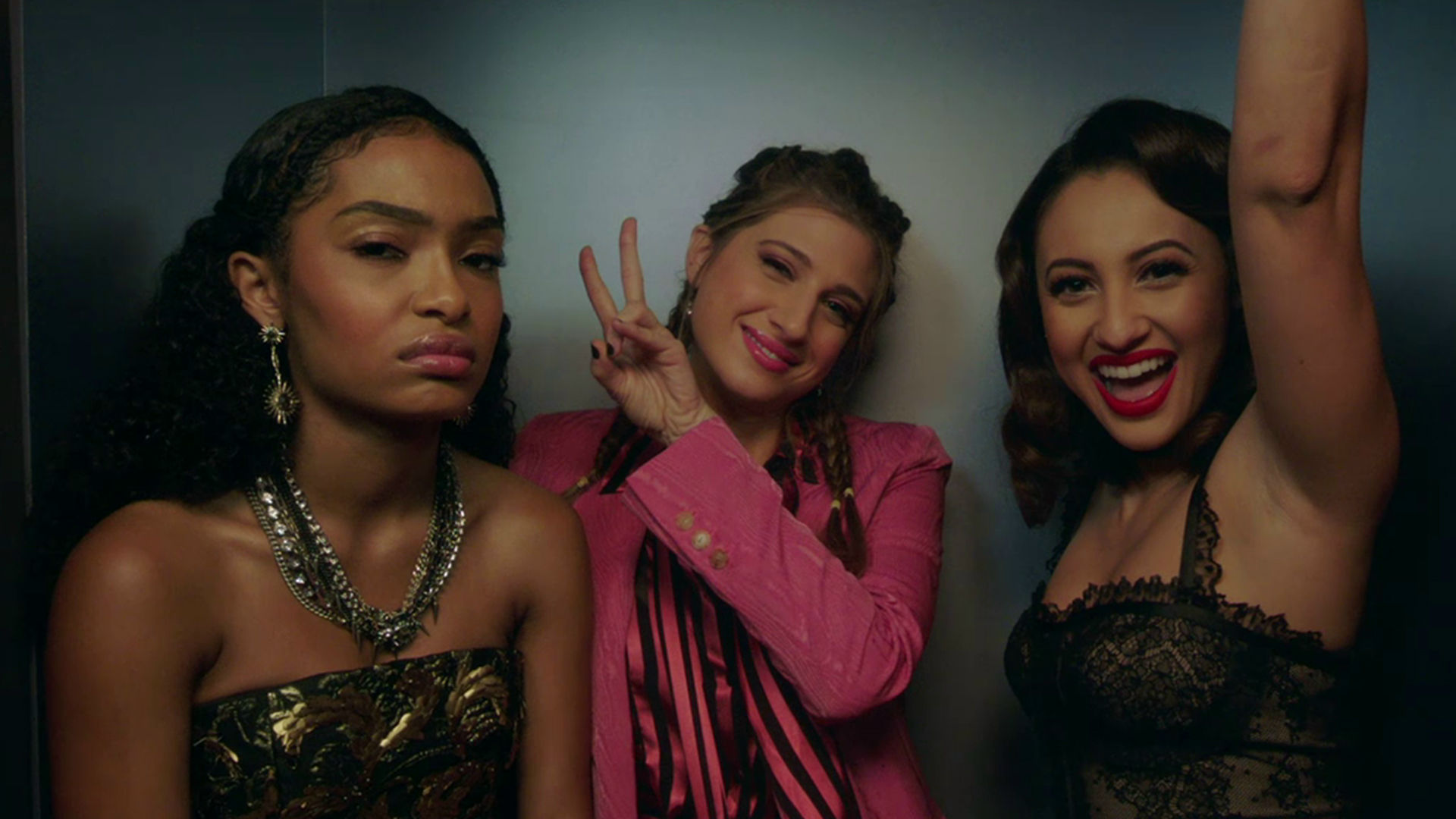
We were already all in on this pitch-perfect half-hour of socially conscious television that never takes itself too seriously before they brought back Shane as a Women’s Studies teacher, but now that Naomi’s not her student anymore, the back half of Season Two will be particularly enticing to a very specific subset of the queer community. — Riese
Armistead Maupin’s Tales of the City (Season One)
June 7th, Netflix
https://www.youtube.com/watch?v=R63GxIGAaZw
Forty years ago, Armistead Maupin began writing Tales of the City as serialized short stories in the San Francisco Chronicle and the San Francisco Examiner. Ultimately, those stories became nine books, the first few of which PBS and Showtime adapted into a TV miniseries starring Laura Linney and Olympia Dukakis in the ’90s. This year, Netflix is launching a sequel helmed by Orange Is the New Black‘s Lauren Morelli and starring Ellen Page as Linney’s character’s daughter. The entire thing is gayer than a Pride parade. There are lesbians and bisexuals and gay men and trans people and non-binary people and drag queens and queer poly couples and an entire flashback episode starring Jen Richards and Daniela Vega. The writers’ room was also 100% queer. Look for a full review, an interview with Lauren Morelli, and a big roundtable with intersecting queer identities discussing the series right here on Autostraddle dot com. — Heather
XY Chelsea (Documentary)
June 7th, Showtime
https://www.youtube.com/watch?v=TBHkiNRIp9M
Shot over two years and featuring exclusive interviews and behind-the-scenes verité with Chelsea Manning, XY Chelsea tells the story of the whistle-blower starting from her release from prison in May 2017, exploring her position on national security and trans rights and visibility.
Claws (Season Three)
June 9th, TNT
https://www.youtube.com/watch?v=5gFpqT7cumM
Sometimes the silence just gets to be too much. Such was the case for Quiet Ann in Season 2 of Claws. After one setback after another, Quiet Ann finally spoke up: creating friction at first but, ultimately, forging a deeper connection with women she calls her crew. Now, with their issues resolved, Ann and the ladies of Nail Artisans of Manatee County are moving on up. Thanks to Desna’s short-lived marriage and the “untimely” death of their Russian mob boss, Ann and the girls are taking over: running the salon, the pill mill and a brand new casino. With a chance to “level up” finally within their grasp, can Ann finally find the happiness — and the girlfriend — that she’s dreamt of for so long? — Natalie
Big Little Lies (Season Two)
June 9th, HBO
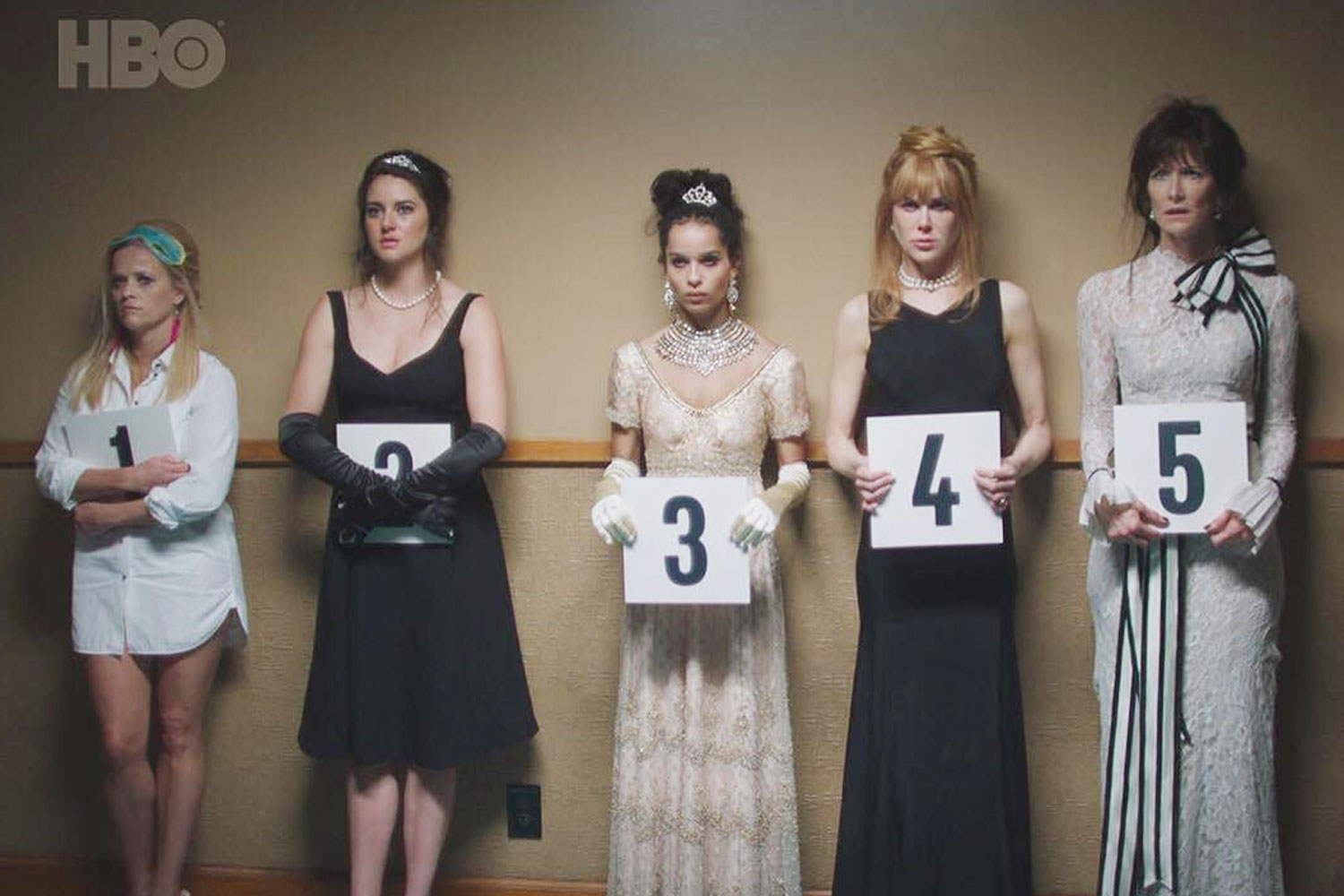
Despite its frustrating inability to deliver even the subtle lesbian action we deserve from this ensemble, Mommi lovers are unable to resist the siren songs sung from these Monterrey shores. Season Two sees the return of the entire main cast for a deft exploration of the aftermath of trauma and will introduce Perry’s grieving mother, played by Meryl Streep, searching for answers to who killed her shitbag son. A woman is taking the helm this season — Andrea Arnold, whose prior work includes I Love Dick, Transparent, and Sasha Lane’s debut film American Honey — will direct all seven episodes. The season promises to explore “the malignancy of lies, the durability of friendships, the fragility of marriage and of course, the vicious ferocity of sound parenting.”
Pose (Season Two)
June 11th, FX
https://www.youtube.com/watch?time_continue=30&v=JPujB1Mi8yc
Season Two time-jumps to 1990, at the peak of the AIDS crisis, on the day Madonna’s single “vogue” was released, thus putting the ballroom scene in the spotlight. Bisexual comedian Sandra Bernhard returns as a nurse, and activist groups like ACT UP will show up. Pose radiates, breaking ground with every stylized walk on top of it, wrapping universal messages about chosen family and community into stories never before told on such a prominent platform.
Queen Sugar (Season Four)
June 12th, OWN
Because we remember that Nova Bordelon is supposed to be pansexual even if the show’s forgotten. #GiveNovaAGirlfriend2k19 — Natalie
Younger (Season Six)
June 12th, TV Land
Last year, Viacom Media announced that Younger would be moving from its original home on TV Land to its sibling Paramount Network but then — presumably after realizing that Heather’s definitely not the only person that watches this show — TV Land opted to keep the show for its sixth season. The show will have a new feel now that Hilary Duff’s in charge of everything and Charles and Liza are trying to make their relationship work. The important news, though? Maggie’s getting a girlfriend! Evie Roy Nicole Ari Parker is joining Younger to play Maggie’s love interest in a multi-episode arc. — Natalie
Trinkets (Season One)
June 14, Netflix
https://youtu.be/xz1IkeXs6yI
Based on the young adult novel by Kirsten Smith, Trinkets is the story of three teenage girls who’d probably never interact with each other but for the Shoplifter’s Anonymous meetings they’re all forced to attend. According to Netflix: “Elodie — the grieving misfit, Moe — the mysterious outsider, and Tabitha — the imperfect picture of perfection, will find strength in each other as they negotiate family issues, high school drama and the complicated dilemma of trying to fit in while longing to break out.”
Aside from the intriguing premise, there are two other things that might make it relevant to your interests: 1. queer characters (!!) and 2. queer characters played by actual queer actresses (Brianna Hildebrand and Kat Cunningham, respectively). — Natalie
Marvel’s Jessica Jones (Season Three)
June 14th, Netflix
The debut of the third season of Jessica Jones marks the end of the Marvel era with Netflix. Unlike the other MCU shows though, whose cancellations came abruptly after their new seasons debuted, Jessica Jones will get the send-off our raven-haired hero deserves. Before she can say good-bye, though, there’s still work to be done: she and her former BFF, Trish Walker, will have to put aside their grievances — recall, Trish killed Jessica’s mom last season — to work together and take down a “highly intelligent psychopath.”
After recklessly grappling with her ALS diagnosis last season (and getting burned in the process), Jeri Hogarth is trying to get her swagger back. She’s opened up her own law firm and put Pryce and Malcolm on her payroll. If history’s any guide, Jeri’s definitely going to be stirring some shit up. — Natalie
Euphoria (NEW)
June 16th, HBO
https://www.youtube.com/watch?v=vuAzkZIiGxI
Trans model Hunter Schafer plays a trans character in this Skins-esque remake of the Israeli original, starring Zendaya in a trippy sex-drugs-and-adolescence drama. In an interview with Dazed Digital, Hunter said that despite being skeptical of a white cis male showrunner considering the material, “a lot happened in those first four episodes that I, as a transfeminine person and a queer person, really identify with.” — Riese
The Good Fight (Season One on Broadcast)
June 16th, CBS
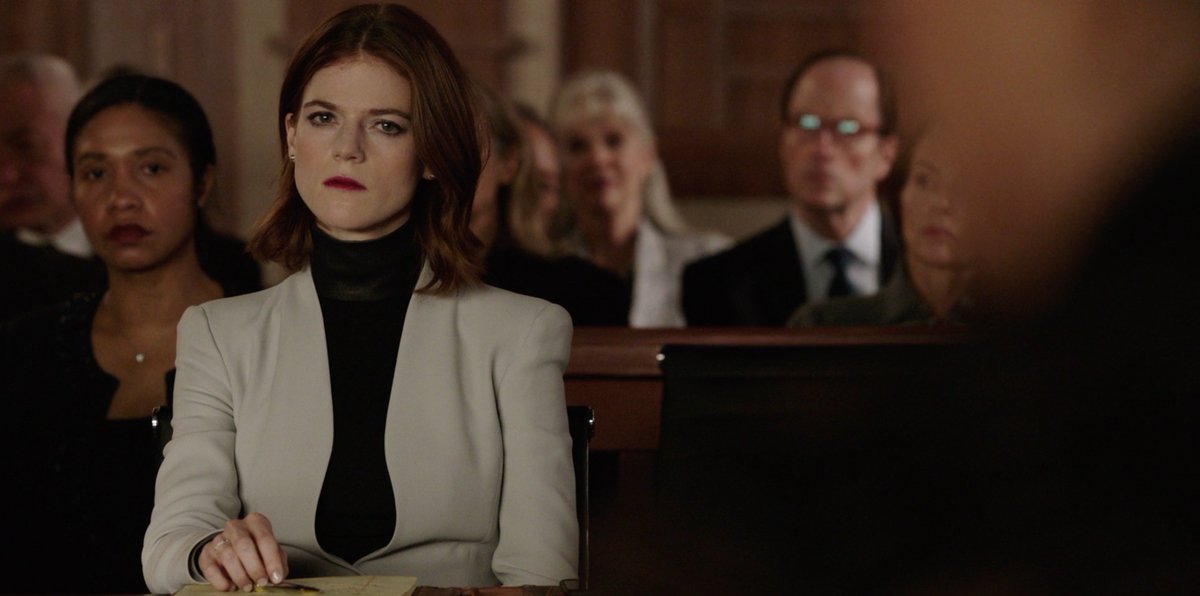
In a recent column, Michelle Goldberg called The Good Fight “the only TV show that reflects what life under Trump feels like for many of us who abhor him.” Unfortunately, because the show’s restricted to the network’s subscription service, “many of us who abhor him” haven’t been able to watch the show, but this summer, The Good Fight is coming to broadcast television. CBS will air the first season and everyone can enjoy the best show of the resistance. And as a bonus, we’ve got Dorothy Snarker recaps from season one to supplement your viewing. — Natalie
Good Trouble (Season Two)
June 18th, Freeform
We tuned into Good Trouble back in January to watch the Adams-Foster sisters start their professional lives but it didn’t take long before we got wrapped in all the drama of the “intentional living space” that they now call home. When the show returns for its second season, Mariana’s balancing a new relationship and a new dynamic at work, Davia’s balancing old desires with new interests, Callie and Malika are awaiting the outcome of the Jamal Thompson case and Alice is grappling with her new reality as an out gay woman. And maybe, if we’re lucky, we’ll get another visit from the Mamas too. — Natalie
The Lavender Scare (Documentary)
June 18th, PBS
https://www.youtube.com/watch?v=o8RPs-xrjks
The little-known story of the unrelenting campaign by the general government to identify and fire people who seemed possibly gay, narrated by Glen Close and featuring the voices of noted homosexuals Cynthia Nixon, Zachary Quinto, T.R. Knight and David Hyde Pierce.
Harlots (Season Three)
July 10th, Hulu
Charlotte Wells is forced to take over the brothel in her mother’s absence while Lydia Quigley rots in jail and some new entrepreneurs in town angle to open up a “Molly House” in her prior evirons. Season Two got much gayer than Season One, and you can expect Season Three to do the same for racial diversity. Harlots reliably reveals the soft underbelly of what is often a very difficult life: the respite of chosen family and the intensity of those bonds, more genuinely rewarding and life-sustaining than those that unite sin-soaked, supremacist brotherhoods. — Riese
Siren (Season Two)
July 11th, Freeform
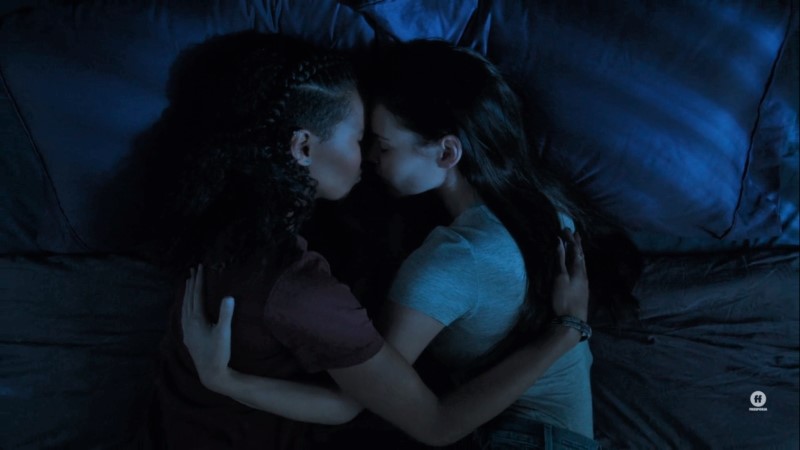
The second half of Siren‘s second season picks up where the first half left off: the mermaids have returned to the sea, while Ben and Maddie are left on land to face the consequences of the attack on the oil rig. On top of that, Ben and Maddie are melancholy without Ryn, the missing third of their throuple. Thankfully Ryn returns back to land to follow through on an agreement she made with the military so Valerie’s #hornyformermaids campaign can continue, unabated. — Natalie
Sweetbitter (Season Two)
July 14th, Starz
Adapted from the bestselling novel from Stephanie Danler, Sweetbitter is a look at the 2006 New York culinary scene through the eyes of an ingénue named Tess…who definitely gives off season one of The L Word Jenny Schetcher vibes, right down to the black trash bags she carries into her Willamsburg apartment. Working at Sweetbitter, Tess meets Ari who, if we’re keeping the L Word parallels going, is a mix of Shane, Carmen with a dash of Marina; in other words, she’s a no-nonsense server at Sweetbitter by day and an adventurous lesbian DJ by night. According to Ari’s portrayer, Eden Epstein, the second season will delve more into Ari’s sex life. The second season will also add a bit more queer to the cast: as the imitable Sandra Bernhard joins the cast this summer as Maddie Glover, the owner of Sweetbitter, who once ran things in the kitchen before stepping away to launch a global food empire. — Natalie
Light as a Feather (Season Two)
July 26th, Hulu
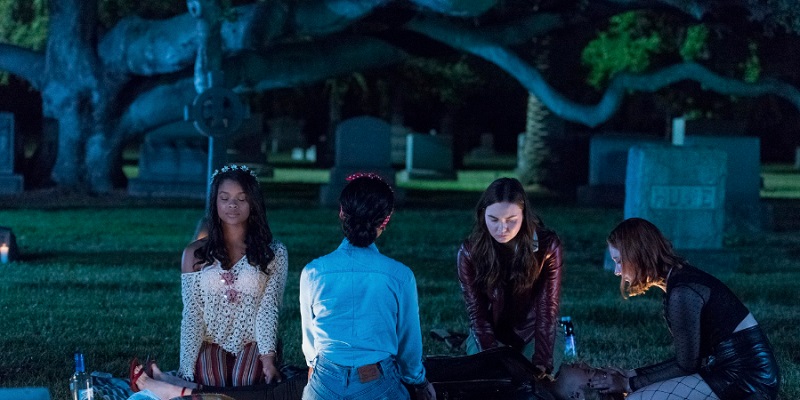
When it debuted, Light as a Feather seemed perfectly timed: the series, which Valerie described as Pretty Little Liars-esque, with a touch of The Craft and Final Destination, dropped right in the middle of October…the exact time of year, audiences are craving spooky fair. So I’m not sure what it says about Light as a Feather‘s second season that its debuting in July instead; have we traded in scary for heat?
Details are scant on season 2, thus far, particularly as it relates to the show’s lesbian character Alex Portnoy, but we do know that McKenna’s inherited the curse brought on by the titular game. The chrysalis on her back attempts to lure her back to the game but McKenna refuses until the situation becomes untenable. — Natalie
Orange is the New Black (Season Seven)
July 26th, Netflix
Orange takes its final bow this summer. So far all we’ve got is a lil clip of many beloved characters singing the theme song in their head voices — but from that alone, it seems Flaca and Maritza could be returning. At Season Six’s end, Taystee took the fall for a murder she didn’t commit and Piper found herself granted early release, directly after marrying Alex. It’ll be a doozy, but I know I’ll be glued to my television the whole damn weekend. — Riese
She-Ra and the Princesses of Power (Season Three)
August 2nd, Netflix
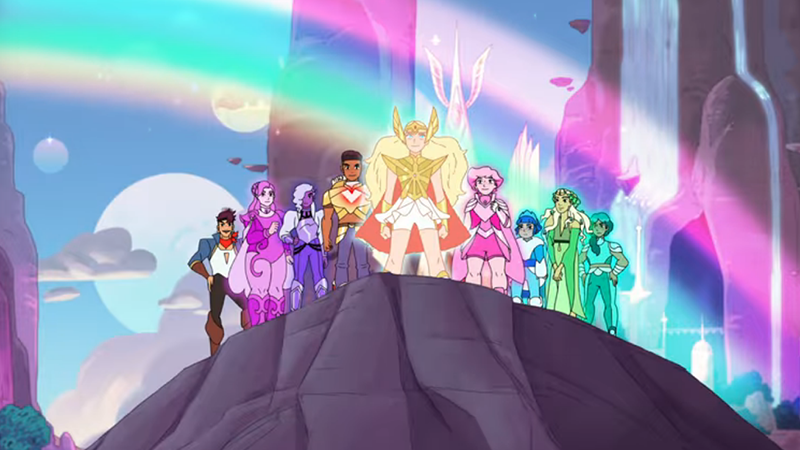
When season two of She-Ra landed on Netflix, Heather noted, “there’s less implicit queerness than season one. But also: There’s more explicit queerness than season one. Way more!” So if the trend holds, the show’s third season will be extra gay. Fingers crossed!
One thing we do know about She-Ra‘s third season: it’ll feature the debut of Huntara, the Salaxian bounty hunter from the original series. In the Netflix version of She-Ra, Huntara’s the leader of the Crimson Waste who’s reluctant to help Adora, Glimmer, and Bow on a quest. And, if that wasn’t cool enough: Huntara’s being voiced by Oscar winner, Geena Davis. — Natalie
G.L.O.W (Season Three)
August 9th, Netflix
https://youtu.be/xQaCxIJX0J0
The Gorgeous Ladies of Wrestling are back for their third season and now they’re headliners at the Fan-Tan Hotel and Casino in Las Vegas. Everyone soon realizes that everything that glitters ain’t gold…and their residency in Sin City turns out to be more complicated than they anticipated. The Netflix logline also says that in season three “the cast find themselves struggling with their own identities both in and outside of the ring,” which sounds suspiciously like the tropes that Riese warned about in her season two conversation with Heather. Can’t Arthie and Yolanda be happy for a while? — Natalie
Other dates that might be relevant to your interests:
June 5: Black Mirror
June 7: FIFA Women’s World Cup (FOX)
June 8: The Tony Awards (CBS)
June 18: Ackley Bridge (Channel 4) – trailer
June 24: Years and Years (HBO) – trailer
July 4: Legion (FX)
July 17: Pearson (USA)
July 19: Killjoys (SyFy) – trailer
July 26: Veronica Mars (Hulu) – trailer
Pop Culture Fix: That’s a Wrap on “Orange Is the New Black” and Other New Beginnings
This is your weekly Pop Culture Fix, the very best place to hide from Twitter.
+ Orange is the New Black has wrapped production, and Jenji Kohan and the cast are saying goodbye.
+ Brie Larson believes Carol and Maria are the “great love” of Captain Marvel. 👀
+ IndieWire’s 100 greatest films directed by women includes loads of queer and trans women, including Chantal Akerman, Lilly and Lana Wachowski, Lisa Cholodenko, Dee Rees, Desiree Akhavan, Zora Neale Hurston, and Jennie Livingston.
+ We’ve been telling you Shane’s about Shane it up on grown-ish and now you can see for yourself. Here’s a clip from tonight’s episode.
sneak peek: 👀 #grownish pic.twitter.com/aUdtG7XzIK
— grown-ish (@grownish) February 26, 2019
+ Janet Mock is featured on Beyoncé’s website as part of the We Good series!
+ Praise the heavens: Batman will not show up on Batwoman.
+ YouTube start Lilly Singh has officially come out as bisexual.
+ I love this: Disney Princess careers, based on their characters.
+ The past a future of women’s orgasms on-screen.
+ Ellen Page has penned a new op-ed at The Hollywood Reporter: “Hate Violence Is Not a Hoax”
+ Vanity Fair’s post-Oscars portrait studio is up and it’s oh so lovely.
+ Diane Keaton, Jacki Weaver, and Pam Grier are here with a T-R-A-I-L-E-R for Poms.
+ Over at The A.V. Club: Russian Doll, Maniac, The Good Place, and how helping others is also helping yourself
Latinx Butches Lit Up Television in 2018
As Autostraddle’s TV Team started to gather up statistics and critic’s opinions for our 2018 End of The Year posts, I realized a trend that I didn’t want us to lose track of: across almost every platform, some of the best and most beloved performances of the year came from queer Latinx characters. In particular, butch or masculine-of-center Latinxs were finally stepping into the TV spotlight. This isn’t a small blip. Before summer 2017 there had only been three Latinx butches in all of television history. In the last 18 months alone, that number has more than doubled to eight! They are being found everywhere from prestige dramas and critical darlings like The Deuce or Vida, to summer cult favorites like Claws, or Sunday evening comfort television like Madam Secretary.
I became curious about what new trends were popping up with these characters. What could we gleam or learn from their representation on television? That interest lead me to creating this – a brief, but hopefully satisfying, deep dive into the ways that gender, sexuality, and race have been playing out on television screens. Our Editor-in-Chief Riese is currently hard at work writing Autostraddle’s annual big, overarching end of the year analysis about queer women on television. Please consider what you’re reading a supplementary introduction.
(For a while I considered titling this article “Latinx Butches 2018: Welcome To The Thirst Trap,” but that didn’t seem very professional, you know?)
Nuestras Raíces: We Can’t Get Anywhere Without Knowing Where We Come From
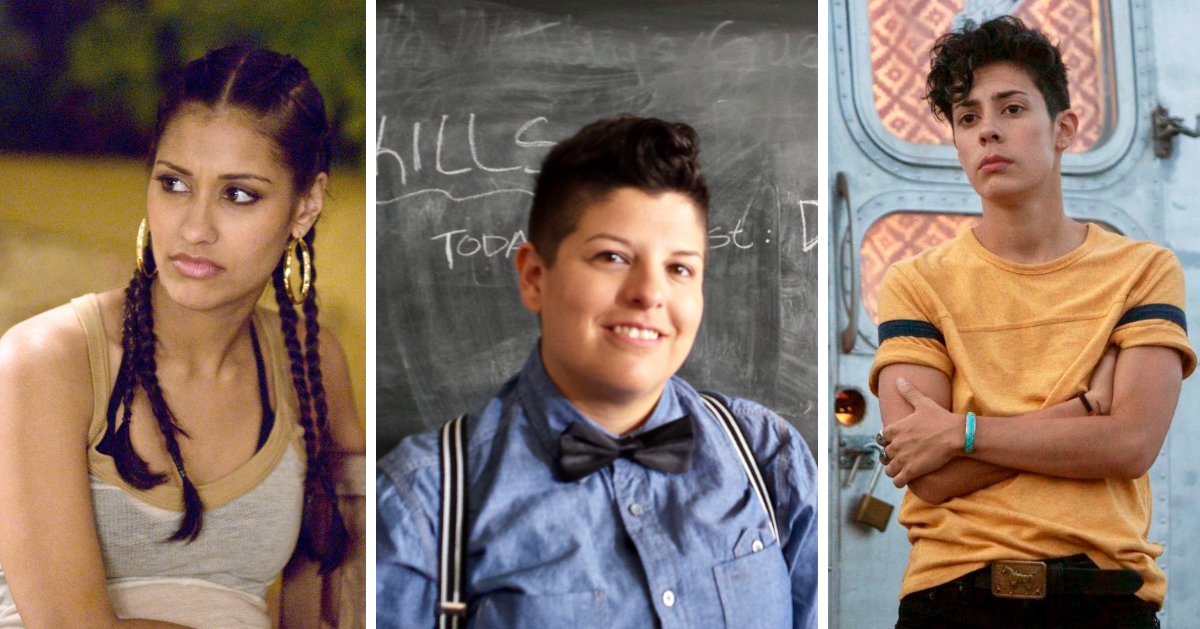
As I mentioned, according to Autostraddle’s research, before summer 2017 there had been just three Latinx Butches on Television: The L Word’s Eva “Papí” Torres (Janina Gavankar), East Los High’s Daysi Cantu (Ser Anzoategui), and I Love Dick‘s Devon (Roberta Colindrez).
Probably in no small part due to the The L Word’s indelible effect on generations of queer women, Papí has become an iconic character in her own right, despite airing as a reoccurring character for less than a single season. After all, she’s slept with more women that Shane! However, her history is not without complications. In many ways, Papí is a poorly drawn caricature based in the centuries old “Latin Lover” stereotype designed by white storytellers to exoticize, sexualize and ultimately belittle Latinx people.
To add insult to injury, Janina Gavankar – the actress playing Papí – wasn’t even Latina. To quote Autostraddle’s former Senior Editor Yvonne Marquez, L Word showrunner “Ilene fucking Chaiken could not find [any] Latinas to be in her show. If you’re filming a show based on a group of lesbians who live in LA — which half of its population is Latino — there is absolutely no excuse not to incorporate Latinas into the show!” I couldn’t have said it better myself. This doesn’t even get into the badly portrayed aspects of Chola culture written into Papí’s character, all of which read more like an offensive Halloween costume than any genuine form of authenticity.
It was seven years before another Latinx masculine-of-center character found their way to television, Daysi Cantu in Hulu’s East Los High. A welcome respite and breath of fresh air! Written, produced by, and starring Latinxs, Remezcla called the little known East Los High “a vanguard show when it comes to Latino representation.” Teen pregnancy, domestic violence, peer pressure, immigration – they really went there. Unfortunately, even though they were on a show that was a stand out in its class, Daysi was not used to their full potential on-screen. Beyond a brief flirtation with Jocelyn Reyes, the show’s other resident lesbian, Daysi was never given a full backstory or centrally incorporated into the cast. However, Daysi remains the only “teen character” on this list, helping to combat the starved representation for queer Latinx youth.
Daysi’s appearance on television overlapped with I Love Dick’s Devon. Riese described Devon as “a dreamy romantic, a dedicated artist with a compelling backstory and a unique perspective on the world. Also, she takes her shirt off a lot and I love her.” Unlike Papí, Devon’s sexuality was purposeful and delightfully subversive, as opposed to a punch line. They were also crafted by Roberta Colindrez as non-binary: Colindrez referred to Devon with “she” and “they” pronouns interchangeably.
Devon served as the necessary bridge in the history of butch Latinxs on TV. I Love Dick premiered just five weeks before Claws gave viewing audiences Quiet Ann and just five months before Madam Secretary premiered Kat Sandoval. While Devon was a well-fleshed out character, they were ultimately still a character conceived and written by white people (Transparent’s Jill Solloway produced the show). Really, Devon’s biggest problem was that we don’t get enough of them! The character didn’t remain central throughout the series’ eight episodes.
Recognizing the very real risk of oversimplifying, this is the starting block of our history: stereotyped, sidelined, or marginalized! Not great!
It’s noteworthy that Ser Anzoategui and Roberta Colindrez, both talented queer actors, each found second roles continuing to play Latinx masculine-of-center characters in the “new class” listed below.
What’s Changing
There’s a lot of new energy afoot in queer Latinx television over the last two years, even more so when it comes to butch representation. I don’t want to paint an overly optimistic picture, because let’s be real with each other – an increase from 10 to 23 Latinx television characters (or 16 to 24 butches) isn’t ideal. The trend is on the right track; the raw numbers themselves unfortunately leave a lot to be desired.
According to our database, this year there were 226 regular or reoccurring lesbian, bisexual, pansexual or queer women characters on English-language television accessible in the United States. There were an additional five non-binary or gender fluid characters, bringing the grand total to 231. Out of those numbers, only 23 characters were Latinx (including two straight Latina trans women characters, Blanca and Angel Evangelista, on F/X’s Pose). These characters are overwhelmingly represented on cable or streaming platforms, as opposed to broadcast network television, which further limits their access and audience. Latinxs are the largest people of color population in the United States, but our representation on television barely reflects a sliver of that reality.
Still, the amount of butch Latinx representation on television has more than doubled in just the last 18 months and the year-to-year increase of queer Latinxs on TV jumped an enormous 130%! Granted, it’s easy to make such large gains when you are starting with low numbers to begin with. It’s also about more than the numbers; the quality and depth of representation in the last few years is unparalleled. Just taking a quick look at Autostraddle’s team of lesbian, bisexual and queer television critics – despite their comparatively small size in number, queer Latinx characters topped our Best Episodes, Best Television Shows, and Best Characters lists by a significant margin in 2018 (including multiple rankings in the top 10 for both episodes and television shows). They also made up 8 out of the 18 of the winners in our critics’ (and fan-based) Gay Emmys, that’s roughly 45% of all winners! These highlighted examples point to the evocative, thought-provoking, and resonant writing and performances for queer Latinxs on TV. I’m going to talk more about that in a little bit.
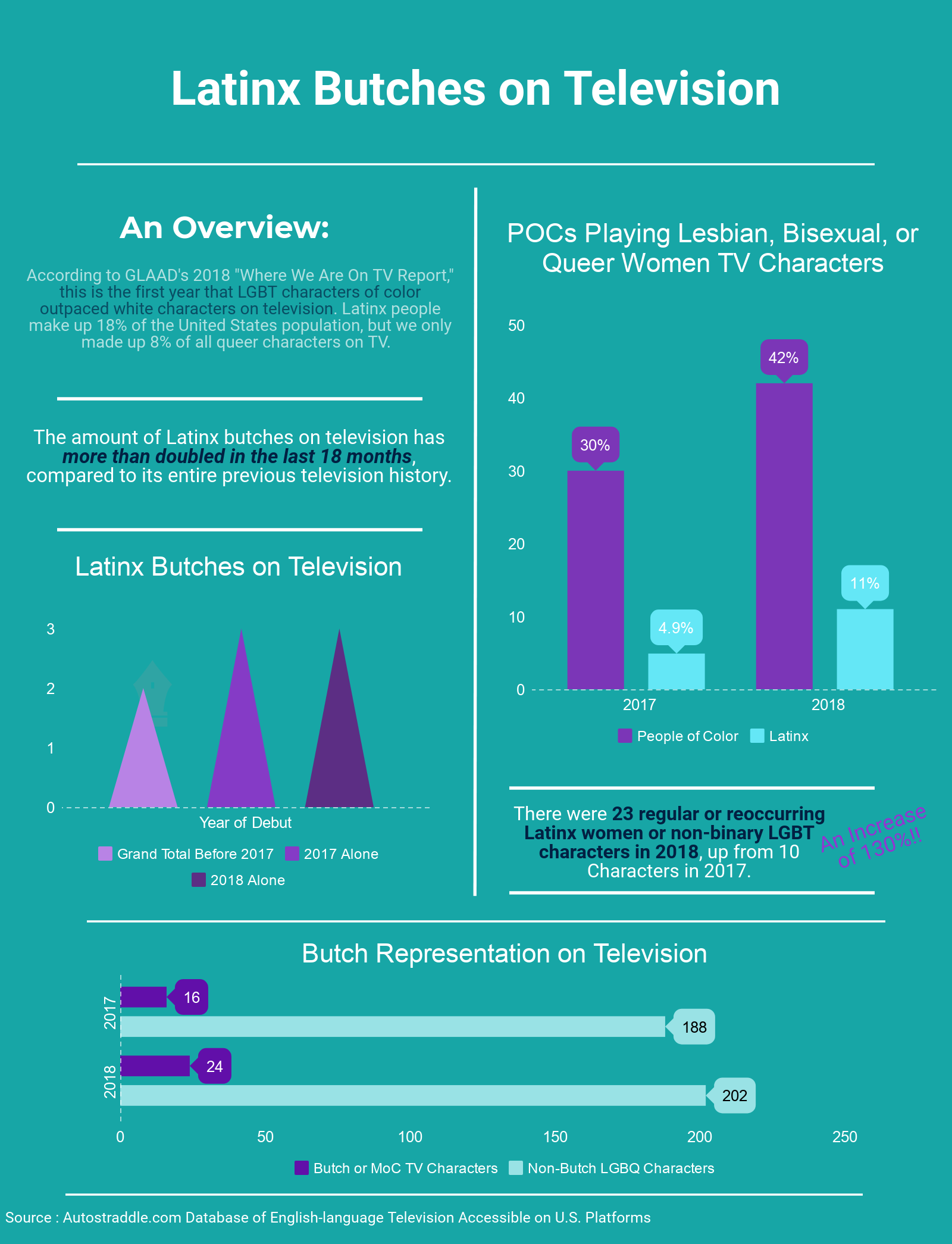
A full size of the infographic can be found here.
A New Day
The quality of stories currently being given to butch Latinxs is unlike anything that’s come before. They’re brimming with richness and intricacy. Actors are not being asked to play a one note character who is never seen again. Each is internal to their show’s respective plots and/or given significant screen time. The majority of them are being conceived by — or at least in consultation with — queer Latinx people. While we are zeroing in on Latinx butches for the purpose of this short study, the quality of representation has risen across the board for LGBT Latinxs on television over the last two years — ranging from Brooklyn 99′s Rosa Diaz, to One Day at a Time’s Elena Alvarez, to Angel Evangelista on Pose.
Latinx butches are no longer being forced into a narrow and thinly veiled “Latin Lothario” trope. Though Orange is the New Black’s Daddy uses her sexuality for manipulation, even she is not without pathos. Daddy, along with Claws’ Quiet Ann, has a history of crime. Meanwhile Daddy and The Deuce’s Irene are both involved in the sex work industry. This tracks with Autostraddle’s previous findings that butches on television are more likely to be involved in either illegal activities or criminal justice than other queer women on television. While there’s an obviously uncomfortable (to put it mildly) association being created on TV by correlating gender non-conformity or “butchness” with criminality, this trend is especially troubling for Latinxs. In 2017,The Hollywood Reporter found that half of all Latinxs and Latinx immigrants on television were portrayed as criminals. It nearly goes without saying, but this type of fear mongering in American storytelling has harmful real life consequences.
Madam Secretary’s Kat Sandoval bucks these trends as a highly educated White House policy official. She exists in the upper echelons of U.S. government in ways that we have yet to see reflected in our real life en masse. Vida’s Eddy is a local business owner and community leader. She’s an empathetic soft soul like so many butches that we personally know and love.
This is not meant to simplify Latinx butch stories into categories of “good” or “bad” representation; very few of these characters are that clear cut or easy. What makes this new class so effective is that, taken collectively, they largely eschew the didactic and instead push for three-dimensional storytelling. Every one of them is allowed space to be vulnerable, experience sensitivity or fear or doubt, to display their humanity. We get to know their families and learn their histories. Adding to that intimacy, four out of the five of these characters are played by out queer Latinx actors. There’s a danger that being masculine-of-center in Hollywood might result in typecasting, especially for folks of color, but these actors are mining their own experiences to add much needed layers to the characters their portraying.
Perhaps the greatest feat is that none of these characters exist in a vacuum or by themselves. By belonging to a cohort of five, no single character is burdened with the unnecessary (and unfair) pressure of being “the only one.” Daddy is incarcerated, Kat is in the White House. Both are standing in their truth.
We are everywhere.
Welcome to the New Class:
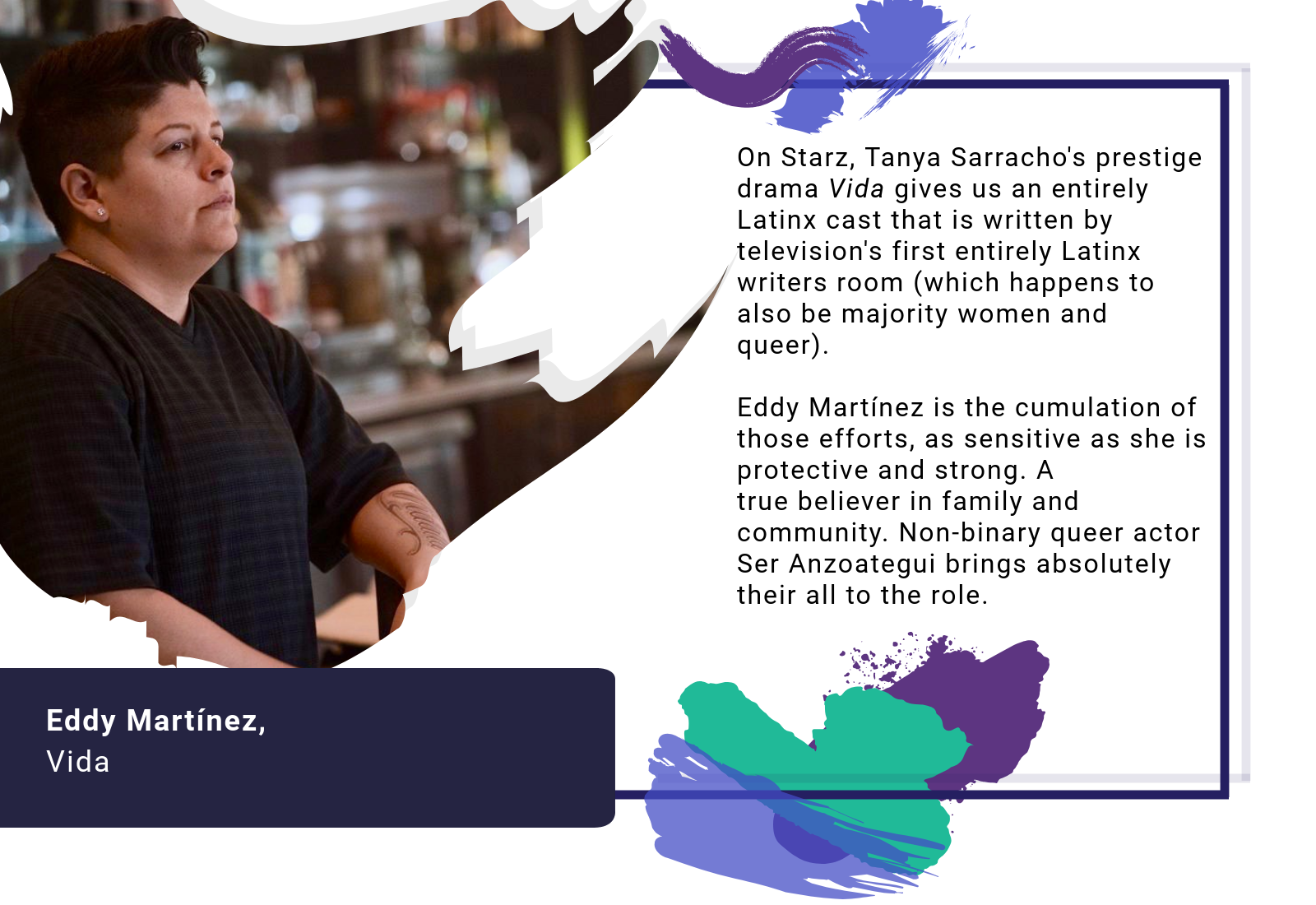
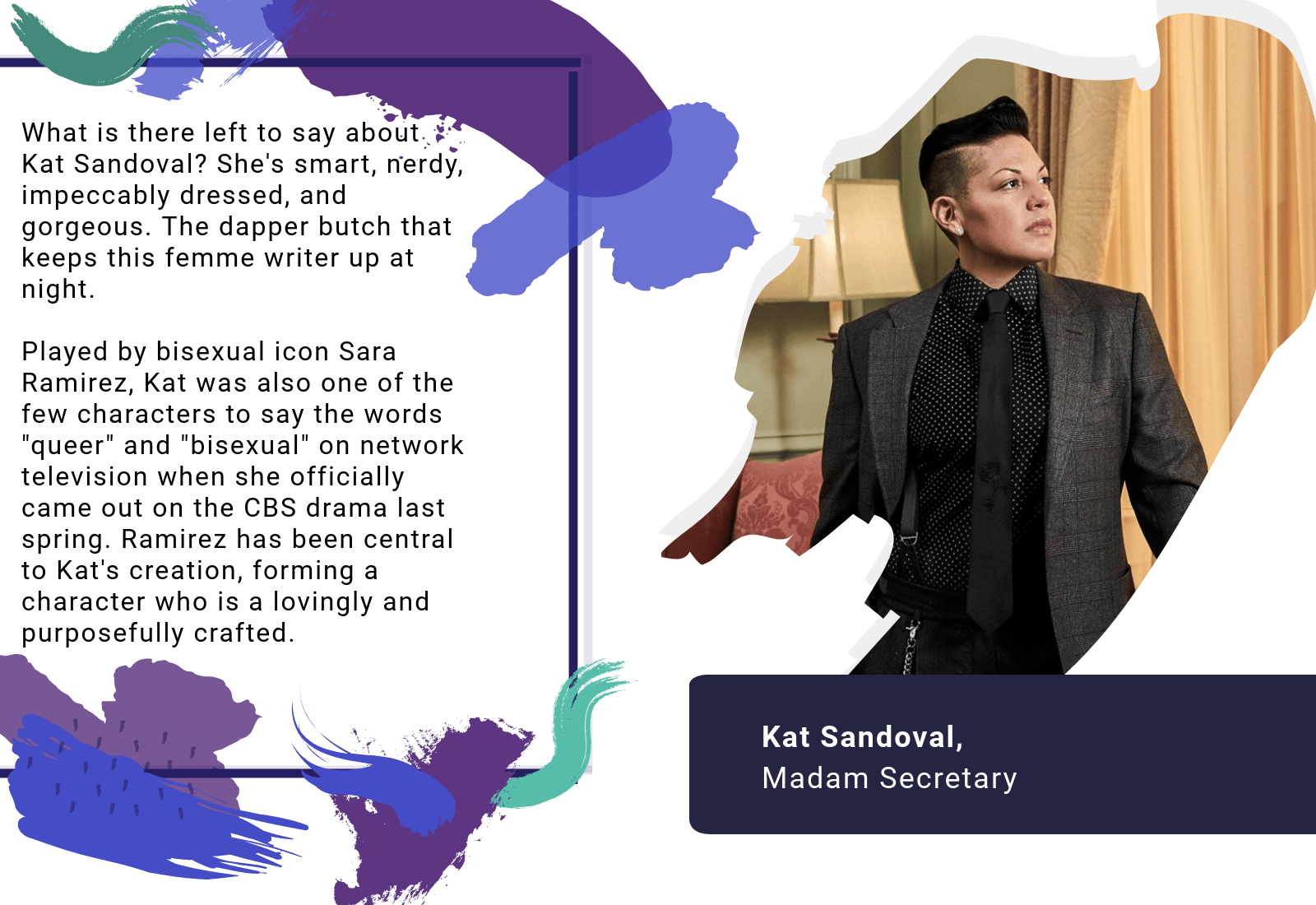
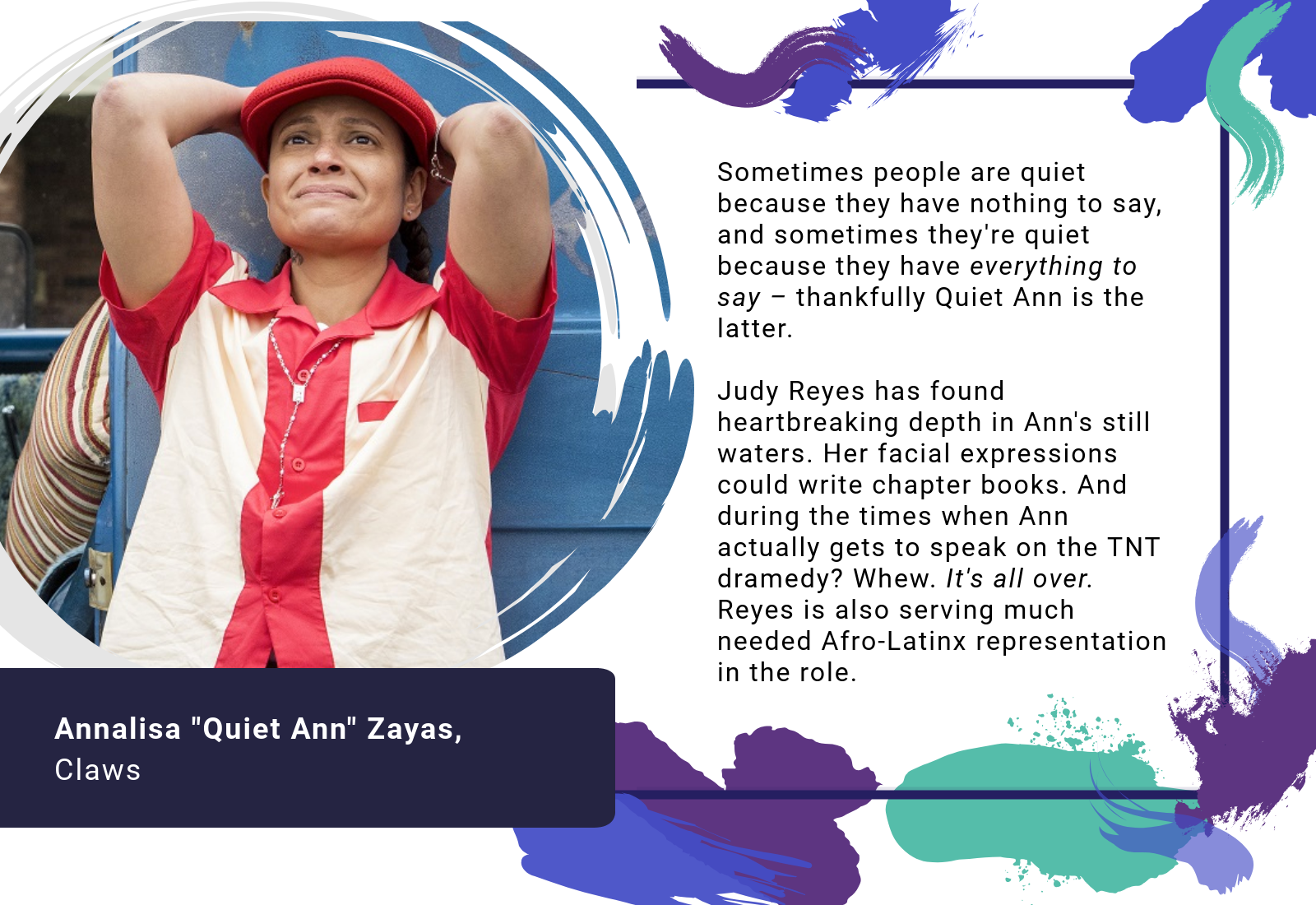
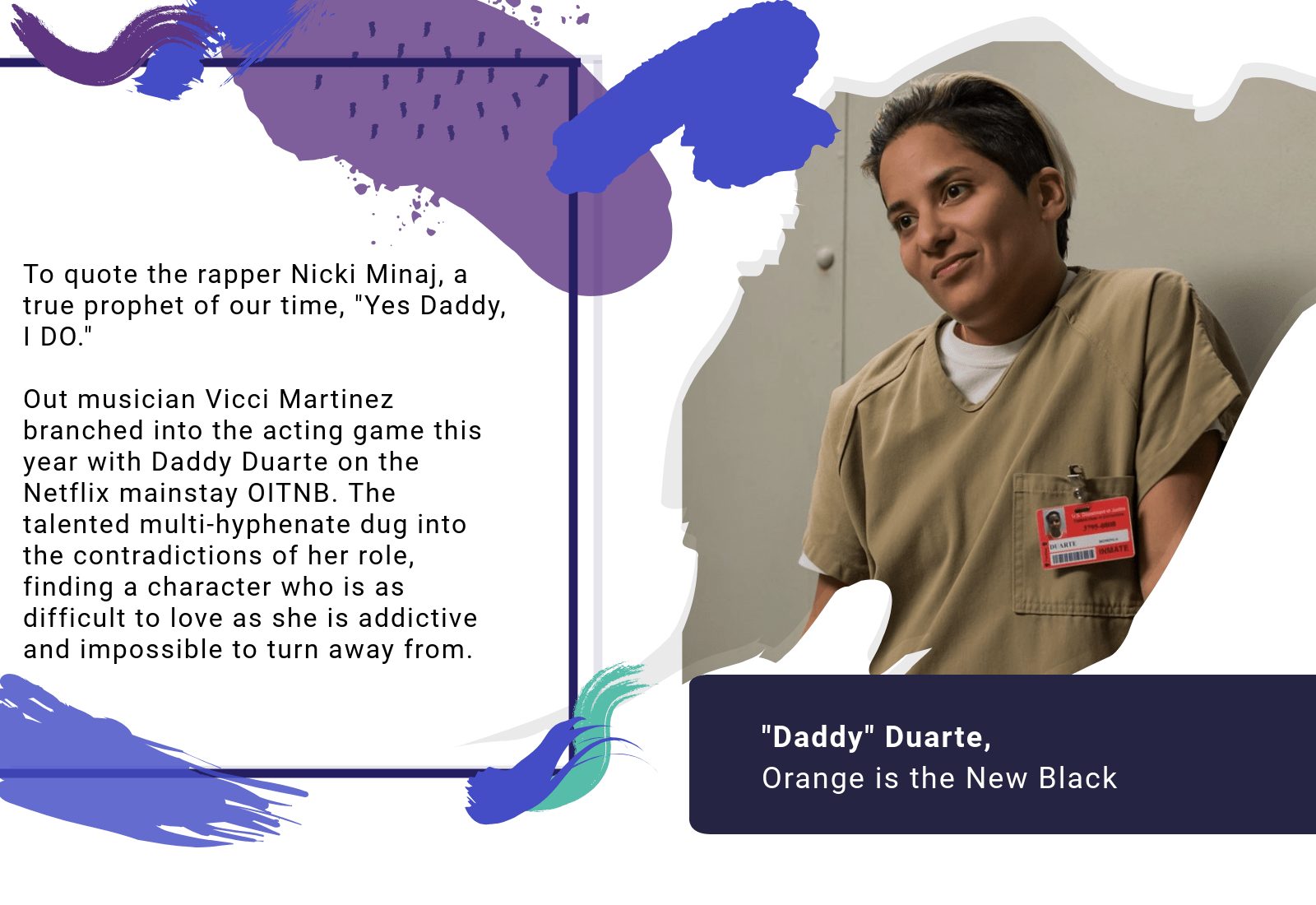
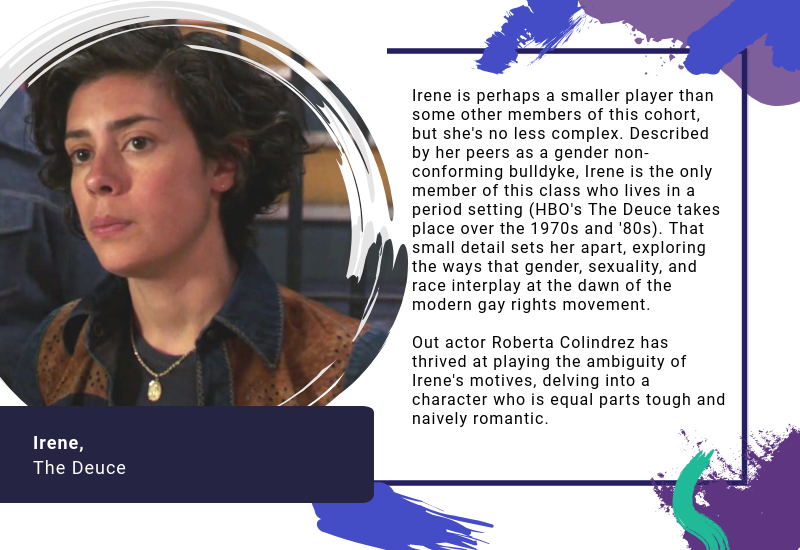
We’ve certainly come a long way.
TV’s Favorite Fictional Writers, Ranked From Worthless to Wondrous
The first “rule” of writing is “write what you know,” which is why so many TV writers create TV characters who are also writers. The layer on top of that is TV criticism, which is writers writing about writers writing TV shows about writers. It’s navel-gazing at its absolute inception point and I’m here today to engage in it — because every few months our TV Team finds ourselves in the middle of a tirade about a fictional writer that leads us down a rabbit hole of all the fictional writers we have loved and hated in our lives. We have a lot of opinions about this topic, which makes us think y’all might also have a lot of opinions about it. Below are 33 of TV’s most popular fictional writers, ranked from worthless to wondrous.
The feelings in this post are my own; they do not reflect the opinions of the entire TV Team.
33. Ezra Fitz, Pretty Little Liars

Claim to fame: Ostinato, a true crime novel he wrote about a murdered teenager he had stalked, which he researched by stalking her grieving friends, who were also his students, one of whom he seduced. Also: Then and Now, a true crime novel about his murdered fiancée (who came back to life after he had a different fiancée, who happened to be that former student he stalked and seduced, and who also basically wrote this entire book).
32. Dan Humphrey, Gossip Girl

Claim to fame: He wrote Inside, a roman à clef about going to private high school on the Upper East Side. Main character: Dylan Hunter. Also: Between one million and ten trillion texts from Gossip Girl and a poem called “Sluts” about his girlfriend that he published in The New Yorker.
31. Dawson Leery, Dawson’s Creek

Claim to fame: No less than 100 terrible screenplays, ultimately the showrunner of a TV show called The Creek.
30. Rory Gilmore, Gilmore Girls

Claim to fame: Went on Obama’s presidential campaign trail, came home and promptly began falling asleep when talking to sources, sleeping with sources, calling editors on the phone to pitch bad stories, going into interviews with zero story ideas, trying to turn the Stars Hollow Gazette into the paper of record for the entire northeastern United States.
29. Jane Sloane, The Bold Type

Claim to fame: Rarely conceives a good story pitch, yet too good to write every story ever assigned to her. Wrote three entire semi-popular articles at Scarlet magazine, invited to sit on a prestigious panel of successful writers, immediately felt so stifled that she left her childhood dream job to work at a startup from which she was promptly fired, lived in her failure for a time, per Jacquline’s righteous instructions.
28. Zoe Barnes, House of Cards

Claim to fame: An upstart reporter on The Herald‘s metro beat who became Frank Underwood’s media mouthpiece which led her to the job of White Hose Correspondent which ultimately led to her being hurled in front of a train by Frank.
27. Spike, Buffy the Vampire Slayer

Claim to fame: William the Bloody got his name from his bloody awful poetry, and then he murdered about ten billion people, and then he got a soul. His poetry was still terrible, though. To wit: “My soul is wrapped in harsh repose, midnight descends in raven-colored clothes. But soft, behold! A sunlight beam butting a swath of glimmering gleam. My heart expands, ’tis grown a bulge in it, Inspired by your beauty. Effulgent.”
26. Nick Miller, New Girl

Claim to fame: Z is for Zombie, a novel that misspelled the word “rhythm” three dozen times and a follow-up novel called The Pepperwood Chronicles about a New Orleans detective fighting “the alligator within.”
25. Kara Danvers, Supergirl

Claim to fame: Got fired from her newspaper reporting job for going rogue and publishing an article using herself as a source, which is called “writing an essay,” despite being told directly that she needed sources (which she already should have known), and despite the fact that multiple sources were available to her.
24. Chidi, The Good Place
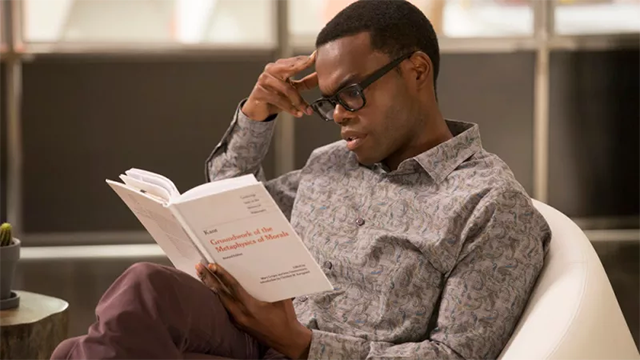
Claim to fame: An ethics manuscript that took Michael — who can read all of human literature in one hour — two weeks to finish.
23. Stacy Merkin, The L Word

Claim to fame: Wrote a New Yorker article Jenny Schecter loved, then wrote a “piece of shit article” about Jenny Schecter in a “little magazine called Curve,” replete with “sloppy syntax and grammar.” (For a more favorable review just type in Publisher’s Weekly dot com Jennifer Schecter.)
22. Jenny Schecter, The L Word

Claim to fame: Masterpieces Lez Girls the novel and Lez Girls the movie.
21. Hannah Horvath, Girls

Claim to fame: Freelance article on trying cocaine for the first time, e-book of essays that never came to fruition, advertorials writer at GQ, Iowa Writers’ Workshop (where she received critiques such as “too Fifty Shades of Grey“), published in New York Times Modern Love column, finalist in Moth’s Story SLAM, teacher of “the internet” to students at a small liberal arts college, aspiring voice of her generation.
20. Tina Belcher, Bob’s Burgers

Claim to fame: Erotic fan fiction writer (definitely in her journal, also presumably on Tumblr).
19. Devon, I Love Dick

Claim to fame: An aspiring playwright who explores “the self-abjection that a woman goes through in order to unleash her desire” and “swaggers around in some kind of shadow polarity of Kevin Bacon.” Also Riese’s favorite TV character of 2017.
18. Alice Pieszecki, The L Word

Claim to fame: The Chart and at least one freelance article on vaginal rejuvenation.
17. Jughead, Riverdale

Claim to fame: Writer for various school newspapers who is also working on a true crime novel about Riverdale that features literary gems such as “Guilt, innocence. Good, evil. Life, death. As the shadows around Riverdale deepened, the lines that separated these polar opposites blurred and distorted. ‘I’m guilty,’ Cheryl said in biology class. But of what?”
16. Diane Nguyen, BoJack Horseman

Claim to fame: Ghost writer of BoJack Horseman’s tell-all biography, One Trick Pony, and the writer of the biography Secretariat: a Life. Also a ghostwriter of celebrity tweets.
15. Richard Castle, Castle

Claim to fame: Author of 41 best-selling crime novels.
14. Sabrina, Sabrina the Teenage Witch

Claim to fame: Her magical typewriter liked her creative writing assignments so much it brought them to life! She also wrote a variety of exposés for the school newspaper.
13. Dr. Watson, Sherlock
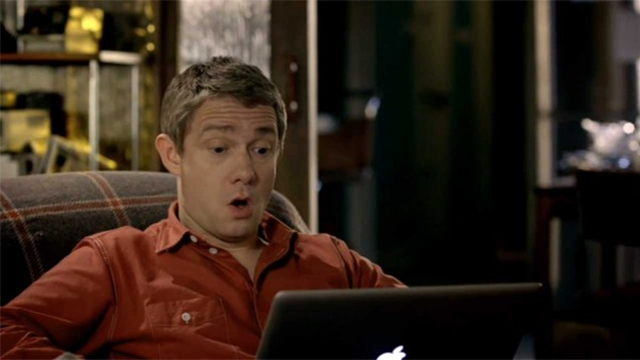
Claim to fame: Sherlock didn’t write his own stories; Watson did.
12. Carrie Bradshaw, Sex and the City

Claim to fame: A magazine column about sex and dating that she turned into several successful memoirs.
11. Suzanne Warren, Orange Is the New Black

Claim to fame: The Time Hump Chronicles, an erotic novel that took Litchfield by storm and spawned its own fandom and fan fiction. It’s not just sex, it’s love. It’s two people connecting, with four other people, and aliens.
10. Gabrielle, Xena: Warrior Princess

Claim to fame: A self-trained bard, she wrote her and Xena’s adventures down on scrolls, which her decedents used to make a TV show. Notable gay scribbles: “I sing of the wrath of Callisto, the pain of Gabrielle and the courage of Xena, and the inevitable mystery of a friendship as immortal as the gods.”
9. Jessica Huang, Fresh Off the Boat

Claim to fame: Her debut novel, A Case of a Knife to the Brain, didn’t sell as well as expected (owing to being released the same day as Harry Potter and the Sorcerer’s Stone, of course), but Plaintiff Stephen King says, “Jessica Huang is scarier than any character I could ever write myself.”
8. Lois Lane, Lois and Clark: The New Adventures of Superman

Claim to fame: She’s the award-winning ace reporter of Metropolis’ leading newspaper, The Daily Planet.
7. Liz Lemon, 30 Rock

Claim to fame: Writing and showrunning multiple seasons of The Girlie Show and TGS with Tracy Jordan, which earned her at least one Emmy.
6. Peggy Olson, Mad Men

Claim to fame: The real-life Peggy Olson was the first woman to rule Madison Avenue. And so was fictional Peggy Olson, who went from secretary to copywriter to copy chief at some of the most successful ad agencies in the world, through raw talent and a relentless work ethic and sheer force of will.
5. River Song, Doctor Who

Claim to fame: Melody Malone: Private Detective in Old New York Town, a noir novel that was actually a memoir which she published from the future to help her mom, her dad, and her husband not destabilize their nearly catastrophic time paradox even further. Also, centuries worth of spoiler-filled journals.
4. Jane Gloriana Villanueva, Jane the Virgin

Claim to fame: Snow Falling, a best-selling debut romance novel that received such praise as “BRILLIANT. MOVING. MASTERFUL. I laughed, I sobbed, I even danced. The best novel of the century,” from Rogelio De La Vega.
3. Khadijah James, Living Single

Claim to fame: The always-hustling editor-in-chief of her own indie magazine, Flavor. She wrote, she managed, she accounted, she did it all and paid other women to do it alongside her.
2. Jessica Fletcher, Murder She Wrote

Claim to fame: 43 mystery novels, total. Among them: The Corpse Danced at Midnight, A Faded Rose Beside Her, Dirge for a Dead Dachshund, and Ashes, Ashes, Fall Down Dead. And she didn’t even start writing until after she was retired!
1. HG Wells, Warehouse 13
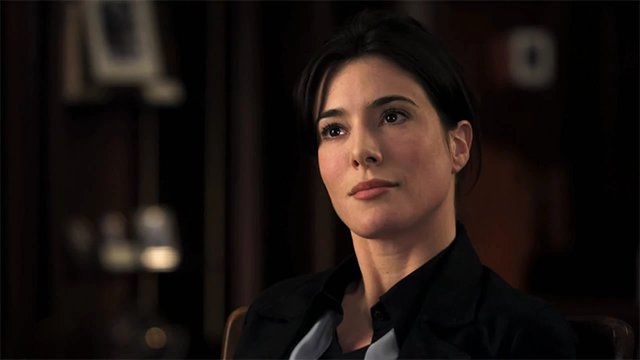
Claim to fame: Just some of the greatest works of literature in all of human history: The Time Machine, The War of the Worlds, The Island of Doctor Moreau, The Love Song of Myka Ophelia Bering.
Orange Is the New Black Season Six Went to the Max and Maybe Back Into Our Hearts
by riese & carmen
Season Six of Orange is the New Black dropped on Friday morning at midnight PST and exactly two members of the Autostraddle team cared deeply about this event: me and Carmen.
Since Poussey’s death in Season Four, it feels like our take on the show has verged dramatically from that of other critics’. Jezebel’s negative review of Season Six called Season Four “electrifying,” The AV Club gave As or A-s to Season Four’s last four episodes. Season Four earned a 96% on Rotten Tomatoes, a not-significant departure from the 98% granted to the prior three.
We do our best not to let issues of politics or representation cloud our ability to critique television on its artistry and storytelling prowess, but the program’s uneven and slipshod handling of racial issues, capped off by Poussey’s murder, overwhelmed those instincts. As discussed in our recent roundtable on how to handle TV that breaks our hearts, a full 36% of our readers told us they used to watch Orange is the New Black but didn’t anymore. We got backlash for covering it at all, although we stuck to the conviction that it was important to be part of the conversation. Surprisingly, season six — currently hovering at 85% on Rotten Tomatoes, up from season five’s 73% — struck us as, finally, the show finding some of its familiar legs again. So Carmen and I sat down to talk about it to each other and then, hopefully, to you.
Please be aware that this conversation references, with abandon, the entirety of Season Six, and therefore you should not read it if you don’t want spoilers.
Looking Back on Orange is the New Black
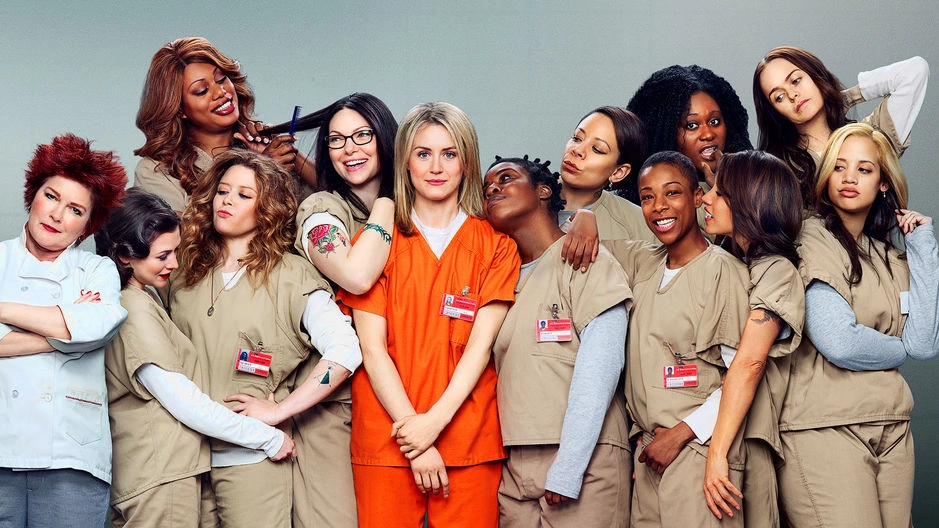
Netflix
Riese: So for starters — we both used to be huge fans of this show, right? OITNB weekend has had a special place in my heart since 2013. I remember the day after my girlfriend of 3.5 years and I broke up, she called in sick to work so we could still marathon Season Two together! That’s how dedicated we were. Autostraddle went all out, too: for the first three seasons, OITNB content carried us, traffic-wise, through summer slumps. We did open threads, we had weird lists, we had viral tie-in posts, we had recipes for an Orange-themed dinner party!
Carmen: Oh for sure! I wrote about this last year, but when I first discovered Orange is the New Black, I binged it in a day! That’s pretty much been my tradition every year since. One year the show happened to fall in the middle of my 30th birthday trip with friends, and I was actually distressed about it! I waited until everyone in the house fell asleep from partying so I could watch the episodes on my laptop. Back in 2015, I marked the occasion by baking vegan chocolate cupcakes with orange frosting. It was serious for me.
Riese: Right, it was always one of the first weekends in June! Usually it’d fall right after A-Camp, which helped ease the post-camp comedown for me. Season one was a groundbreaking masterpiece. I didn’t like season two quite as much, but it was still incredible, especially in retrospect compared to what the future had in store. I loved season three, and the S3 finale — with the inmates breaking through a hole in the fence while MCC unloads busses of new prisoners — was one of my favorite season finales of all time. (Although we apparently didn’t recap it? I know I wrote this recap so I am very confused about it!) Then, of course, season four.
Carmen: After Poussey died in season four, I wasn’t sure I’d ever watch it the same way again.
Riese: Absolutely. It was, in my opinion, the most devastating lesbian character death in TV history, on just about every level — she was black, she was played by a lesbian actress, she was the show’s most earnest/hopeful character, she was part of a cute couple and friend group, she was killed by white writers to teach white people a lesson about racism, it was a tacky tie-in to current events, they tried to “humanize” her killer in that episode, etc. And, it happened the week after the Pulse shooting.
Carmen: Heartbroken isn’t the right word – I was betrayed and devastated. And yet, somehow I found my way back to the show again.
Riese: Yes, it’s like I gave OITNB a 150/100 so when it lost 100 points for me, it still had 50 points! Which is more than most shows. It’s still overflowing with intriguing, dynamic and often hilarious characters who’re constantly being thrust into unfamiliar and challenging situations. It is still introducing some ignorant people to some of the (compromised for fiction) realities of America’s prison-industrial complex.
Carmen: It’s funny, right? When you watch a show that’s been on air as long as OITNB – and has been an awards contender almost every year – on some level you end up playing the “ranking game.” You start to wonder how this season measures up to what you’ve seen before.
Riese: This is the first year we’re not recapping every episode. It feels weird not to! But we’re in a financial hellmouth at the moment and can’t afford to put money into something so many of our readers have entirely checked out on — recapping an hour-long drama takes, at least for me, two full days of work. Although I hope to get a few stand-alone pitches on the season, somehow. We’ll see!
Carmen: Is it ok to admit that I already miss our recaps a bit? But there’s a silver lining because this is giving me a chance to do what is ultimately one of my favorite things, which is pick your brain about television!
Riese: ONE OF MY FAVORITE THINGS IS TALKING TO YOU ABOUT TELEVISION so we’re both living our dreams.
Carmen: Honestly, I was shocked at how high I would rank this season. I agree with you – season one burned brighter than the sun! It ushered in a new era of television. My personal favorite will always be season two. I adored what Lorraine Toussaint did with Vee and I consider it to be Poussey’s finest character work. Season three felt uneven (sorry Riese! I really disliked the “Cult of Norma” storyline!). That said, I agree that its finale of the inmates breaking out to the lake was absolutely breathtaking.
Riese: Oh, I agree about the Cult of Norma storyline, which I think I attacked in my recap or writing about that season so I might be part of the reason you hate it! [finds recap] A-ha yes, I wrote: “I hated this storyline SO MUCH (and couldn’t buy for one second that Poussey would get involved with it). It didn’t make sense on so many levels and took up valuable time that could’ve been better employed.” But a lot of our readers disagreed! I felt like it was absurdity for absurdity’s sake, something we often see in the work of Ryan Murphy, actually.
Carmen: Seasons four and five are linked in my head as, quite frankly, painful.
Riese: Yeah, season five had its moments, but was hard to actually enjoy, especially considering the ongoing WHITENESS OF THIS WRITER’S ROOM. This is not a hard problem to fix! And I think this year’s writer’s room was slightly more diverse, but … hardly.
Orange is the New Black Season Six: To The Max
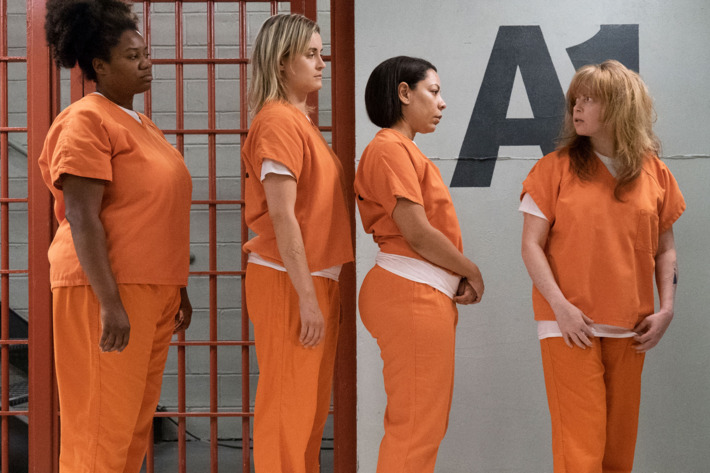
Carmen: So what about now? I think that season six was a surprising reset and a mostly solid return to form. I’d probably place it after seasons one and two, and somewhere around season three. When I first started this year’s binge, if someone predicted that’s where I’d land, I would have laughed at them!
Riese: This season’s first three eps were… bleak, especially with all the major characters either missing or separated, guards physically and emotionally torturing the inmates, and the system out in full force destroying everybody’s health and will to live. The heartless detectives. The prison’s reluctance to medicate Suzanne and return her to Gen Pop? Our only levity was Suzanne’s hallucinations! (The Cha Cha Slide was downright delightful, I admit). Ugh, and the callous denialism that enabled “Fantasy Inmate.” The savage asinine new guards! Meanwhile Doggett is going to a fucking amusement park WITH HER RAPIST! I stayed up ‘til midnight to watch the first few episodes and I’ll tell you what, I did not sleep well that night! Usually OITNB starts okay and gets darker as we plow forward, so I was terrified about where this might be headed.
Carmen: That was my exact fear! And for the exact same reasons. I finished episode one and paused the credits to clutch my stomach. Based on precedent, I had a bad feeling about where we were headed. Eventually the show found spaces for levity and balance as they progressed. Those later moments were a welcome breath of fresh air.
Riese: Although I resent centering an entire season’s conflict around two characters we’d just met and don’t truly care about, it was at least refreshing for Litchfield’s gangs to not be organized by race. I know the race-based gangs and housing were accurate depictions of Piper Kerman’s experience at prison camp and how many/most prisons are organized in the U.S., but this show’s handling of race had devolved to an unendurable place, and I appreciated the break from literal Nazis, constant racial slurs, and the writers’ mind-boggling suggestion that reverse racism exists and that poc-vs-poc racism is just as insidious as white supremacy.
Carmen: YES!! And somehow that’s still putting it kindly! Let’s be real, OITNB has never ever gotten their racial representation perfect. I don’t believe they genuinely ever made it their priority to get it right, either. If they had, they wouldn’t have maintained their famously white writers’ room for as long as they did. But, the last two seasons were horrific! At least early seasons put a spotlight on the humanity of disenfranchised women of color. It was glorious. Along the way, they brutally lost track of that.
I think this season rediscovered those moments for humanity, and the show was stronger for it. I don’t know if it’s because of the prison shake up, which forced new alliances across racial lines (Suzanne has a great monologue that in Max she’s assigned a color – meaning her new pink prison uniform – and certain colors hate other colors. Navigating that newfound terrain is complicated!) or if it’s is the result of other behind the scene changes. Before season six debuted, Jenji Kohan acknowledged that season five wasn’t their best showing.
Changing Winds
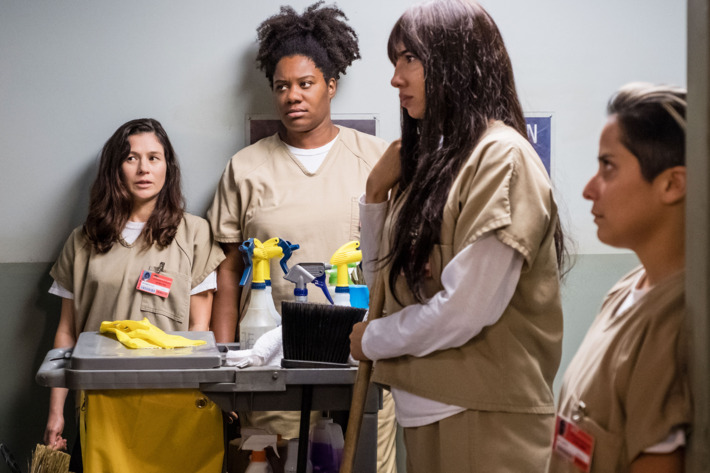
Carmen: When I say that OITNB once again committed themselves to the humanity of their women of color, that doesn’t mean that they only show those characters to be one-dimensional angels! To me, one of the most human moments of the season is Aleida deciding to continue smuggling drugs into the prison, despite discovering Daya’s addiction. It’s the only way she can get enough money to save her other children. Watching her quietly weigh the pros and cons of that unbearable decision while sitting at her kitchen table was at once terrible and powerful.
Riese: Absolutely, especially following her foray into multi-level-marketing. In 2014, Al Jazeera did a four-part series on MLMs which included an investigation into how Herbalife, a pyramid scheme, preys on Latinx communities. They wrote that Herbalife “targets poor, often-uneducated Latinos, many of whom are living in the country illegally.” In OITNB, we see how that strategy was effective with a former convict who has similarly limited employment options post-release.
Carmen: Taystee’s delicate relationship with Tamika (CO Ward) is another excellent example. Early in the season Tamika, who knew Taystee back when they were both working at their neighborhood fast food joint as teenagers, tries to tell Taystee that she’s in prison because of her own life choices. Taystee reminds her that they traveled on the same road – the only difference between them is happenstance. That kind of bare honesty between two women is what Orange is The New Black excels at when it actually tries.
Riese: Another reverse-course that stood out to me was how many characters who’d resisted growth for so many years were genuinely evaluating past choices in order to make responsible new ones. It’s important of course to note that for them it’s only been a few weeks since Poussey was killed and for us it’s been two years. But the riot changed people. Specifically: Piper, Alex, Maria and Gloria deliberately did what they could to opt out of gang affiliation. They didn’t always succeed, but they kept a level-headed emotional distance. Characters who’d always laid low but often ended up sucked into the fray regardless — Taystee, Cindy, Flaca, Suzanne and Doggett — didn’t feel even remotely tempted to opt in.
That made Red’s stubborn pride, which I thought peaked last season, really stand out. Everybody else wants to move forward and she can’t seem to. At this point, she’s not just being prideful — she’s being an idiot. I’ve never been a big fan of Red, but I truly dreaded her scenes this year. Lady, you are what now, 70? GROW THE FUCK UP!
Carmen: Oh man, when Red finally has the chance to see her grandchildren, but gives it up at the last minute for the opportunity to throttle Freida instead? I was so freaking mad at her! I actually like Red, mostly because of her tenderness towards Nicky, but I agree – she’s become stunted.
Riese: Also she was very bitter about her children not “covering” for her, but like… they didn’t make you do what you did, either?
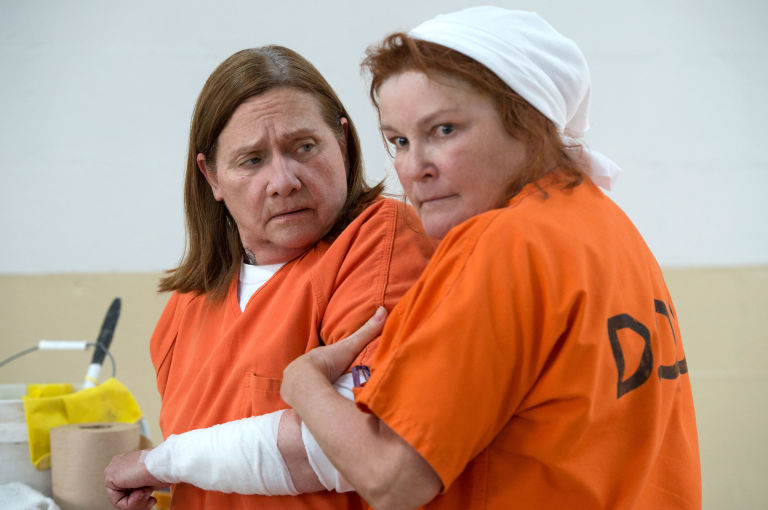
Riese: Anyhow, there were a LOT of characters missing! We saw Big Boo and Ouija very briefly, and heard nothing from or about Maritza, Watson, Soso, Yoga Jones, Allison, Pidge, Brandy, Norma, Leanne & Angie. I was pleased to be rid of Leanne & Angie, but I missed Soso, Watson, Big Boo and Maritza. Isn’t it downright bizarre that Cindy and Taystee wouldn’t at least ask about Watson? Still, paring down the cast was a good call.
Carmen: I figured we were in for a cast cutting after they they split up the inmates “at random” onto buses at the end of last year. You’re right, it was a good call. Some of those characters had taken their stories to the end of their rope. I’d be a happier person if I never heard from some of them again (and yes, I’m talking about Leanne & Angie).
I think I missed Big Boo’s relationship with Doggett the most. I’m thankful that one of this year’s course corrections was to finally move Tiffany out of that relationship with her rapist and let her recognize that he was emotionally abusive! I would have liked to see her work through some of her healing with Boo, who warned her about that asshole for the longest time. Plus, I have a soft spot for Lea DeLaria and her important history (herstory?) in lesbian pop culture.
Riese: Absolutely same. And yes, some of OITNB’s best arcs have resulted from unlikely allyships like Big Boo and Doggett’s (I’m also thinking of Sophia and Sister Ingalls, or Poussey and Soso). In this season, forcing the inmates into new living arrangements and alliances was another solid, compelling choice.
Carmen: It helped recharge the show! There were so many awesome, but unexpected pairings this year! My favorite was probably Cindy and Flaca. They flowed surprisingly well together. It wasn’t just comedy. Flaca really had Cindy’s back. She was the one who helped her find a way to forgive herself for betraying Taystee. That brief moment of healing was really touching to me, and both actresses rose to the occasion.
The New Kids On the Block
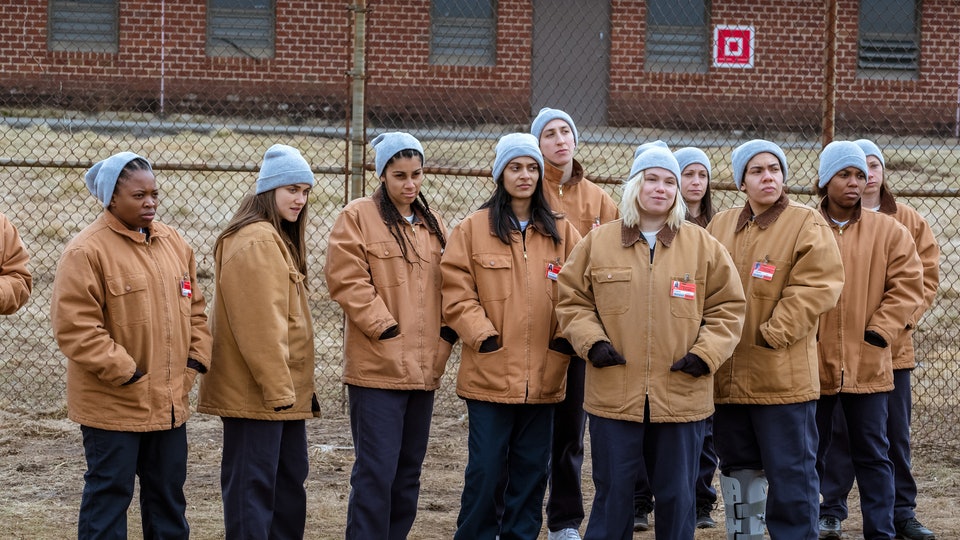
Riese: So, let’s talk about the new characters. Badison. Why? Who’s terrible idea was this?
Carmen: I can’t help you there! At first I thought she was kind of funny in a walking disaster/comic relief way, but then as the season progressed it slowly dawned on me – Oh no! She’s always like this!
Riese: Her flashback was revelatory, but never came close to explaining how the hell she became Carol’s second-in-command. Her Boston accent was an insult to humanity. (Also not everybody in Boston has an accent! Her high school classroom scene felt like an SNL skit.) She was obnoxious, stupid, and lacked charisma. I wanted her to fall on a knife!
I also really enjoyed Adeola, the evolutionary anthropologist from Lagos with a dry sense of humor who got in on Gloria’s “Cult of the Holy Virgin”? I hope we get a flashback from her next year!
Carmen: Oh hey, the Cult of the Holy Virgin! El Día de Anunción de la Soledad!
You said you didn’t feel invested in them, but I liked Barbara and Carol Denning (the “Little Debbie” murderers). They were enjoyable as one-off Big Bads, and I will always welcome Mackenzie Phillips on my screen. I thought some of her work with Natasha Lyonne was excellent, especially taking into account their shared past public struggles with addiction.
Riese: Nicky has really evolved these past two seasons after some erratic relapses, literal and otherwise. Her refusal to accept legal representation from her father, though, was part of what concerned me in the first few episodes — it’s painful to see these characters you’ve grown to love repeatedly bite the hands that attempt to feed them out of pride or resentment. Sometimes you’ve gotta suck it up and take help from wherever it comes. As was said in another fictional prison, The Shawshank Redemption, “you gotta give ‘em hope!” Every force in the world is against these women, but when there’s no hope, it becomes torture porn.
Carmen: Also – and this is shallow of me – I adored Carol’s glasses! “Young Carol” was kind of hot? In a madcap queer way. I dunno. I haven’t processed this enough, clearly.
Riese: I LOVED HER GLASSES TOO! I adored all their flashback fashion. I also liked that we got a genuine true crime murder story out of the two sisters, because I am demented.
Yes Daddy I Daya

Riese: So, let’s talk about Daddy, a lesbian character played by Vicci Martinez. Pretty easy on the eyes.
Carmen: I’ll admit it! I spammed our work channel on slack this weekend with all of my Daddy thirst! I’m that person!
I think she delivers one of the stand out performances of the season. You want to love Daddy, but at the same time, you know you’re not supposed to. She’s undeniably sexy, and purposefully uses her charisma to manipulate the women around her. Whether it’s inside the prison as a drug dealer or on the outside as a high end pimp – she’s genuinely protective of her “girls.” She also puts them in harm’s way. It’s a complicated knot to untangle. OK. Listen. When Daddy first did that little eye flick thing and licked her lips, I knew I was a goner.
I had a small crush on Vicci Martinez when she was a finalist on The Voice in 2011 and now she’s dating one of her OITNB co-stars (Emily Tarver, aka CO McCullough)? Awww, c’mon! It’s so sweet!
Riese: It was also an interesting choice to have Daya intentionally go “gay for the stay.” She pointed out that for her, “gay for the stay” meant forever because her hopes of getting out are pretty minimal.
Carmen: Ohhh, I’d actually love to hear your thoughts about this! It was a swerve in the show’s development that I didn’t see coming! I’m not an expert on “gay for the stay” obviously, but I’m super interested in how we think about these kinds of liminal sexualities.
Riese: I mean — we got to see Daya hook up with a girl! Plus it was a POC/POC relationship, which’s rare. As Gabby pointed out in Season One, too, none of OITNB’s Latinx characters were queer and although Flaca and Maritza were a shippers’ dream, we never got a queer Latinx regular. Then we suddenly got one new Latinx lesbian AND an existing Latinx character got turned! Also, I feel in my heart that everyone is gay, so this change of course was an accurate depiction of my heart. We’ve seen the “gay for the stay” dynamic on OITNB before, like with Nicky and Morello. It’s hard to know what this relationship means to Daya — she’s on drugs and need drugs, so the whole thing could be entirely presentational. But, their chemistry was palpable and also, Daya is fucking tired. The shit she’s been through? She deserves a nice butch to take care of her. Of course, Daddy’s version of “taking care” isn’t… well, it’s a little fucked up.
Carmen: I feel conflicted about Daya and Daddy. They have off the walls, crackling, chemistry. At one point, Daddy strokes Daya’s cheek and calls her “a good girl” and I got a little weak in the knees! (I mean, I’m only human!)
Riese: My other activity this weekend besides watching OITNB was our next Lesbian Sex 101 post, this one about sub-identities mostly within kink, which included Daddy / Good Girl. So my eyes popped out of my head during that convo.
Carmen: There was an element of them wanting to protect each other, and do right by each other, that felt genuinely sweet. On the other hand, Daya is quickly becoming an addict and Daddy isn’t intervening at all. In fact, she seems fine with letting Daya make risky behavior choices as long as they’re for Daddy’s benefit.
Riese: For sure. I think — and maybe I’m just rationalizing here, as I am wont to do in favor of a strong ship — to me, that was just a maximum security prison edition of a relationship dynamic I think endures in real life all the time, even in the lives of people we love or consider ethically unambiguous. We’ve all known people who enable their partners in myriad unhealthy ways in order to keep them close, you know? And… when in Rome. It felt to me like Daddy was dealing with so much inner turmoil over her failure to maintain the drug pipeline, please Barb, and take care of her group. While dealing with, I’m sure, unresolved guilt over the fate of her girls in her pre-prison life. Speaking of, she was similarly complacent with her girls on “the outside” using drugs and alcohol to get through dates or to otherwise just enjoy the high-roller lifestyle. I’m unsure if she saw Daya’s drug addiction as a genuine problem, or just the way of the world? I’d also assumed she was unaware that Daya hadn’t been an addict or pill-popper in the past. But I also experienced intense Daddy thirst, so.
Carmen: Yeah, I can see that. Daddy thirst is A REAL THING! And — this is just now occurring to me! — are Daddy and Daya a reincarnation of Aleida’s relationship with Cesar? Mind blown.
Riese: Oh shit.
Mazel Tov, Piper & Alex
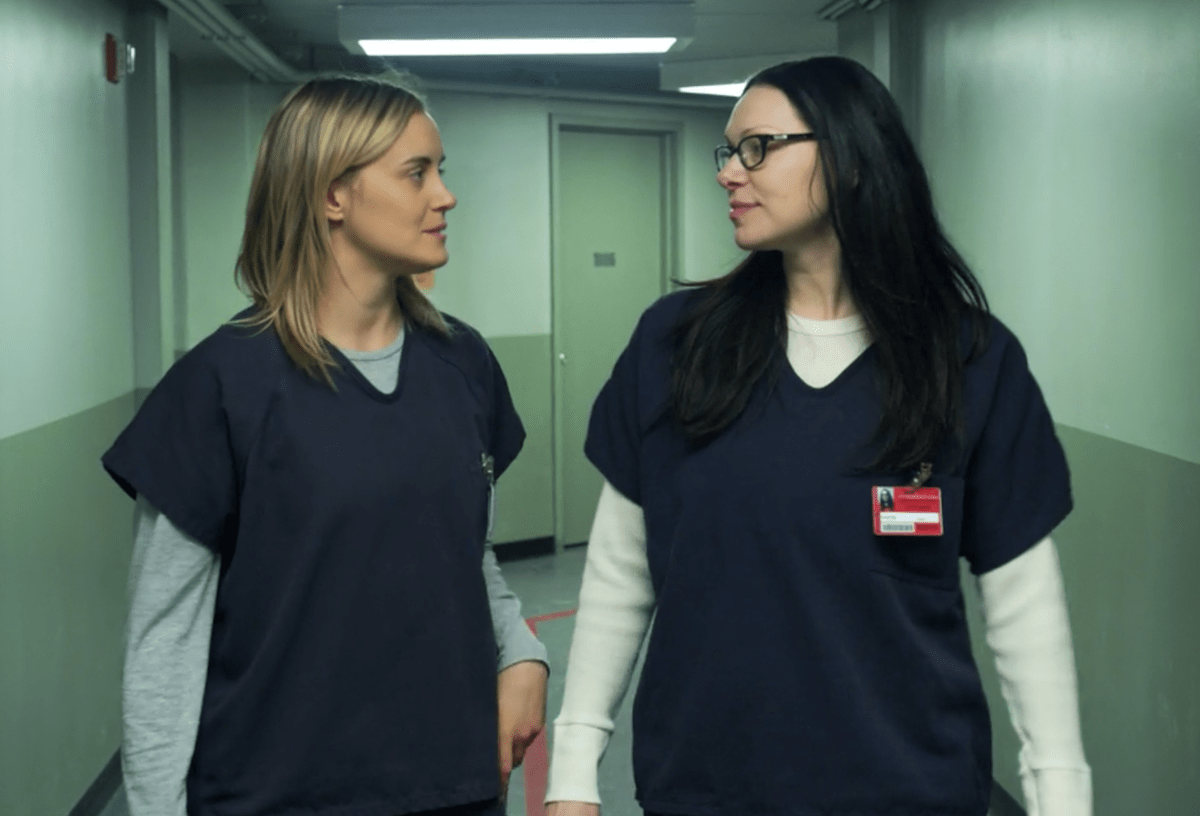
Carmen: OK! Speaking of Litchfield’s major lesbian romances! Did you have any thoughts about Piper and Alex’s wedding? I think the show’s biggest magic trick yet might be convincing me to be invested in Alex and Piper again after all these years.
Riese: Yeah, Piper and Alex of all people ended up granting a certain levity and sweetness to the narrative without valorizing Piper. Their renewed relationship gave them both something to live for, so to speak, but also something to behave for, an exit route from nihilism. Piper’s unprompted monologue to Beth in episode two started setting that up: “I used to think that there were two versions of me. There was the version of me in here, who smoked crack and had a gang who punished people for crossing her. And then the real me… she was out there, and she hadn’t done any of those things. But now I realize there isn’t another me. There’s only this me. And I don’t know what the fuck to do with that.”
Still, I think the reviewer from Vulture really hit the nail on the head with what they wrote about Piper’s somehow still-employed wide-eyed naivety about her own privilege, how that privilege is perceived by other inmates, and the unbalanced weight of her story vs. Taystee’s during their exchange at the beauty salon. Which brings me to….
The State vs. Tasha Jefferson
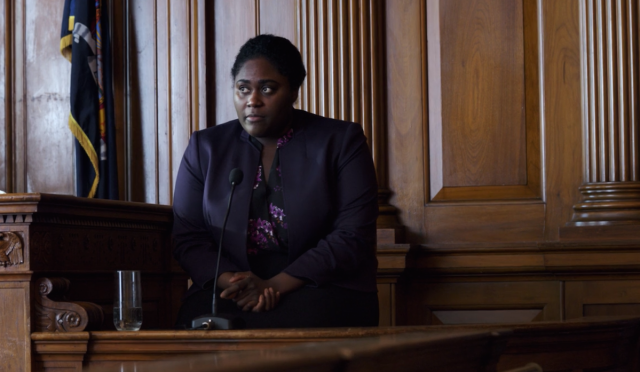
Riese: So — Taystee ends up on trial for the murder of Piscatella. Here’s what got to me: how was she ever supposed to win that trial if nobody presented an alternate theory of the crime? I’m not sure the whole Cindy/Suzanne withholding information storyline functioned effectively, although it gave them both a lot to wrestle with as people this season. I mean, if we know anything about what happens when cops kill people, it’s unlikely anybody would’ve believed or investigated what Cindy and Suzanne witnessed, had even they testified on it. But at the same time… I feel like there was a window of time in which Cindy could’ve told Taystee what went down, and explained that she didn’t know Piscatella had been killed or that Taystee was being accused of it when she gave her initial statement to investigators. I don’t know, that whole thing was a little convoluted, and honestly quite clumsy in parts.
Carmen: I guess now we are getting to the really painful parts. On some level, I knew Taystee was going to lose her case. That was realistic. Still, there was this glimmer of hope. I really loved that black women and Black Lives Matter came to Taystee’s aid. That Poussey’s name was getting written in the papers. In its own way, it was beautiful.
Riese: And to have her walk into Gen Pop and get greeted by applause instead of theft and hostility? Praise Lesbian Jesus! Litchfield inmates so rarely choose the right person to valorize, yannow?
Carmen: I almost thought Taystee might finally get a win. But, in hindsight, of course not.
Riese: Same. Her testimony in the trial made me cry. I was holding my hand over my face so that I wouldn’t see “guilty” show up in the captions when the verdict was delivered. As it turned out they’d eliminated sound for that clip anyhow, which was a merciful choice for an often-merciless show. It just blew my mind that the ACLU wouldn’t try to get another witness to testify that Piscatella left the pool alive. There were twelve women down there, half of whom had nothing to lose by testifying to that fact!
Carmen: It’s implied early on that Freida gave up Taystee to the investigators before she gave up Red (she says “I already gave you the black one”), but what about everyone else? I understand Cindy couldn’t perjure herself, but what about Gloria? Alex? Piper? I can’t think what any of them had to lose… well, other than their truncated sentences. I suppose that was the point, but they could’ve made that clearer on camera.
Riese: Also, what happened to the other medical examiner the ACLU hired? We never saw that in trial. I know Taystee wouldn’t have had a shot anyhow, because you know, institutionalized racism, but to leave those avenues unexplored felt unrealistic and confusing.
Carmen: Honestly, Taystee’s trial should’ve been an entire episode by itself. That’s probably the biggest pacing issue I had this season.
Riese: Yes. So much of her story was rushed in favor of less important things, like literally every word out of Badison’s mouth. And I was surprised there wasn’t more attention paid to jury selection. I feel like Taystee’s lawyer would’ve pushed for a more diverse group.
“Be Free”

Carmen: Surprisingly, I didn’t hate the turn towards focusing on Piper at the end. I think letting Piper out early with a full season left is a bold move. At the same time, the finale parallels would have landed even harder if we spent more time with Taystee. It would’ve clearly established Piper and Taystee as co-leads of the narrative for the audience.
The show already laid groundwork for that when the two are alone in the hair salon and Taystee essentially tells Piper that she’s a living representation of privilege. Which is absolutely true – that only becomes more obvious when Piper’s granted early release. And of course also, the final shot of Piper pulling away from Litchfield in her Subaru Outback just as Taystee goes back in the U.S. Marshall van.
Riese: Yeah, I think moving Piper outside the prison was a good call — I assume the writing and publication of her memoir will be front and center for season seven. But Diablo standing outside with that bouquet of flowers while Blanca ended up transferred to ICE, after MCC unveiled their plan to expand into Immigration and Customs Enforcement? Oof. I did resent the writers for setting us all up for that, and felt like it was cruel and unusual to tell her she was getting out, only to transfer her to ICE. But of course, under this administration? Unfortunately totally believable.
Carmen: That gutted me! I did not it coming! I knew something was up with Flores. But, I didn’t expect THAT.
To be honest, I’m still working through my feelings about the finale. It was weird. I felt frustrated by the systematic inequality presented to us, obviously. At the same time, I also walked away going, “OK, Orange is the New Black, this is how you do it. This is how you depict reality without devolving into violence and torture porn.” Give me space to be beside myself and frustrated and moved in my spine to make a change (or keep making changes) in this country because of these women’s stories, but allow me the room to do that without also feeling like you’re exploiting your most vulnerable characters for sport. Finally being able to have that space again almost felt a little like a relief? A depressing relief? I don’t know.
Riese: Yes I agree. Also, I’m happy for Sophia getting a handsome payout and early release, although I suspect, based on Laverne Cox’s schedule, that this might be the last we see of her. Which’s too bad, I’m very curious how her life will proceed on the outside. Bless us, everyone, that we did not need to see her get tortured any more this year! Damn, this is a low bar.
Carmen: I’ll always be thankful to OITNB for introducing me to Laverne Cox. Her talent and her activism have been definitive for me. I’ve been thinking about her legacy on television a lot this summer, actually. Particularly with Pose garnering such attention on FX. In a few short years, her work has already opened so many doors. It’s undeniable, you know?
Anyway, I wish we could have spent more time with Sophia over the last couple of seasons, but I respect the ways that Laverne’s schedule made that prohibitive. I was happy to see her leave, smile on her face, comfortable in her skin, and quoting James Baldwin. It’s probably the first true “happy ending” we’ve seen on the show so far? Both she and her character deserved it.
Riese: OITNB’s incorporation of Aleida this season, as well as how Wentworth kept Frankie on the show while moving her outside of the prison, left me with little doubt that Piper will remain a season seven focus, for better or for worse. But I’ll have Jenny Schecter PTSD if we have to deal with another “everybody’s mad at me for writing Lez Girls” situation.
Carmen: Oh no! why would you put that out in the air???? Welp. Now I’m definitely going to have nightmares.
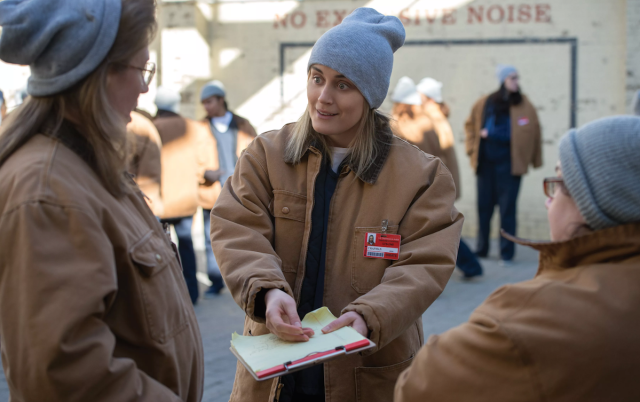
This isn’t about you, Carol! See, it says right here, “CARA.”
Riese: My other hope for next season is that The Innocence Project or something akin to The Last Defense picks up Taystee’s case. She’s become the star of this show and I can’t bear to see her weather any additional blows. Shit has been bad enough!
Carmen: I hadn’t thought of it, but yes! Absolutely! That would be an excellent choice for how to end Taystee’s arc and how to end the show. It would also give Orange is the New Black a chance to go out on a high note by lifting up the activist work already being done around the prison-industrial complex, which they should be doing anyway.
Riese: Just two brief things I feel are worth noting before we sign off and let our readers tell us how they feel about the season and what if anything they’d like to read from our team about it — because as I’ve realized during this conversation, there’s SO MUCH TO SAY — one: they killed Maureen. The last we saw of her, she was being rushed out of medical by two stormtroopers who said she had elephantitis on her face. Alex said she died at the hospital, although the newspaper article we saw said she was “found dead.”
Lastly, G-ddess bless Chang, who Fig says they found “sleeping inside a hollowed-out deer carcass.” *Chef’s kiss*
OINTB’s Vicci Martinez and Emily Tarver, a.k.a Daddy and CO McCullough, Are Girlfriends IRL!
A genuine highlight of Season Six of Orange is the New Black is the introduction of Daddy, a smokin’ hot butch / former high-end “pimp” played by bona-fide lesbian Vicci Martinez, a singer-songwriter you may remember from her exceptional turn on The Voice in 2011. (We also interviewed her for Autostraddle in 2012, and she appeared in an Autio/Video promo video I edited in 2010.)
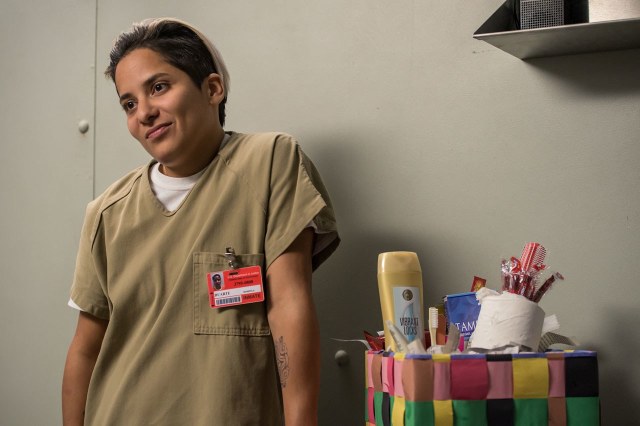
Yes Daddy I do
But here’s something even cuter than she already is: as reported by Crazzy Jazzy / oitnb spoilers account @ducky7goofy on twitter, Vicci Martinez is in an adorable girlfriend situation with actress/musician Emily Tarver. Tarver may not have been on The Voice, but I think we can all agree that she definitely has Gay Voice™
Y'all Daddy and McCullough are dating in real life! The guard/inmate ship of dreams #OITNB pic.twitter.com/fRDRlknwy6
— ducky7goofy (@ducky7goofy) July 29, 2018
Emily Tarver and Vicci Martinez have also been writing music and performing together since early 2018. That’s right: in addition to being girlfriends and having the same acting gig, they also create art together! They must really enjoy each other’s company and WE ARE HERE FOR IT.
33-year-old Vicci Martinez has been performing since the age of 16 and has around a dozen albums under her belt, some label-released and some self-released. She recently told The Tacoma News-Tribune that after a bad experience launching her own record label with two friends in 2014-2015, she hit rock bottom and ended up in rehab in 2016. By the time Orange is the New Black — a show she’d been a longtime fan of — called her in to audition for Daddy, she’d successfully turned her life around and was ready for her first-ever acting gig.
“We are super in love,” Martinez told The News-Tribune about Emily Tarver. “And we have a music group together. I’ve started to do music again. She’s fulfilling my fantasy of doing duets together.”
Tarver, who appears to also be very good friends with Beth Dover, aka Linda from Purchasing, has played CO Artesian McCullough since Season Four. She’s also a comic who performs with Upright Citizens Brigade in New York, and has appeared as the lead in the USA series DONNY! as well as having parts in Black-ish, The Big C, The Residuals and Best Week Ever.
Vicci Martinez recently told them.us that when she was cast as Daddy in Season Six, she was told her character would be embodying the ancient lesbian art of “getting straight girls to like you”:
When they gave me the part, they were like, ‘You gotta be able to convince straight girls to like you.’ One of the things I’ve done my whole life is getting straight girls to like me, and to end up going to the other side with me. That felt really familiar to me. I was born gay. It was something I just wanted to be accepted for, loving who I love. I am a girl who likes girls.
But she did them one better:
So I hear you met a special someone on set. Is that true?
Yeah. I made a straight girl go gay. [Laughs] Emily Tarver. It’s funny, because last night when we were watching the premiere, I wanted to fast forward to my backstory, and she was like, ‘No, you gotta watch me too.’ It’s fun, and being with somebody who gets this whole show was great. We’re making music together. Tonight, we’re going to do a show for a friend of mine to celebrate the premiere.
We look forward to every single future development of this Orange is the New Black power couple and also will be talking to you about our feelings on Season Six this week! Also; cheers to OITNB for introducing so many cast and crew members to the radical possibilities of a queer lifestyle!!!
TV Team Roundtable: How We Handle TV That Breaks Our Hearts (Or Makes Us Want to Break the TV)
Queer viewers are all very familiar with TV breaking our hearts and sending us into rage spirals. Sometimes it’s writers or showrunners tripping over tired cliches, or playing into harmful tropes; sometimes it’s writers and showrunners refusing to take responsibility for the fact that pop culture perceptions play an enormous — some would even argue the most influential — role in shaping public perceptions, and therefore politics and policy and just general quality of life for minorities in the world; sometimes it’s writers and showrunners simply refusing to listen. In this TV Team roundtable, Carmen Phillips, Natalie, Valerie Anne, Kayla Kumari Upadhyaya, Riese, and I are going to dig into how we handle the TV that lets us down, who’s getting it right, and what our breaking points are.
Heather: Are you able to personally enjoy TV shows, even if they have problematic elements?
Riese: I wrote “absolutely yes” and then realized that, well, there are probably exceptions. I mean I hate the word “problematic” but I feel like every show at some point goes there, and there tends to be a significant disconnect between The Discourse and Hollywood. I prefer to focus on the truly important things, like what happened to Kat’s luggage when she went straight from a cab from the airport to an event and how auditions actually work at prestigious theater conservatories like the legendary NYADA. Like I know there’s been some backlash at The Handmaid’s Tale this season for how gratuitous the violence against women has become, but the show itself is just such a work of art I can’t stop watching. If the entire premise is messed up, like 13 Reasons Why, it’s hard for me to stick around. But, sometimes I still do. Every show that’s on for more than two seasons is gonna screw up.
Carmen: The violence in season two of The Handmaid’s Tale really broke me! I couldn’t get past it.
Natalie: As the saying goes, “all your faves are problematic,” so I’ve just come to accept that nearly every show I love will have some problematic element (or elements) in it. Shows are crafted within the minds of humans who, however well-intentioned, will have blind spots or just screw up sometimes. As a critic, or even just as a fan, you have to decide where your line is, how many “screw ups” you can oblige before you just walk away.
I watched UnREAL‘s first season and loved it, but by season two, the show had so exceeded the bounds of what I could abide that I had to stop watching. Conversely, for years now I’ve been bothered by Jane the Virgin’s treatment of Luisa’s character, but my discontent about that has been mitigated by everything else that show does right so I can justify continuing to watch.
Kayla: I super agree with the sentiment that all your faves are problematic. TV shows pretty much never entirely transcend the racist, patriarchal, heteronormative institutions that they’re made within. I have the same issue with the way Jane The Virgin treats Luisa, but there’s so much I love about the show that I would never jump ship over that either. Of course I want progress and I want the shows I love to constantly strive to do better, but I also think that a lot of the time, the line is just so personal for people. I can’t watch Game Of Thrones anymore, but I am not going to tell someone that they’re wrong to still watch it/enjoy it. Sure, I might engage them in some sort of critical conversation, but I’m a TV critic! That’s what I do!

Forever problematic forever fave.
Valerie Anne: I think it depends on the problematic elements? There are so many shows out there now that I feel comfortable being a bit more discerning with what I choose to watch. For me, comedies are the shows I’m most likely to drop because of problematic jokes — if a show things even low-key homophobia, racism, or fatphobia is funny, we’re probably not compatible. But if a show is doing a lot of things right and does one thing wrong, I’m more likely to forgive than not. I think I have an unwritten three-strike style rule.
It also depends on how a show talks about an issue behind the scenes; if a show is saying “we fucked up” or “we realize now we could have done that better,” I’m much more inclined to give it a second chance than if they shrug it off or don’t address it. And also, if done right, some things that are bad on paper still work for me. Like my current problematic fave, Killing Eve.
Carmen: I was struggling how to answer this question, there are just so many competing variables that go into whether I can watch something “problematic” or not, but I think Valerie really hit the nail on the head for me! If a show makes a major blunder and can acknowledge their mistake, I am much more inclined to stick with it and encourage them to grow. I keep thinking back to Orange is the New Black. Poussey’s death is unforgivable. There is no excusing that, but the fact that Jenji Kohan and the writers’ room doubled down on making excuses as to why her death was politically necessary was cruel. It ruined the show for me.
And also, I’m talking about large scale mess ups. Television microaggressions mostly roll off of my back. There’s always a bigger fish to fry, you know?
Heather:I reached a breaking point last year with the kind of social media activism that loudly and incessantly insists that writing or talking about TV shows that have problematic elements — even if you’re clear-eyed and articulate about them— is a betrayal to the community, that we should just shut out (and shut up about) all TV that wrongs us in any way. And the reason I couldn’t abide that any longer is that most TV critics are straight white cis men who aren’t even seeing these problematic storytelling elements; certainly they’re not naming them in their reviews and recaps. I think it’s my responsibility to participate in these conversations, to be smart and funny and engaging inside of them, because being shut out of that circle of criticism cuts me off from ever trying to make change. How do y’all feel about that as critics?
Riese: I agree, I think it’s absurd when people think us not writing about a show is like an important protest vote or something? Seriously, that’s not how TV criticism works! That’s how a personal Tumblr works.
Kayla: AGREED. I didn’t get too much backlash, but there were some folks on Twitter who were not happy with me for recapping The 100 for Vulture. To which I say: First of all, I have bills to pay??????????? Second, don’t you want to have a queer woman of color who understands the context of this show’s missteps contributing to the conversation?
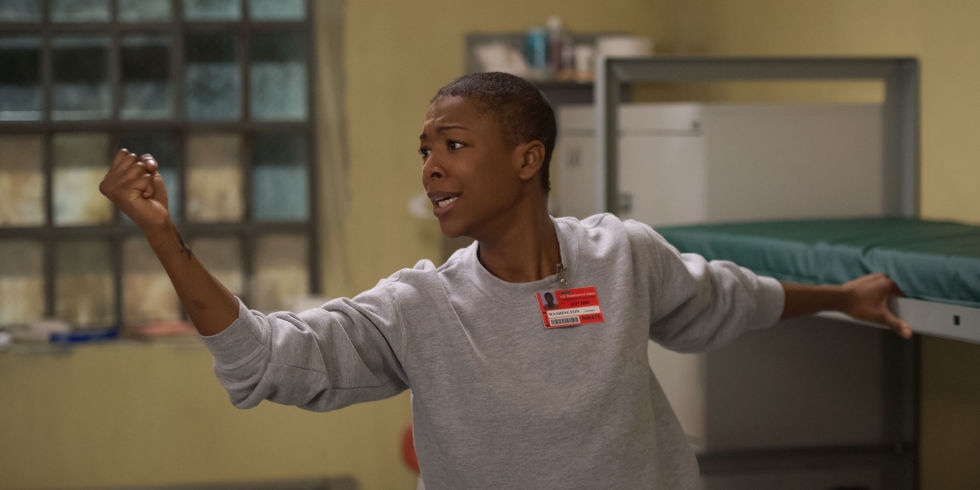
Just wait’ll I get my Emmy nod for The Handmaid’s Tale!
Valerie Anne: I agree, we have to keep talking about things. Boycotting entire TV shows isn’t going to make as much of a difference as discussing it critically and publicly. Boycotting reads as “oh some people didn’t like this” whereas discussing it can lead to “oh I didn’t realize why that might be harmful” and actually help others make better choices in the future.
Natalie: I agree with all of you. Honestly, I’m kind of mystified that this kind of thinking still exists. Maybe if we were still in a time where we were starved for representation, I’d understand that need to be overprotective, but, for where we are now, this just feels tremendously self-defeating.
Marlene King (the showrunner of Pretty Little Liars) is probably a bad example, but for the sake of argument, let’s imagine that she was the type of showrunner who responded well to constructive criticism. Imagine that she, after killing Maya St. Germain, didn’t dismiss the backlash as upset ‘shippers. What if she seriously considered that she had, however inadvertently, employed these awful tropes? Tropes that are rooted in an effort to minimize the role of LGBT people and people of color. If she had taken this lesson from the criticism over killing Maya, maybe she’s a bit more vigilant about avoiding harmful tropes going forward – maybe the mess surrounding Cece Drake wouldn’t have happened.
My interest, both as a fan and as a critic, is to push writers towards creating more authentic representation and away from recycled tropes. I’m interested in taking a writer’s work seriously — I imagine they put a lot of work into it — and offering a critique from a well-intentioned place. I hope more writers and fans learn to take it that way.
Heather: This is a great example, Natalie! Most people don’t know that you and I went from kind of knowing each other a little in TV recap comments to becoming internet acquaintances to becoming coworkers and friends because when Maya died, I was recapping Pretty Little Liars as a freelancer for a different website, and I also wrote it off in what you helped me see was a deliberately obtuse and callous way. I will never forget the message you sent me about it. It was smart and generous, but also really honest. It changed everything about the way I thought about my job. As soon as I had the ability to hire TV writers myself, I came to get you. If you had just quit me and my writing back then and not engaged with me or urged me to be clearer-eyed, there’s a good chance neither you or I would be doing what we’re doing right now! You should never have had to do that labor on me, but you did, and it changed things for both of us.
Carmen: Oh my God! I don’t really have anything to add, but that is the cutest and the best story!! I love knowing how we all found each other in this world.
Heather: Are there times when you’re willing to forgive TV for its mistakes and let it back into your good graces? Or, like Mr. Fitzwilliam Darcy, is your good opinion once lost, lost forever?
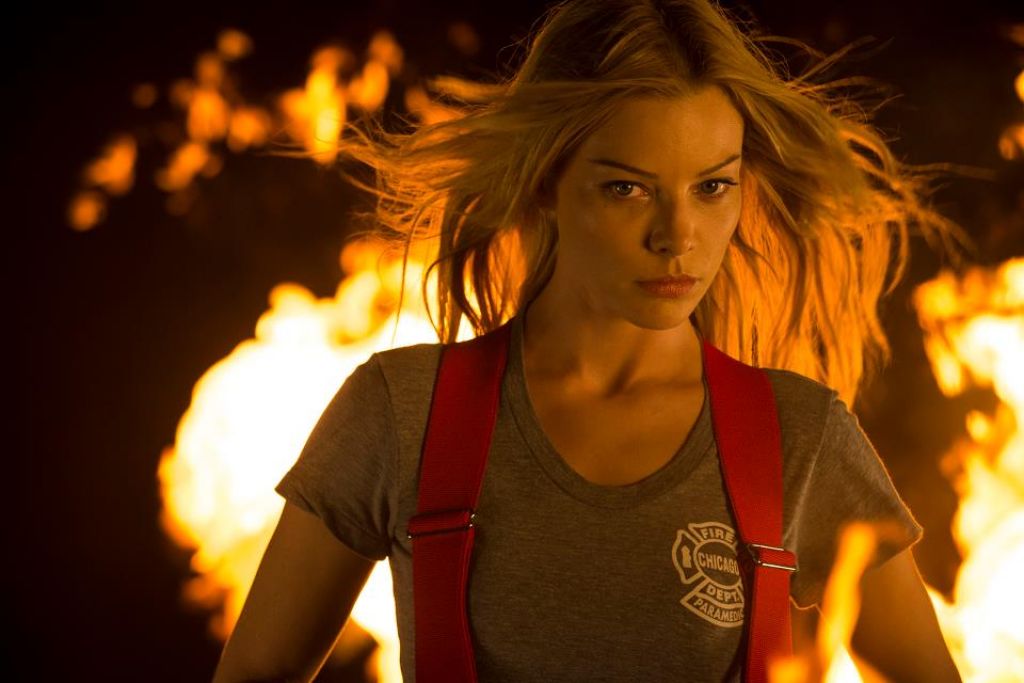
Too hot to handle, too gay to survive broadcast network primetime.
Valerie Anne: My aforementioned three-strike rule works like this: I’ll forgive and not forget a few times, but once I do get to the point of fully quitting a show, I don’t think I could ever go back. Maybe that’s why it takes so much for me to actively quit a show, because I know it’s forever, and I want to make sure I’m really, really done with it. The character assassination and then the literal assassination of Leslie Shay on Chicago Fire hit me so hard that I never even watched other shows in the franchise. I dropped it right then and there and never looked back. So I think my answer is yes I’m willing to forgive, but once a show is lost to me, it’s lost forever.
Carmen: I’m the exact same way! It takes a lot a lot for me to quit a show, but once I’ve cut ties I can’t go back.
Natalie: In most situations, I leave open the possibility of forgiveness. But that forgiveness isn’t just be given, it has to be earned. Forgiveness comes through acknowledging the screw-up and/or making amends for it in future storytelling. Like Valerie said, there are also just sometimes when you’ve got to cut bait and run. Sometimes the mistake is so egregious that it can’t be forgiven, like UnREAL’s second season, or where I have zero confidence in the writers’ abilities to right their wrongs, as with the aforementioned Chicago Fire (I don’t care how many times they try to entice me with a Sarah Shahi guest appearance, I will not do it).
Heather: You know it’s bad when even Sarah Shahi can’t tempt a queer audience to come back! Can you think of any good examples of shows that let you down but that ultimately righted its wrongs? Or got enough stuff right to make up for their wrongs?
Riese: I think Transparent really evolved because Jill Solloway is very tapped into The Community and I think did a good amount of balancing listening to feedback with trusting their own instincts. But Transparent never really let me down, so to speak, aside from the obvious off set issues. I think its authenticity is part of why people felt close enough to it to notice some of its problems and raise them. Jill and (I think) several of their family members are trans and/or queer, so they were just very willing from the start to imagine a world of majority queer people, even on a show focused on one family, and that will win me over every time. (Everyone being queer!)
Beyond that, basically I just want, I guess, every show that I like to have a lesbian or bisexual character. So I’m pleased when that happens. Like Jane the Virgin kinda sidelined Luisa, but then they made up for it with the Petra/JR thing. Glow and Riverdale added queers and made some present characters more queer, which delighted me. Honorable choices, those shows!
But if I’m only mildly sold on the show anyhow and they kill or otherwise bury a queer female character, like The Arrangement did, I’m done.
Valerie Anne: One of the most obvious examples I can think of is when Arrow literally unburied their gay. Sara Lance came back to life and went on to become the badass bisexual of our dreams and leader of her own band of time-traveling misfits. Also Legends of Tomorrow itself started off rocky, but then pivoted to make Sara the lead instead of Rip Hunter. It was a bold, but necessary move and truly improved the show. And it’s too early to say for sure, but Supergirl may be righting its wrongs. The last few episodes of the season seemed to be directly addressing its biggest flaws and I have newfound hope for next season.

We’re gonna make it after all (probably!).
Natalie: As I mentioned in our last roundtable, I think The Bold Type really tried to address questions that the audience had (myself included) about the way that Kat was written. They owned up to their mistake and tried to address it in episode 202. While I thought that episode was terrible, the fact that they addressed it at all was a positive step. This week’s Bold Type episode, I thought, took a step beyond that. So, not only had they heard the criticism, but they really learned from it. I think that’s just the ideal situation and I hope that other writers and showrunners really learn from the example The Bold Type has set.
Grey’s Anatomy is another show that I let go of for several seasons, after the disappointment of watching Erica Hahn disappear in the Seattle Grace parking lot. I’d lost a character who I’d come to see part of myself in – and who gave me one favorite scenes of television, ever. She’d been ousted and replaced by a younger, perkier model. It just felt wrong to indulge in it, no matter how much I still loved Callie Torres. Eventually, I found my way back because it was clear they were still invested in telling Callie’s story and… well… they let Sara Ramirez sing on primetime TV.
Carmen: Let me just pop right back in here, because we can’t talk about Sara Ramirez in the Grey’s Anatomy musical episode without me showing up to squeal about it a little. It’s my bat signal. SQUEAL!!! SARA RAMIREZ IS SO TALENTED AND DESERVES EVERY GOOD THING IN THIS WORLD!! Yes, that was in all caps. I don’t care. She deserves EVERY GOOD THING. Okay, as you were.
Heather:I’m actually not very much of a come-back person, in real life or in TV life, but I think that’s because it takes me sooooo long to finally lose my patience with something or someone — like you gotta really push and push and push and push for me to snap — and once that finally happens, I’m like, “Okay, well, forget it FOREVER.”
Kayla: Haha, I almost always come back! What does that say about me!!!! I think the most extreme example is American Horror Story, which I have said I will “never watch again” probably at least seven times over the course of its run? And yet, I always come back. And not even because they fixed anything! Ryan Murphy just dangles Sarah Paulson in front of me, and I’m like SOLD. (The only season I didn’t finish was AHS: Hotel.) But as for shows that have kind of addressed previous problems, I agree that The Bold Type is making some strides. Grey’s Anatomy always brings me back, too, somehow.
Riese: Oh yeah, AHS. Freakshow and Hotel I both quit because the gore and the violence and the sexual assault was more than I could handle. But each season is its own beast so I usually give each new one a chance. Unless, say, it’s a season about a witch coven THAT SOMEHOW HAS NO QUEER FEMALE CHARACTERS IN IT.
Carmen: I’m probably going to yelled at in the comments for this, but I think Once Upon a Time finally got their act together in their last season. Not only did they fix the show’s glaring whiteness problem by casting an Afro-Latina actress, Dania Ramirez, as their new Cinderella and incorporating Princess Tiana into the show’s main cast, they also finally wrote a compelling main character gay romance. I could have watched five more seasons of Robin Hood and Alice of Wonderland falling love. They were adventurous and quirky and kind to each other. They were everything that the show had previously done so well with their successful straight romances, proving what I knew all along – the writers could do it, if they only had tried.
I know that a lot of Once’s queer fandom was #SwanQueen or bust, and I respect that. Also, the timing of when they fixed their problem reeks of “too little, too late.” There’s no getting around it. I don’t think it was ultimately enough to right their many seasons long legacy of wrong, but they did eventually get there. I think it’s an important asterisk on that show’s legacy.

This is the exact moment you should quit watching Skins FOREVER.
Heather: What are your absolute TV deal breakers?
For me, if a male showrunner or writer talks over me to try to tell me or any other queer woman how it is, I’m out. I will never forget this one show creator emailing me to tell me how naive I was because he’d had a lesbian friend, okay, and according to her, lesbians do, in fact, die, and so that’s why this character died because it happens in real life and I was a child if I didn’t acknowledge mortality. I also agree with what Valerie said earlier about comedy. I don’t watch shows that make minorities the butt of their jokes, ever. Violence against women is also something I can’t deal with — which is a real pickle as a critic because prestige TV shows sure do like rape.
Riese: Not having lesbian or bisexual characters, first and FOREMOST. I mean, there’s a lot of shows I watch for queer storylines and if they stop having queer storylines, even if the queer character is still there, I often drop off. Also, consistently bad storytelling. Though I might not have a real deal breaker!
Valerie Anne: I don’t know if I have any hard and fast, “you do this you’re 100% out” deal breakers. Except for the types of jokes I mentioned before. I track my TV shows on Sidereel (nerd) and I do have a list called “half-heartedly quit for now” for shows that I’m just so far behind on that catching up feels like a chore because they stopped bringing me that excited joy of having a new episode of a show I love. And it’s not usually because of a thing they did; usually it’s things they DIDN’T do. Like Riese said, not having queer characters is one reason I might drift off a show. Also sorry/not sorry but Too Many Dudes is a non-starter for me.
Natalie: It’s hard for me to pinpoint just one thing; it’s one of those things that you just know instinctively when you see it. That said, I am growing increasingly tired of the male savior trope and of writers who subject their characters to awful fates just so other characters, and by extension, the audience, can learn something. Nope, nope, nope. I’m tired of it, and there’s too much good TV on for me to continue to subject myself to these god awful tropes.
Carmen: Ha! Would it be wrong for me to shout out Orange is the New Black here? Oh well, I’m gonna do it anyway!
Kayla: I’m not really sure I have a concrete deal breaker (other than just like, something that’s really terribly written?), but I do have limits when it comes to sexual violence. Two shows that I have successfully stopped watching are Game Of Thrones and UnREAL. I’m not sure what the latter could do to get me back, but as for GOT, the only way in hell I would watch the final season (and the seasons I’ve missed before it) is if all six of the final episodes were written AND directed by women, so… it’s never gonna happen.
Carmen: My biggest deal breaker by far is what I call “the sad, angry white male anti-hero.” I’ve never seen Breaking Bad or Mad Men and I have no interest thank you. (Wait, I have seen parts of Mad Men that related to Christina Hendricks or Elizabeth Moss, but that’s it.) I watched and loved The Sopranos and that was pretty much my fill of the entire genre. That means I miss a lot of “prestige” television, but guess what? I’m fine with that. I’d rather be told a thousand stories about women, and I schedule my television priorities accordingly. Also, I’m like so many other folks in this roundtable, I can’t abide strong violence against women. I’ve never seen Games of Thrones and I never will. While I think the work that they’re doing is important, it would take a lot for me to stomach going back to Handmaid’s Tale
Heather: What TV shows have let you down the most?
Riese: The L Word, obviously. My first love. You’re always gonna have a special spot in your heart for your first love and all the mixed-up feelings they gave you, and how they hurt you. It was the first show I watched and wrote about as a critic — I was surprisingly very uncritical of it before it became my “job.” Still, there’s so much I didn’t notice or criticize that I would now, although I also love it dearly, and always will.
Then, you know. You know! Glee.
And finally, Orange is the New Black. I loved it so much and there’s so much talent on that show, so many queer characters, so racially diverse. Killing Poussey how they did and for the reasons they did was just a really terrible move. It also further cast light on a lot of issues the show already had about race. I still watch it, but nobody else does anymore! We actually asked about what shows people watched on our reader survey last year, and included an option for “I used to but I don’t anymore” and 52% said they watched OITNB and 36% said they used to but not anymore! The next-highest “I used to watch this but don’t anymore” was Pretty Little Liars (28%), then Grey’s Anatomy (25%) (but I mean it’s been on for so long, it shouldn’t count), The Fosters (21%) and then nothing else was over 15%. So that’s a lot! How did I turn this into a data conversation?
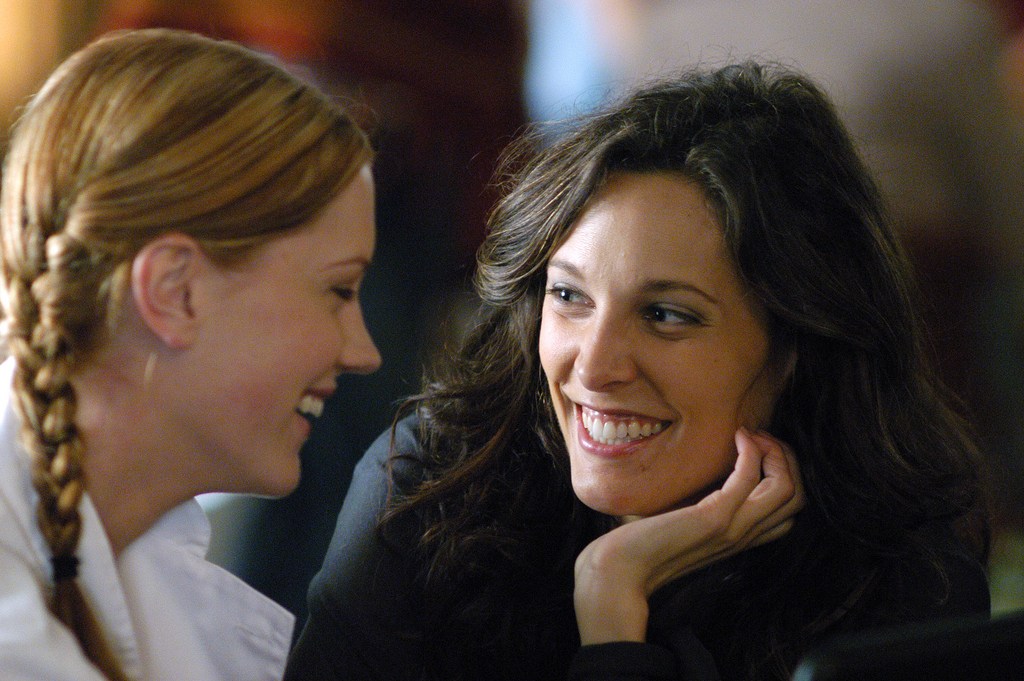
#NeverForget
Carmen: Riese! One of my favorite things about you is how you can turn any conversation into an Autostraddle Data Conversation! That’s one of your superpowers! (Also, I still watch every single show on that “Used To Watch List”, or at least I watched them until their final series finale. I really don’t break up with television easily. That’s something to know about me.)
Valerie Anne: There are a lot of shows that really let me down in the last season(s). Pretty Little Liars, Warehouse 13, Glee. One of my biggest heartbreaks was Once Upon a Time. The first season of that show was so fun and original and then slowly, but surely descended into garbage.
Heather: Riese, one of the most formative moments in my life as a critical thinker about TV was when you started writing about how messed up and also just factually inaccurate Max’s pregnancy storyline was on The L Word. We were definitely in a time, as a culture, when it was realllllly tricky to criticize the very few shows putting queer women on TV, but you were just like, “Okay. Enough. This is honestly dangerous at this point.” And you did it when you were just starting out; you didn’t have the clout and prestige you do today as the leader of Autostraddle.
For me, it’s Pretty Little Liars and Skins. My attachment to those shows was personal because I wrote about them, but more than that, I had so many conversations with the people who made those shows and I know for a fact the writers read so much of what I wrote, so the fact that they understood where they were messing up but continued to do so, it breaks my heart. Also I’ll echo what everyone has said about Orange Is the New Black. Killing Poussey was already egregious but what came after — both in PR and storytelling — was beyond the pale.
Carmen: I’ve name dropped them a thousand times, but I do not care, my answer to this question forever and always will be Orange is the New Black. If I think too long about it, I still can physical stomach pains over what they did to Poussey. And that was, like two years ago now? I’m still not over it and I probably never will be. We’ve written a lot about why those storytelling decisions were so awful, so I won’t rehash it all here (but feel free to read it for yourself: here, here, here, and here). I will love that cast forever and will support them in whatever they do, but Jenji Kohan is going to have one hell of a hill in getting me to watch one of her shows ever again. I still haven’t seen Glow.
I haven’t broken up with it yet, but Queen Sugar has made some awful decisions surrounding erasing Nova Bordelon’s sexuality in its second and third seasons. This one is more of a personal burn for me, because there are heartbreakingly few shows with a majority black cast and black audience to include a queer woman protagonist. Queen Sugar is breathtakingly directed and written, it can hold its own against any other prestige television show. But it gets very little media shine, because it’s a black production on OWN. I gave it my whole entire heart (my love for it was so epic that it became the show that got me this job on Autostraddle). It’s still all of those things, but the decision to have Nova not even reference her sexuality in the last two years is a very big pill that they keep expecting me to swallow.
Natalie: Yes, Carmen, PREACH! What Queen Sugar is doing with Nova has been the bitterest pill, especially since the character wasn’t queer in the source material and they specifically made her that way to create visibility for black queer women. Now, it’s gone. Ava, you just won a GLAAD Award, what are you doing?!
Heather: Who do you think is getting it right?
Riese: When it comes to shows w/queer characters? One Mississippi BEFORE IT WAS CANCELLED. Okay I won’t talk about other cancelled shows, I just remembered that one suddenly and my heart hurt. Currently: Vida, One Day at a Time, Fresh Off The Boat. I think Transparent does, mostly, although we all well, yes. Okay. High Maintenance! Don’t sleep on that show, y’all. Pose. Although I wish one of the women on the show was a lesbian or bisexual. Just saying. (It’s a Ryan Murphy show, so it’ll happen eventually. I really want Angel to be bi!) I feel like one thing you can count on, along with planets rotating around each other as they will, is Degrassi usually getting shit right.
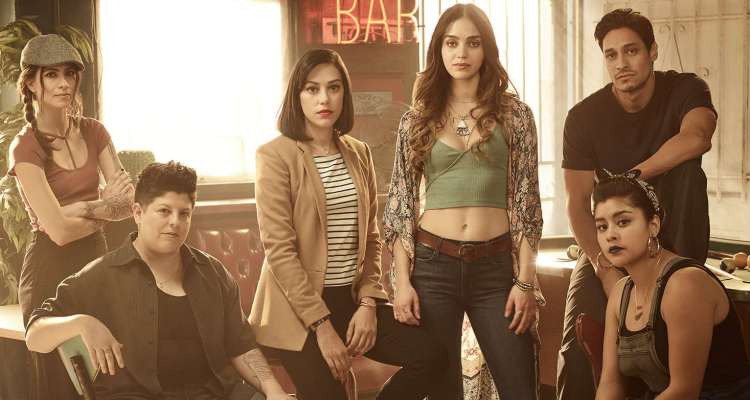
Your move, TLW reboot.
Valerie Anne: It should surprise no one that the first show that came to mind for this is Wynonna Earp. The Bold Type is getting a lot of things right. Orphan Black got it right. Legends of Tomorrow. Brooklyn Nine-Nine. All the ones Riese mentioned. (And I want to specifically call out Fresh Off the Boat because I feel like not enough of you are watching that one and you SHOULD BE.) Have I mentioned Wynonna Earp? Because Wynonna Earp.
Kayla: I think Vida’s first season was goddamn near perfect. And I know we talk about it a lot here on Autostraddle but I wish it was being more talked about at large, and I really wish it would get awards play but I am worried that it won’t!!!! I second all the shows Riese and Valerie said but also want to throw Superstore into the mix!
Heather: I don’t think it’s any surprise that the shows getting it most right are doing so because of queer and trans women and women of color. One Day at a Time, Vida, Pose, Fresh Off the Boat, Master of None (specifically I am talking about the Thanksgiving episode, of course) and even Brooklyn Nine-Nine, because even though Stephanie Beatriz isn’t a writer, her real life coming out and then openness about her bisexuality is what compelled the writers to reach out to her to help them craft a coming out story for Rosa. You see that on Madam Secretary with Sara Ramirez too, right? These women who are out, who are dialed in, and who are ready to take responsibility for the fact that stories shape the public perception of minorities, and those perceptions have an enormous impact on our political and cultural realities.
Natalie: That’s a great point, Heather! I think all those writers’ room excel at telling complex, intersectional stories because so many of the writers’ lead lives that exist on those intersections. There’s an impulse among writers to believe that because they’re creative, they can imagine the stories of women, LGBT people or women of color – and 99 times out of 100, it just doesn’t work. As creative as Ryan Murphy is, he could never in his life have crafted the world Janet Mock and Our Lady J have built for the trans women on Pose. That show, Vida, One Day at a Time have all shown us that to tell authentic stories, we should empower writers who have lived the lives of our favorite characters.
Carmen: I’m calling it now, 2018 is the year of queer and trans women of color on TV! The list just keeps growing: Vida, One Day at a Time (who have both also put their money where they mouth is in terms of off-screen activism as well, so I will never stop singing their praises and doing whatever I can to keep them on air), but also Pose and as Heather mentioned even B99 and Madam Secretary. We are out there in the world, telling our stories, and every time it happens my heart bursts wide open all over again.
We’d love to hear from our esteemed readers in the comments! No one knows queer TV better than you. How do you handle it when TV lets you down? Who has successfully turned it around? Who do you think is getting it right?
Gay Hairplay: Top 11 Times a Girl Touched Another Girl’s Hair on TV and Film
Lesbian and bisexual gal pals caressing each other’s hair on TV and in movies has gotten a bad rap, probably because that’s what most fictional queer women have historically done instead of kissing on the mouth. But times are changing and women are actually having sex onscreen and when I was watching Marvel’s Runaways I was reminded that hairplay, when done right, can make a little gay heart hammer right out of its chest. It’s tender and flirty and intimate and it almost always betrays deep longing or leads to full-on smooching. And it turns out other people love this thing too! Staff Writers Valerie Anne, Kayla, and Carmen Phillips helped me assemble this list of the top 11 times a girl touched another girl’s hair on TV and in movies.
Gail and Holly, Rookie Blue
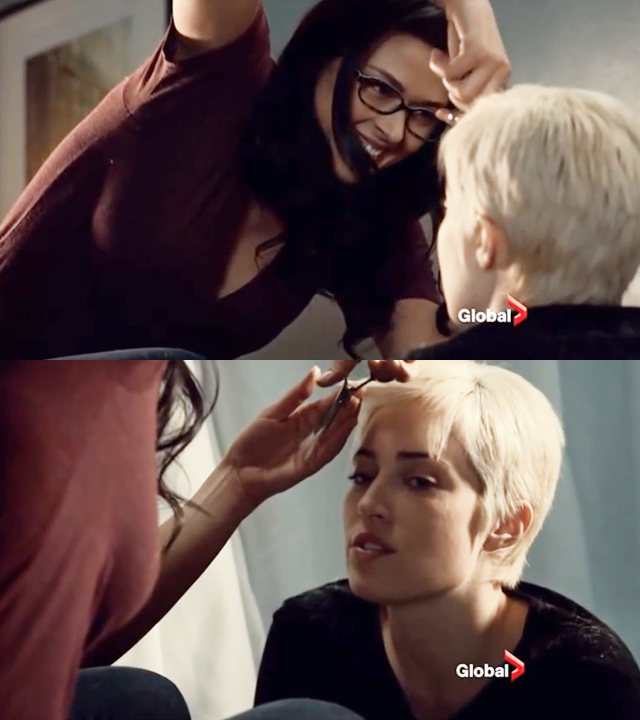
This is just Gail getting herself a soft butch haircut from the girl she’s in love with before that girl sliiides right down into the bathtub to make out with her face.
Yorkie and Kelly, Black Mirror “San Junipero”

“Please make this easy for me” is one of the sexiest things I have ever heard anyone say on television, and Kelly thinks so too. She caresses Yorkie’s hair and then immediately asks her to get into her car and go home with her.
Poussey, Orange Is the New Black
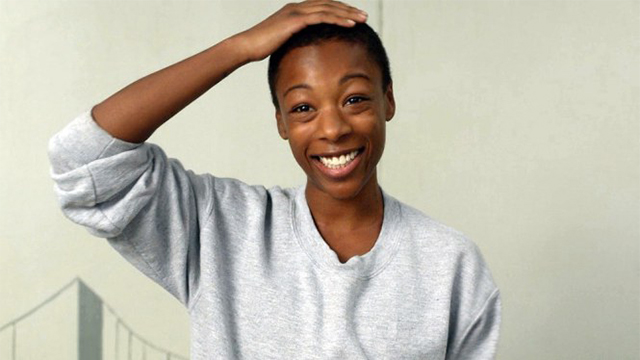
Carmen Phillips: “Does it count if the fictional lesbian in question is using her hair to flirt with me? Because what other reason would there be for Poussey doing this? Poussey knew what she was doing.”
Karma and Amy, Faking It
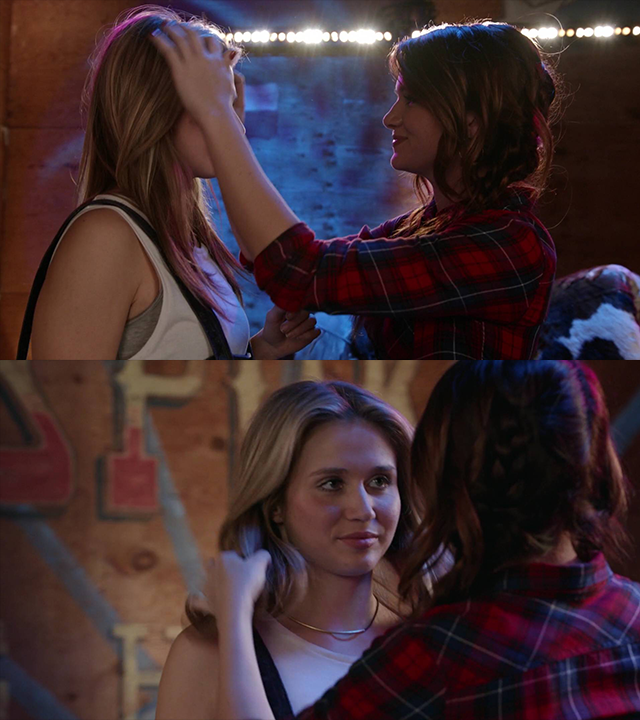
This moment in Faking It‘s second season, after Amy and Karma got thrown from their mechanical bull and Karma pulled Amy to her feet and sweetly, gently, fondly fixed her hair — it’s the one time I thought for absolute sure that Karma wasn’t kidding around, that she felt it too. (Amy thought it even more than I did.)
Carol and Therese, Carol

Up until Waterloo, Carol hadn’t deliberately touched Therese. They shared a close and coy moment with President McKinley but on New Year’s Eve she just walked right out of the bathroom, took a swig of beer, caressed Therese’s hair, gazed at her in the mirror, and then went right ahead and untied that robe.
Billie Jean and Marilyn, Battle of the Sexes
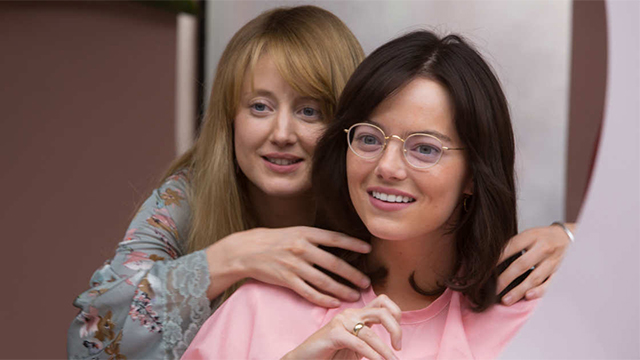
I’ve never felt weird watching a sex scene in a crowded movie theater, but watching Marilyn cut Billie Jean’s hair made me feel like crawling out of my own skin. It was so deeply intimate and sexy and sweet and also like watching someone get born. I still get shivers when I think about it, which may also be because this scene was filmed like an ASMR video on purpose.
Karolina and Nico, Marvel’s Runaways
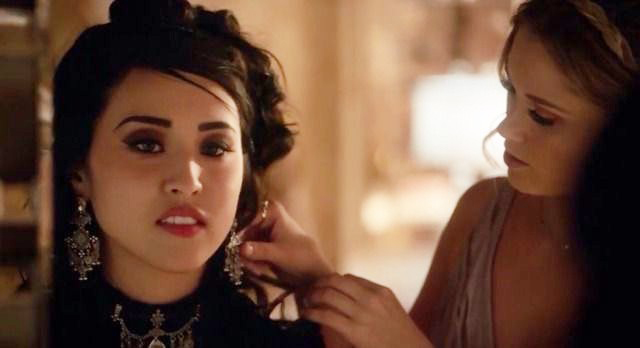
After getting ready with Nico — in the same mirror! —Karolina reached up to help fix her hair and was buzzing with so much gayness by then I’m surprised she didn’t explode into a shower of rainbow glitter, even with her magic bracelet.
Naomi and Emily, Skins
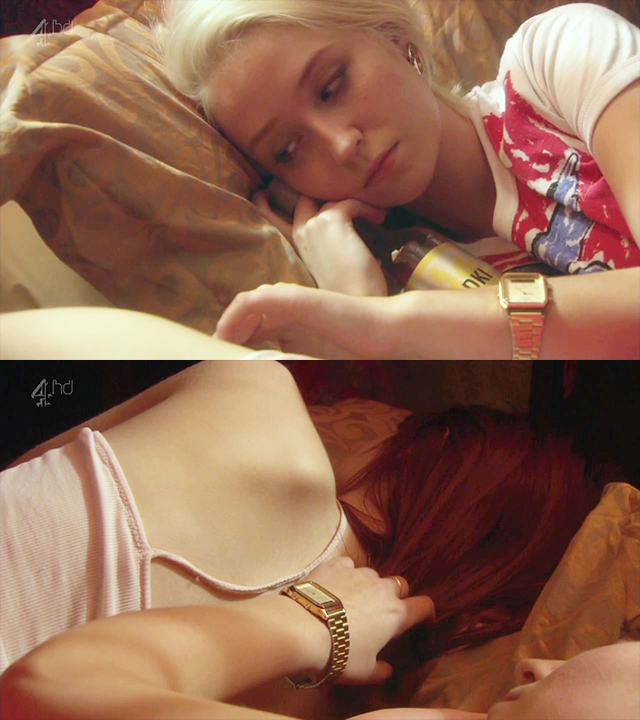
This is one of my all-time favorite TV moments. After pushing and pushing and pushing Emily away, Naomi woke up beside her and before she even realized what she was doing she reached out to caress Emily’s hair. And then she woke up for real and bolted out of her bedroom like her pants were on fire. (But not Skins Fire; that doesn’t even exist.)
Shane and Cherie Jaffe, The L Word
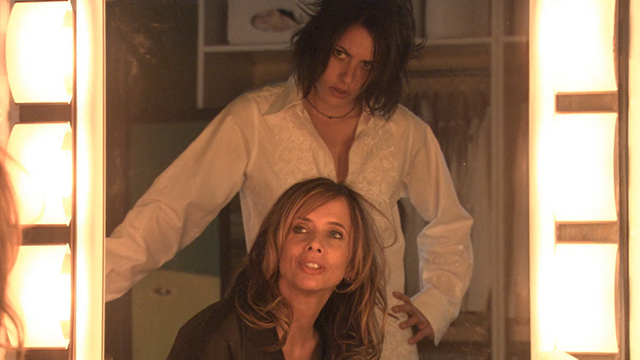
When Shane touched Cherie Jaffe’s hair and asked her how she wanted it styled, Cherie simply said, “something different.” And by different she meant: GAY. Shane never did cut her hair but they did plenty of scissoring.
Root and Shaw, Person of Interest
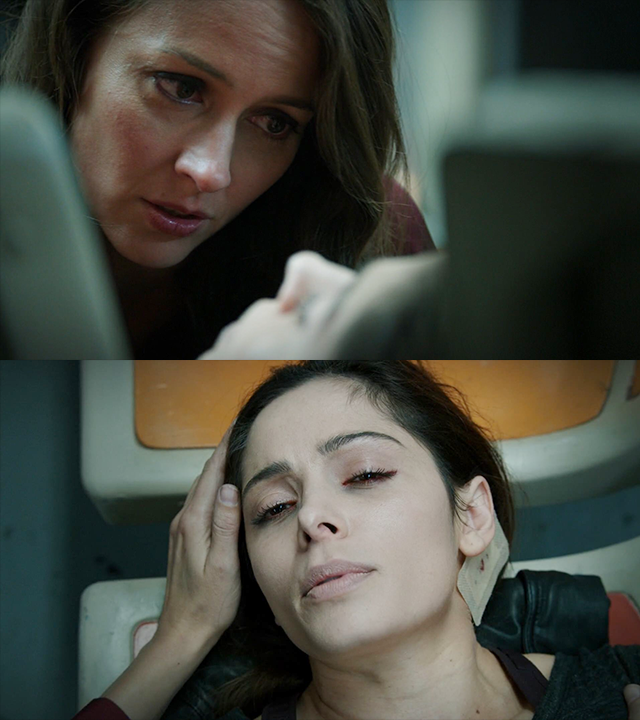
Look, just because someone is caressing your hair so they can reach around with their other hand and remove a brain implant from behind your ear with a razor blade doesn’t mean they’re not also caressing your hair because they love you.
Stef and Lena, The Fosters
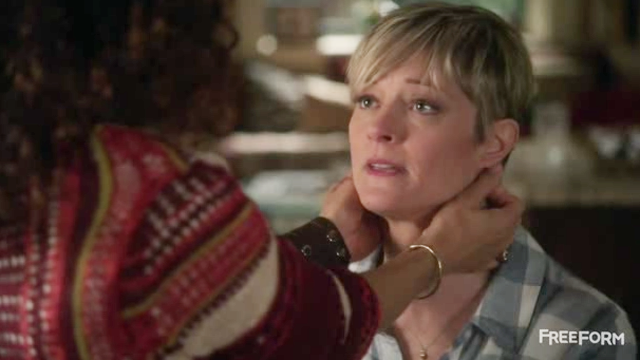
Lena was surprised when Stef chopped off her hair, and Stef was nervous to show it to her, but she did it because she was tired of the words “dyke” and “butch” having power over her and Lena got that and thought Stef looked sexier than ever. Lena tugged her new hair, played with it sweetly, and then dragged her wife right off to bed.
What’d I miss? Let me see those GIFs!
In 2017, Lesbian and Bisexual TV Characters Did Pretty OK, and That’s a Pretty Big Deal
Although most Quality of Life indicators for LGBTQ people and civilization in general nose-dived this year, one thing got notably better: television for queer women.
Granted, the bar was low.
For decades, we settled for relative invisibility, unsatisfying subtext and brief storylines buried within otherwise deficient programs, but that had started changing, along with the culture at large — and then 2016 happened. In 2015 and 2016, hoards of bisexual and lesbian characters were seemingly invented just to get murdered, like our own private Westworld (but with a lot more queers than actual Westworld), and several queer fan favorites met their untimely deaths. But “Bury Your Gays” was never the problem so much as a symptom of the disease; a virus that evolved from decades of tragic, small, desexualized, evil or sidelined queer characters into a new dawn where finally we were allowed to exist, as long as we didn’t take up too much space or live for too long.
More Shows, More Lesbians and Bisexuals
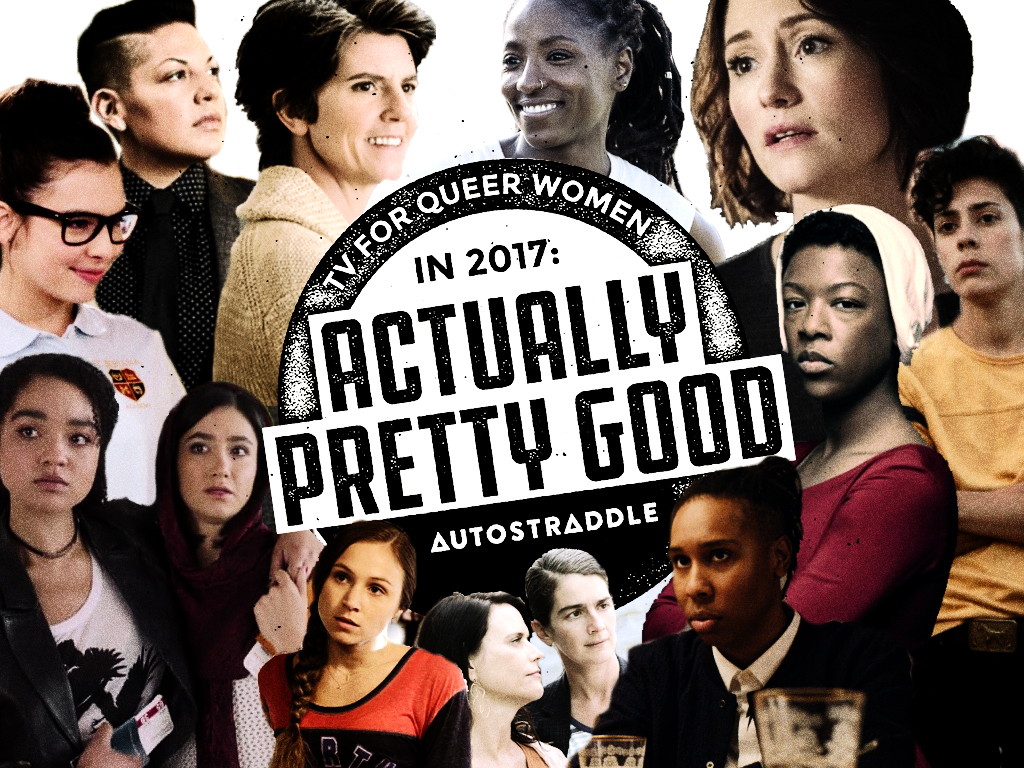
The most surprising aspect of putting together the list of 193 Dead Lesbian or Bisexual Characters last year wasn’t, actually, the death count. It was being made aware that we weren’t, as we’d thought, aware of every show featuring lesbian/bi characters out there. We didn’t know they’d lived, let alone died!
Peak TV was in full swing, and we were benefiting. There were 455 scripted original shows released in the US in 2016, a steady climb from 182 in 2009. In their 2010/2011 report, GLAAD found 53 LGBT characters on scripted cable shows, and only 34% were women. In 2017/2018, that number had increased to 173 (49% women), plus 70 more on streaming networks (66% women).
The growth of cable, streaming and on-demand technology has eased our ability to access a vast programming roster often more accountable to its audience than advertisers. Whereas in 2010, it was revolutionary for Pretty Little Liars‘ lesbian character to make it through an entire season without returning to heterosexuality, by 2016, we were confident enough to criticize its employment of damaging trans tropes and the diminishing screen time offered to Emily’s romances. Quantity wasn’t enough anymore. We wanted quality, and we wanted it now… and in 2017, we started getting it.
But before we get into that, let’s go back in time a little bit.
The Torrid Herstory of Lesbian & Bisexual Women On TV
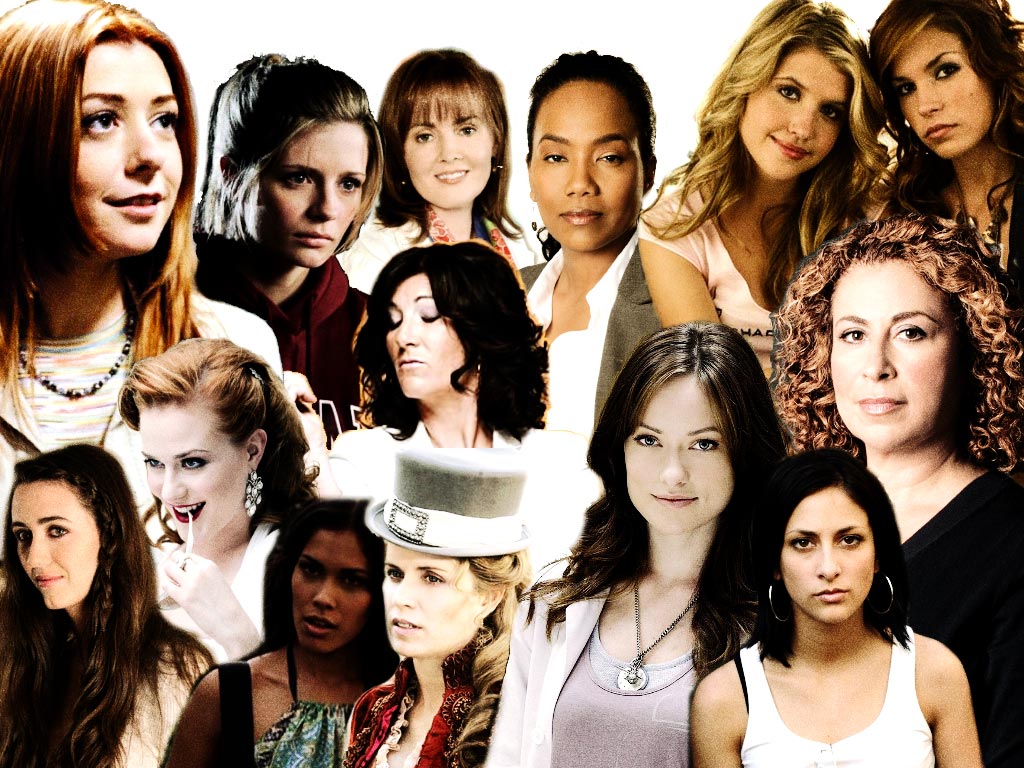
While gay men certainly aren’t winning television, they’ve always been more represented than gay women, often accounting for 65%-75% of LGBT characters.
Throughout the ’90s and early ’00s, women-loving-women were rare, precious, elusive creatures: a little Ellen or Nancy here, some gay-but-not-too-gay doctor or lawyer there. From the mid-’00s through the early ’10s, we generally found lesbian and bisexual characters in one of seven places:
1. Secondary or sweeps week storylines on a teen primetime soap (The OC, 90210, Once and Again, Secret Life of the American Teenager, Gossip Girl)
2. Regular or recurring spots on a network ensemble program with minimal screen time devoted to girl-on-girl romance (ER, Bones, House, Rookie Blue, The Good Wife) (The Wire is a rare premium cable drama that fits into this category.)
3. Recurring or guest roles on a prestige drama (Mad Men, Six Feet Under, Heroes, Deadwood, Rome, Boardwalk Empire)
4. Queer-targeted series like The L Word (2004-2009), Lip Service (2010-2012), South of Nowhere (2005-2008), Dante’s Cove (2004-2007), Queer as Folk (2000-2005), Exes and Ohs (2007 & 2011).
5. The latest Degrassi iteration
6. A Ryan Murphy project
7. Diamonds in the mainstream rough, like Buffy the Vampire Slayer, True Blood or Skins.
When we lost a Category 4 Show — and we lost ’em all by 2012 — the number of lesbian and bisexual characters on TV would come tumbling down. (Faking It is a rare example of a more recent Category 4-ish show, which lasted three short seasons.) Ilene Chaiken told Entertainment Weekly earlier this year that after The L Word went off the air in 2009, “I think a lot of people thought, ‘Okay, the baton is passed now, and there will be lots of shows that portray lesbian life.’ There’s really nothing.”
Things began shifting in the early ’10s following the success of a few stand-out programs with front-and-center lesbians and bisexual women like Glee, Skins, The Fosters, Lost Girl and Pretty Little Liars. Glee, particularly, challenged the commonly accepted practice of tightly curtailing the queers-per-show quota. Sadly, it’s likely that 2010’s stream of press-garnering gay teen suicides played a role, too — we needed our stories in order to live and we needed happy endings to believe that things could really get better, and many media-makers answered that call, some better than others. In 2013 on Grey’s Anatomy, Callie and Arizona did the unthinkable by having multi-season lesbian relationship on network TV.
Groups like One Million Moms, The Parents Television Council and the Florida Family Association, who regularly rallied against LGBTQ inclusion and pressured advertisers to drop support, faded into the political background, drowned out by our increasing Civil Rights and the ever-more-powerful media representation advocacy organization GLAAD. Teen-oriented networks like The CW, ABC Family and MTV learned they could safely produce this content and easily earn massive free buzz from social media platforms, GLAAD, and websites like ours.
How we watch television has also changed how television gets made — whereas an ’80s sitcom scored big if it could entertain an entire family at 8 PM on a Tuesday, shows these days can thrive by attracting significant numbers of solo laptop viewers. Syndication contracts, which provided lengthy profit streams, favored backstory-lite formats like sitcoms and procedurals. Now, shows can earn a solid shot at an afterlife with a plot so compelling you’re likely to Netflix-binge 15 nail-biting episodes at once.
Although high-concept television has flourished in this new era, it rarely featured queer women. Prestige TV has always privileged male-centric shows generally, and male antiheros specifically (e.g., The Sopranos, Breaking Bad, Mad Men). On this track, the shift began in 2013. That’s when Orange is the New Black, a series with a racially diverse cast that showcased more queer love stories than straight ones and centered a bisexual protagonist, topped every “Best Of” list and demolished expectations on social media. Just as The L Word’s rise was enabled by the growth of online communities like fansites and AfterEllen, OITNB hit the market just as wealthy companies like HuffPo and Buzzfeed launched LGBTQ verticals, which quickly filled with OITNB-adjacent content. Transparent, in 2014, sealed the deal OITNB started — a trans woman lead presiding over an entirely queer ensemble put Amazon Prime on the map, racked up Emmys, and challenged previous conceptions of what was considered “too niche” to get made.
But in 2016, GLAAD’s annual report revealed that lesbian representation had gone down for the first time since 2004, and “while bisexual women are getting a small boost in visibility, it’s often coming at the cost of damaging cliche.” Our Senior Editor Heather Hogan called 2016 “the most frustrating year ever for queer women who love television,” even compared to years when we had “hardly any TV representation at all.” Every year for the last ten, we’d seen more and better portrayals of queer women on television, but “Lexa’s death, and the landslide of lesbian/bi deaths that came after it, were crushing because they shook the hope out of us.”
What Got Better For Lesbian and Bisexual TV Characters in 2017
I’ve spent the year building a database of every lesbian, gay and bisexual teevee character ever on English-language programming accessible on U.S platforms, and the past two months looking at 2017 specifically, finding 116 total shows with LBQ regular/recurring characters, compared to 80 in 2016. (From here on, I’ll abbreviate “Regular or Recurring Characters” as “R/Rs.”) 39 new shows in 2017 had lesbian and bisexual R/Rs, and five returning shows that previously lacked lesbian and bisexual R/Rs, added them; compared to 16 new shows and five returning in 2016.
Those 116 shows accounted for 105 lesbian and 99 non-monosexual R/R characters. These shows also featured 10 trans women (straight or queer) and non-binary R/Rs. (Four shows that included non-binary characters or straight trans characters but no lesbian/bisexual cis or trans female characters were not part of the database count, but they are discussed in the trans section later in this post.)
I personally watched 51 of these shows, and other team members bring the “Autostraddle saw this show” count to 83. For the rest, I relied on recaps and reviews from other sites, YouTube clips, wikipedia, show-specific wikis, and databases (specifically this one and this one).
Then, we made you this infographic:

infographic by sarah sarwar
The movement that started when Lexa died put LGBTQ women in the spotlight. So far this year, we’ve lost less than a dozen R/Rs to stray bullets and wayward stabbings, and of those, only two were potential 2018 regulars, as the majority occurred on anthology series. In 2016, LGBTQ viewers pointed out a persistent unconscious bias and also made it known that queer fandom is absolutely nuts about our teevee, we’re tired of being exploited and we’re happy to give praise where praise is due. Did showrunners choose to let queer characters live? Maybe shitty shows stopped inventing new queers just to kill them. Maybe good shows began negotiating potential lesbian/bisexual deaths with the same careful consideration they do straight ones. Whatever the reason, it feels like we’re finally getting somewhere.
Because moreso than a lack of death, 2017 gave us a tiny burst of life — myriad disappointments, to be sure, but small steps in the right direction too.
Also, everyone is gay and so every television show should be about us, the end.
Lesbian and Bisexual TV In 2017: Highlights
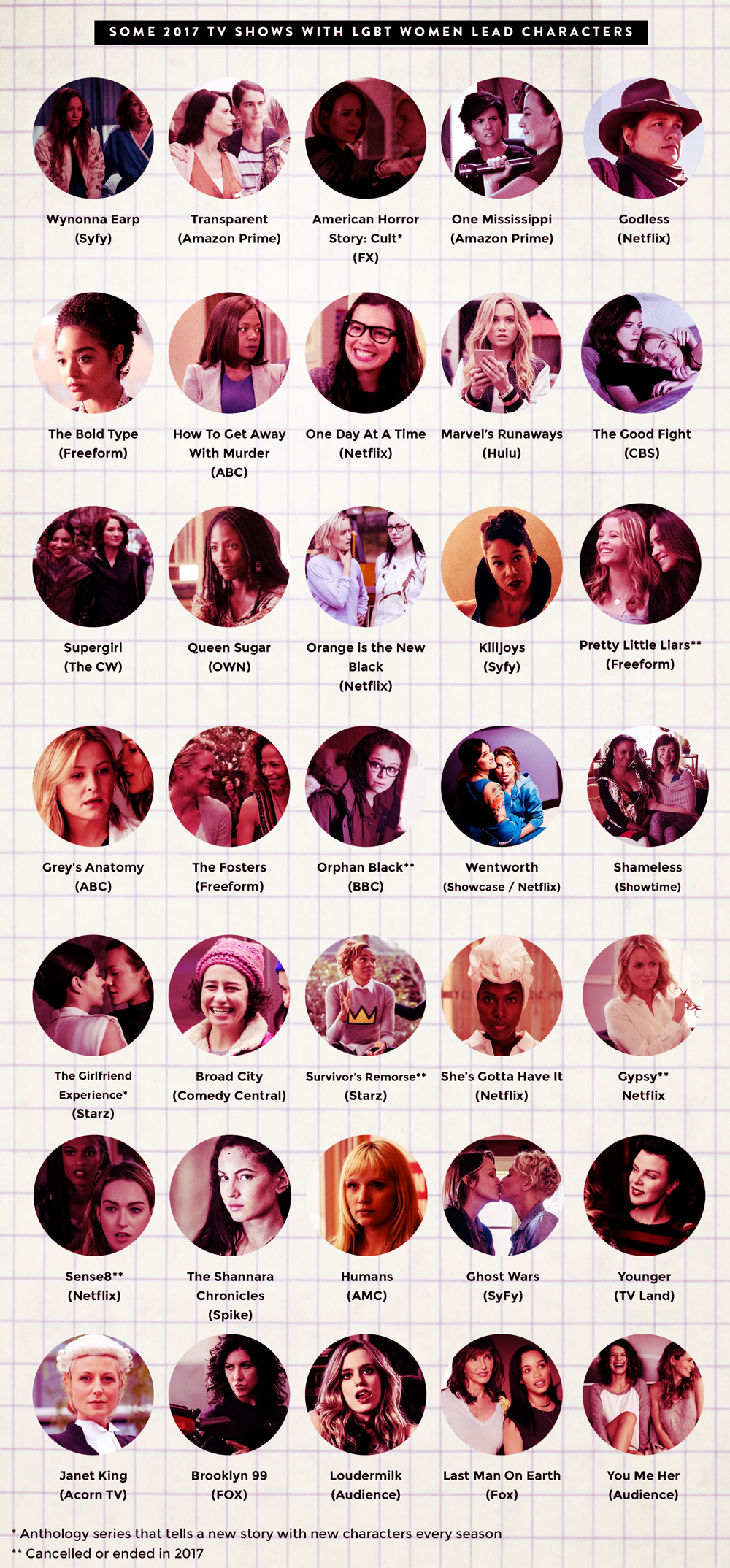
2017 opened with the charming, surprisingly captivating multi-cam sitcom remake of Norman Lear’s 1975 feminist show One Day at a Time, re-packaged as a story of a Latinx family with 14-year-old Elena struggling to come out to herself and her family (who tried brushing up on lesbian lingo by checking out Autostraddle.com). The LGBT history mini-series, When We Rise, debuted in February, and although its mediocrity excludes it from “Golden Age” territory, it’s very existence was an important milestone.
The second season of UK TV series Humans hit the states in February, opening its first episode with the beginnings of a lesbian love story between a synth, Niska, and a German lesbian, Astrid, that wove its tender way through the show’s action-packed narrative. One of the year’s most buzzy and critically acclaimed series, Hulu’s The Handmaid’s Tale, debuted in late April, with lesbian characters played by Samira Wiley and Alexis Bledel. Two artsy, high-brow dramas with all-female production teams — Hulu’s Harlots and OWN’s Queen Sugar — also showcased queer women’s stories in revolutionary ways.
Although Denise’s screen time was mininmal in Master of None‘s second season, the “Thanksgiving” episode, which followed Denise through several generations of Thanksgiving as she came into her own as a Black lesbian, made up for all that in a perfect hour of television that made Waithe the first Black woman to win an Emmy for Comedy Writing.
Mid-summer, Jill Soloway’s esoteric performance-art-inspired I Love Dick came to Amazon Prime with a Latinx butch heartthrob, Devon, played by Roberta Colindrez, set at an artist’s retreat in the hazy Texas desert. The second season of Tig Notaro’s One Mississippi is perhaps one of lesbian television’s most impeccable works of art, as it deftly navigated rough topics like sexual abuse with delightfully dark humor and a truly beating heart. Transparent’s fourth season bounced back from a lackluster third, with Sarah and her ex-husband entering a poly relationship and Ali beginning to come into her own as non-binary.
Freeform found a summer sleeper hit with The Bold Type, a refreshing dramedy centered on three best friends working at the same magazine, including Kat, a Black social media director who realizes she might like ladies when she falls for Muslim photographer Adena. Kat and Adena were one of only four R/R QTPOC couples featured this year.
We closed out the year with several unexpected gifts on network television: Sara Ramirez landing a regular role on mainstream cable as a dapper butch government advisor on Madam Secretary, Stephanie Beatriz’s Rosa Diaz coming out as bisexual on Brooklyn 99, Chris Alonso coming out bisexual on S.W.A.T., Luisa returning to regular appearances on Jane the Virgin, bisexual Toni Topaz joining Riverdale, Simone Davis getting gayer by the minute on Star, Nicole coming out as a lesbian on Fresh Off The Boat and, after several lifetimes of brutal queerbaiting, two women finally kissing with tongue on Once Upon a Time.
Over on Hulu, Marvel’s Runaways brought us lesbian Karolina coming to grips with her superpowers and feelings for her friend Nico. On premium cable, Audience Network debuted lesbian and bisexual characters in two new shows, Loudermilk and Mr. Mercedes. On Showtime, Shameless brought on a new lesbian of color.
Meanwhile, Danger & Eggs, Steven Universe, Big Mouth and Loud House produced important all-ages content with queer protagonists.
Lesbian and bisexual characters had guest or R/R roles on many programs dominating year-end “Best Of” lists, including American Gods, Halt & Catch Fire, The Marvelous Mrs. Maisel, The Deuce, Better Things, Veep, Mindhunter, Mr. Mercedes, One Day at a Time and The Handmaid’s Tale. We also got an Asian lesbian on the obnoxiously problematic teen sensation 13 Reasons Why, which was terrible but also a prime example of the year’s most buzzed-about programs seeming to come up lesbians this year.
There was also some intense lesbianism/etc on entertaining programs that may not attract wild critical acclaim but are wildly endearing nonetheless: Supergirl (although Maggie Sawyer’s departure was one of the year’s toughest storms to weather), Wynonna Earp, Younger, Degrassi: Next Class, Grey’s Anatomy, Into the Badlands, Killjoys, Saving Hope, The Fosters and The Shannara Chronicles.
“At first, I thought I had imagined them, or maybe even willed them into existence,” wrote Caroline Framke at Vox. “In 2017, the year after I came out as ‘not straight,’ television suddenly seemed to be teeming with compassionate, realistically messy coming-out stories — many of them anchored by women.” A lot of this is owed to women behind the camera, too: One Day At a Time and Fresh Off the Boat have queer women of color in the writing room, and actress Stephanie Beatriz worked with Brooklyn 99 writers to tell her coming out story authentically.
What Didn’t Get Better For Lesbian & Bisexual TV Characters in 2017
Despite centering their seasons on lesbian relationships, neither American Horror Story: Cult or Season Two of The Girlfriend Experience delivered solid stories. We were also unimpressed with lesbian and bisexual representation on shows including Top of the Lake, Famous In Love, Orange is the New Black, Claws, Dark Matter, She’s Gotta Have It and Dear White People. Because Autostraddle has already devoted countless hours to criticizing various elements of queer-inclusive television shows this year and this article is already quite long, I won’t rehash all of it here.
Instead, I’d like to talk about an area of unacceptable persistent failure and the primary problem currently facing queer TV: a severe lack of diversity.
Gender Identity
Butches, Please?
The sidelining of gender non-conforming lesbian and bisexual characters gets more absurd every damn year.
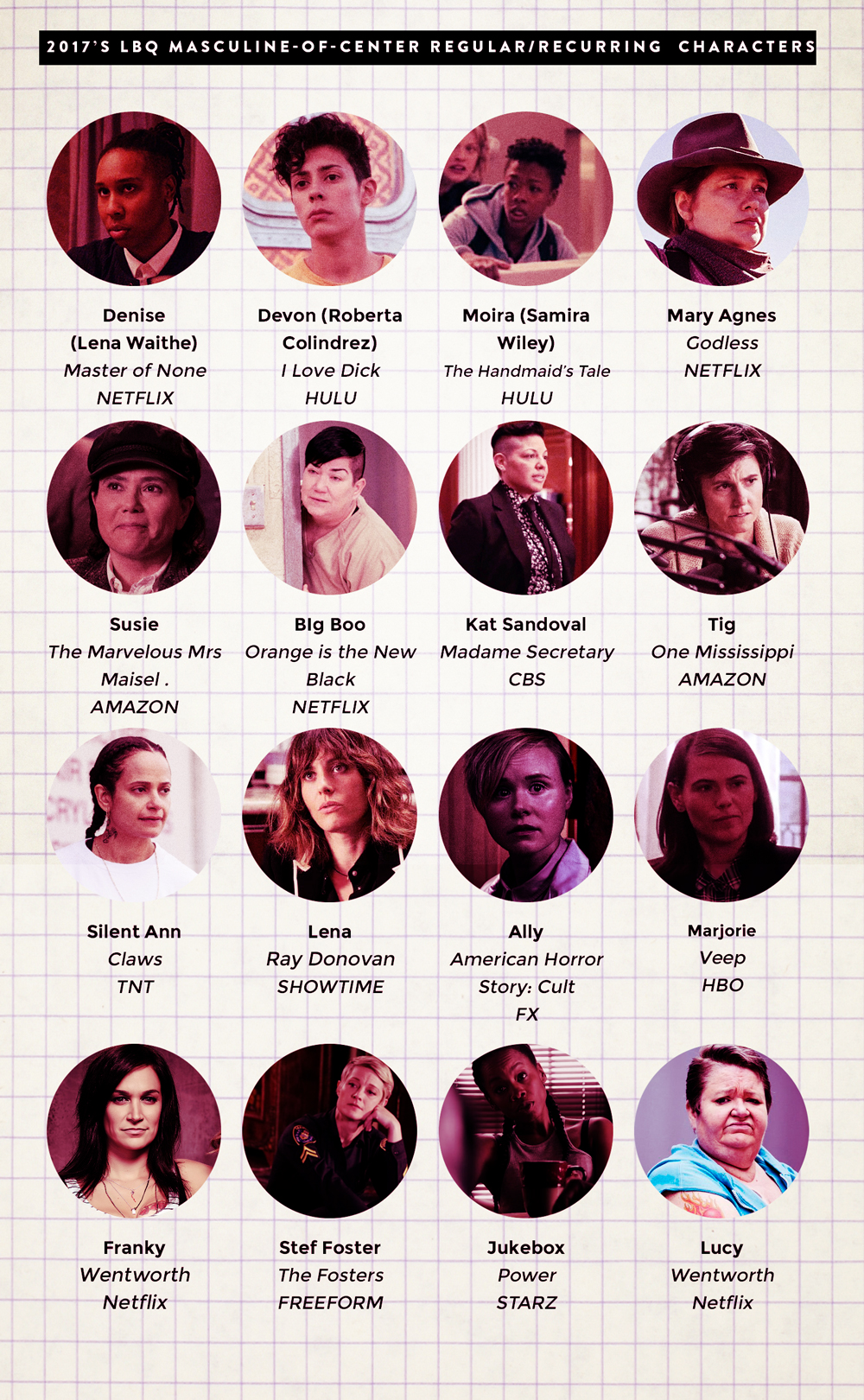
Butches are most likely to appear in prison or somehow involved in crime or criminal justice. Lucy is a convicted rapist. Franky, Silent Ann and Big Boo are all convicted criminals. Jukebox is a (now-killed) corrupt cop. Mary Agnes and Stef are both gun-toting law enforcers, albeit in very different scenarios. Ally kills humans with knives and Lena works for a Hollywood “fixer” who’s often helping criminals get away with it.
This year’s biggest gains for masculine-of-center representation were a black masculine-of-center lesbian winning an Emmy for a black lesbian story, Kat Sandoval and her pocket square on Madam Secretary (remarkable for reasons including how rarely we see a not-skinny butch in a suit on any kind of screen), Devon in I Love Dick (my favorite character of 2017) and Tig Notaro’s One Missisisippi, starring and written by a masculine-of-center lesbian. Those were four incredible portrayals, but 16 masculine-of-center R/R characters (two of whom died, and some of whom are really only television-butch) out of 204 is ridiculous.
Furthermore, Seeso’s shuttering this year has left hilarious wives Cameron Esposito and Rhea Butcher’s second season of “Take My Wife” in limbo, which says a lot about where television’s comfort with gender non-conformity begins and ends.
Transgender Representation: Better Still Isn’t Good

A few steps forward and a few steps back: this year offered three non-binary characters (up from zero in 2016), including thoughtful season-long gender journeys for Yael on Degrassi and Ali on Transparent. The animated program Steven Universe also has a non-binary character, Stevonnie.
Trans representation gets a little better every year, but the bar is so low there that it’s practically an underground tunnel, and we’re still lacking lesbian, bisexual and queer trans women. Moira Pfefferman began dating men in Transparent‘s Season Four, but does seem to still identify as queer. We’re hoping they’ll recast Moira with a trans actress for Season Five, now that Jeffrey Tambor has been outed as a sexual predator, rather than kill her off or exile her geographically.
Laverne Cox’s Sophia Burset, who had a diminished role in the past two seasons of Orange is the New Black, is queer, but her sexuality is rarely addressed. Nomi Marks, the transgender hacker from Sense8 played by Jamie Clayton, has a girlfriend and an inspirational arc — but Sense8 was cancelled this summer. “In some instances,” GLAAD wrote of trans characters in their 2017-2018 report, “it appears that the show’s creators haven’t given much thought to the fact that trans people also have sexual orientations.”
Straight trans women aren’t exactly thriving either. Four shows with trans characters — Doubt, Daytime Divas, Gypsy and Lopez — were cancelled. Maxine may not return to Wentworth. Although sources strongly suggest Cotton is returning to Star, they did leave possibly-murdered in the season finale. On the upside, the always-incredible Davina from Transparent broke ground this year with a full-frontal.
Danger & Eggs was created by a trans woman with multiple side trans characters and trans actresses — but its future is unclear. (Take My Wife‘s second season, also in limbo, promised trans-inclusiveness.)
Trans men remain woefully underrepresented in media. Elliot Fletcher plays a gay trans guy on Shameless and a straight trans guy on The Fosters, and apparently The Orville has a regular trans male alien character. There is speculation about Frankie, Sam’s daughter, on Better Things, as well as the child in the now-cancelled Gypsy. “I didn’t know they existed,” trans male actor Ian Harvie told Screencrush this year about trans men, “and I didn’t know I existed as a result of it.”
Racial Diversity
As Carmen Phillips wrote in our Favorite / Least Favorite Characters of 2017 roundtable, “representation for queer women of color was plentiful this year, but uneven in execution.”
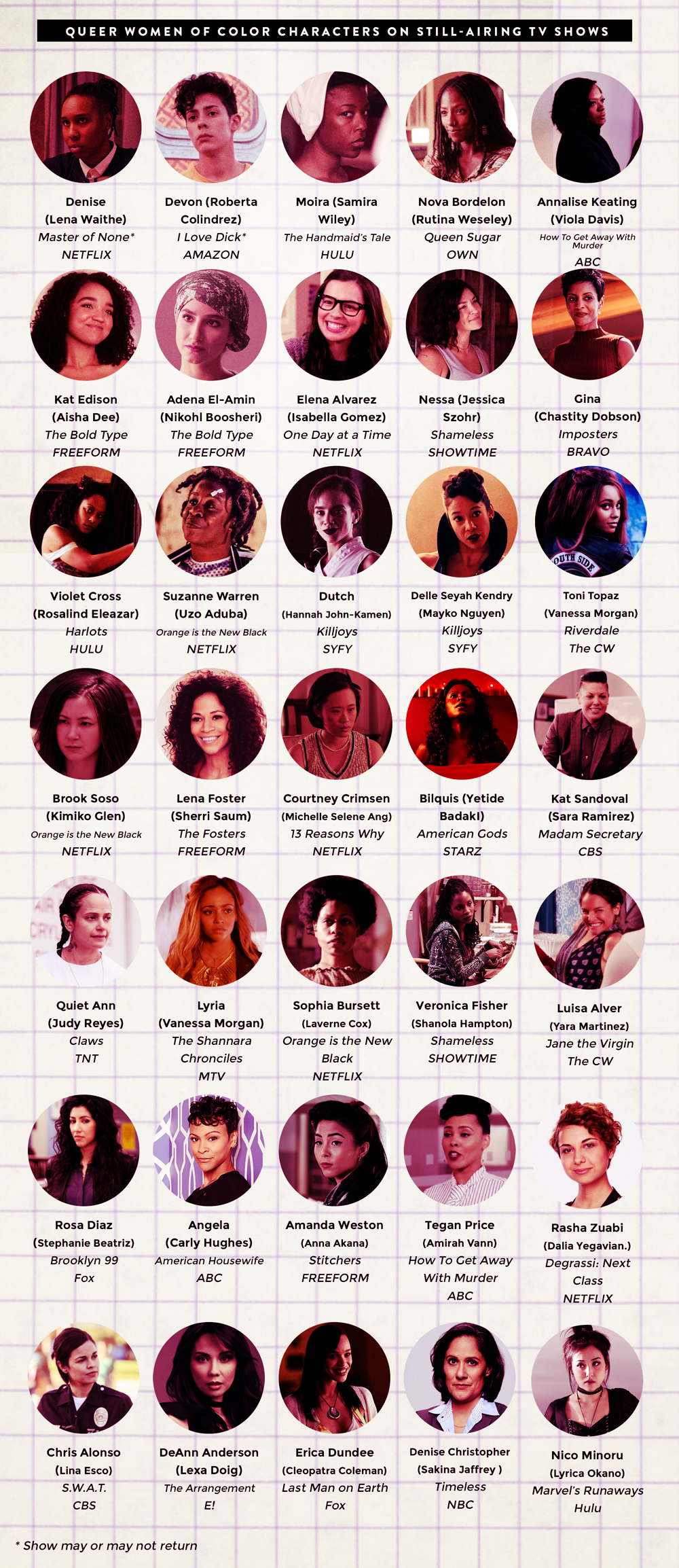
It felt like a big year, between The Bold Type and the “Thanksgiving” Emmy win and Queen Sugar and The Handmaid’s Tale and Rosa Diaz — but the big picture isn’t great.
GLAAD reported that broadcast scripted programming for the 2017-2018 season is “finally making serious strides towards more racially diverse representations” but “GLAAD would like to see that racial diversity also represented in the increased inclusion of LGBTQ characters who are also people of color.” They found the number of QTPOC characters decreasing on broadcast, to 36%, and increasing on cable, to 35%, with streaming lagging behind at 23%. GLAAD was looking at a different data set than us — all characters (not just women), only U.S. primetime shows, and the 2017/2018 season rather than all shows that aired in 2017. But our numbers were similar: 70% of the R/R characters we counted were white.
Comparing the population to its accordant representation isn’t a great standard — I’d argue when it comes to sexual as well racial minorities, we need extra representation, not just proportional representation. Still, it’s worth noting the extreme discrepancy for Latinx people — 18% of the population, yet only 4.8% of LGBT female characters! The small, sliver of a silver lining is that those nine Latinx characters were some of the year’s best characters, period.
GLAAD reported a sharp dip in API LGBT characters, from 13% in 2016-2017 to “a meager 4% this year.” Our number was slightly higher, but still dismal. There’s a quality/quantity issue and the only API character on network television, bisexual CeCe from New Girl, had zero lesbian romantic arcs. Other interesting numbers: of 12 shows with API characters, 33% were Canadian and 42% were sci-fi/supernatural. Just two of the 12 identified as lesbians, and none of the 12 had a present or past relationship with an API female. In fact, from a cursory look at the data, no API character in our database of 303 shows has ever dated another API woman. (I’ll talk more about this in an upcoming piece on race in lesbian TV relationships.)
19% of this year’s characters were Black, which is fine but not great — especially when you take a closer look.

Although Nova and Annalise remain beloved bisexual characters, and don’t need to date women to prove their bisexuality, it’s still worth noting that neither had a romantic storyline with a woman in 2017. Nor did Empire‘s Tiana, on a show which previously imprisoned one Black butch lesbian and killed a Black bisexual woman. Nor did Suzanne or Sophia on Orange is the New Black, which killed a Black lesbian last year and has tortured the aforementioned for many moons now. Cancellations buried Survivor’s Remorse‘s M-Chuck (before she ever got a big romantic storyline), Rosewood‘s Tara, Sense8‘s Amanita, APB’s Tasha, Dark Matter‘s Ayisha and Doubt’s Cameron Worth. We were immediately drawn to Moira (The Handmaid’s Tale) and Kat (The Bold Type), but both shows fell into the trap of having characters of color in very race-relevant environments where their race was somehow never mentioned. Two shows that addressed race directly with majority-black casts, Dear White People and She’s Gotta Have It, endorsed problematic tropes about queer women (click those links for more on how).
Another interesting phenomenon: Fresh Off The Boat, American Horror Story: Cult and Transparent all included Black guest characters as love interests for white regular/recurring characters, but zero Black recurring/regular queer characters.
I’ll conclude with this quote from Brittani Nichols (a gender-nonconforming Black lesbian actress and writer who was part of that Take My Wife Season Two I keep bringing up) from her piece I Demand To Be Sexualized: “I rarely see anyone that looks like me in movies/web series/TV. To the point that the most glaring examples of people that look like me ARE ACTUALLY ME .”
The Future of Lesbian & Bisexual Characters on TV
If we’re able to stave off nuclear war, there’s a lot to look forward to. Thirteen new shows for 2017 have promised LGBTQ female characters, including the hotly-anticipated Black Lightning, with a Black lesbian regular and a bisexual Asian-Amazon recurring character.
Starz is vying for Best Network of 2018: they’re developing P-Town, a drama about the opoid crisis with a “hard-partying” Federal Fishery Service Agent lesbian lead character as well as Vida, focusing on two Mexican-American sisters in Los Angeles and promising representation of “all genders and sexualities,” including at least one queer female lead. Sweetbitter has cast its lesbian bartender, American Gods will add Native American bisexual character Sam Black Crow in Season Two, and The Counterpart debuts its masculine-of-center lesbian later this month.
Ryan Murphy’s Pose, which promises 50+ LGBT characters and is centered on four trans woman of color, begins filming this month.
The Heathers reboot, on the Paramount Network, will introduce an amab genderqueer character and a black lesbian.
The Dime, centered on a lesbian cop, has been given a script commitment from Fox. Marvel’s New Warriors, with “confidently out lesbian” character, is being shopped around after Freeform’s pass.
Of course the biggest news of the year is that Showtime is developing, bless our collective souls, an L Word reboot. Autostraddle’s roots are in L Word fandom, and although this isn’t a great time to be alive, it is a great time to be a living television writer for lesbian, gay, bisexual and queer women.
The television industry has a major opportunity right now. Scores of cis white men are getting fired for abusing power and (surprise!) also women. It’s time to promote, hire, and elevate women, queer people, trans people and people of color. It’s time to tell new stories, and getting LGBTQ folks behind the camera is a great way to get more in front of it, too. Time’s up. We’re ready, and we’ve got so much left to talk about.
The 17 Most Romantic Lesbian and Bisexual TV Moments of 2017
A lot more women than usual kissed each other on our teeves this year! Some of them even did so with the lights on! But those weren’t the only swoon-y things that we watched (over and over and over again) in 2017. There were songs and bike races and hot air balloon rides and promises of forever and allusions to some of the most romantic tropes and movies of all times. These were some of the 16 most romantic lesbian and bisexual things of the year.
Marceline sings a new song for Princess Bubblegum, Adventure Time
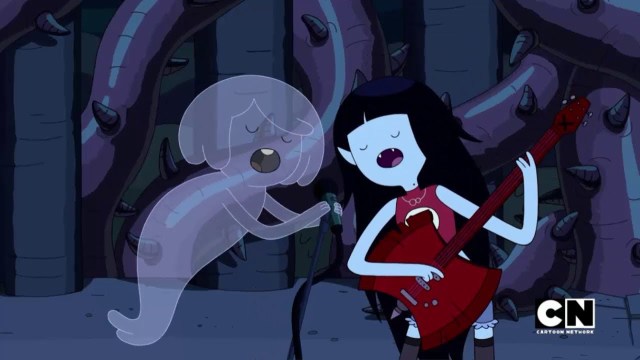
Heather: On the way to Marci’s house with her dad, Finn and Jake said “maybe” she has a girlfriend, and then when they showed up she was lounging around in Princess Bubblegum’s sweater from the “Stakes” mini-series. Off they went to Marceline’s solo concert where she sang her most — her only? — romantic song ever, “Slow Dance With You.” Quite a journey with PB from “I’m Just Your Problem.”
Niska and Astrid fall in love against all odds, Humans
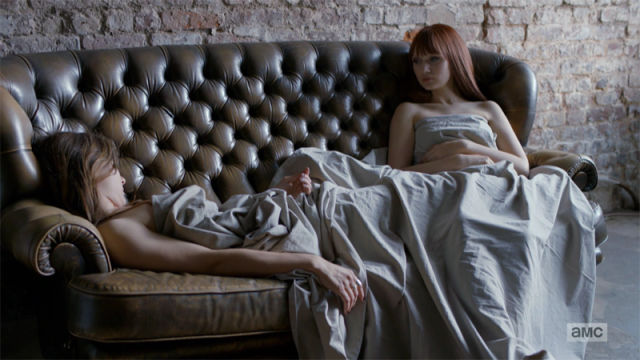
Valerie: “Nika and Astrid’s issues weren’t what you would expect — it wasn’t a Synth/human scandal, it wasn’t a woman/woman scandal. It was Niska running away from her feelings (which had more to do with feelings being new than anything else) and Astrid not letting her. It was a surprising happy place amid the carnage, and even though so many people — humans and Synths alike — didn’t survive the season, our lady-loving ladies miraculously did.”
Alex and Maggie’s first morning after, Supergirl
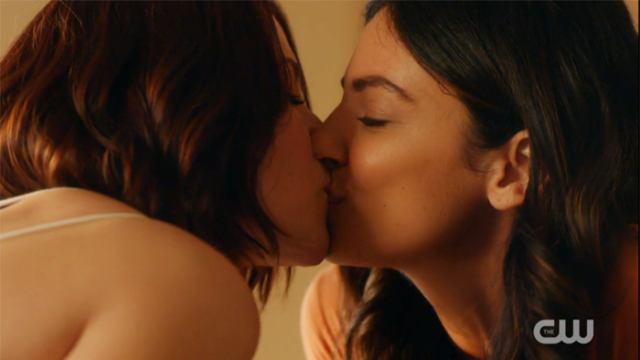
Heather: After fighting their feelings for each other for months (and a lifetime of Alex fighting her feelings for girls), Maggie and Alex had sex for the first time and woke up the next morning dappled in sunlight, dressed in each other’s clothes, smooching contentment and disbelief. To be honest I kind of couldn’t believe it was happening either.
Tessa and Mariah’s first kiss, The Young and the Restless
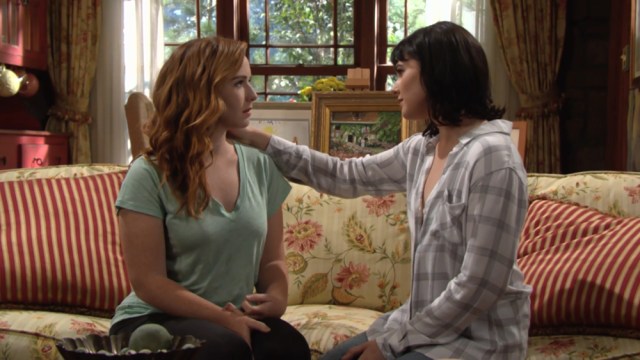
Natalie: “The racing heart, the long conversations that are never, ever long enough, the regret of any day spent apart. Mariah feels all of that, she just doesn’t feel it for Devon. It is not a small thing for Y&R to cast Mariah’s love for Tessa in the same mold as one of the show’s great supercouples, Nick and Sharon. It’s a normalizing force for a conservative audience that might not view a same-sex story that way.”
Kat and Adena’s Before Sunrise escapades, The Bold Type
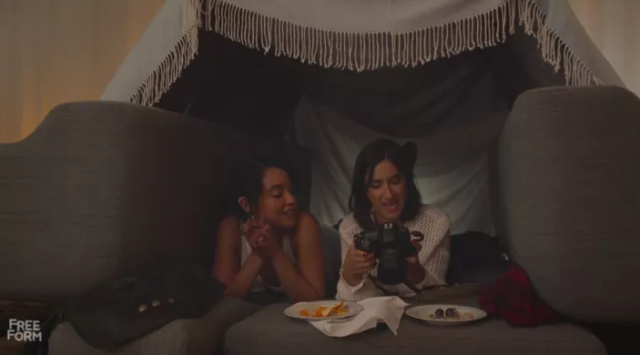
Heather: Kat and Adena are my favorite TV couple of 2017 and while they have plenty of swoon-y moments to choose from, their blanket fort escapades in the airport the night before Adena was deported were my favorite. Even the title of the episode was drawn from Richard Linklater’s Before Sunrise, one of the most romantic movies of all time. I was willing to suspends all my disbelief for this episode, including Kat and Adena having uninterrupted sex in the airport lounge, a full night of sleep in each other’s arms, and Kat not giving Adena her first class ticket when she decided to stay in NYC.
Gail and Erica Get Married, The Last Man On Earth
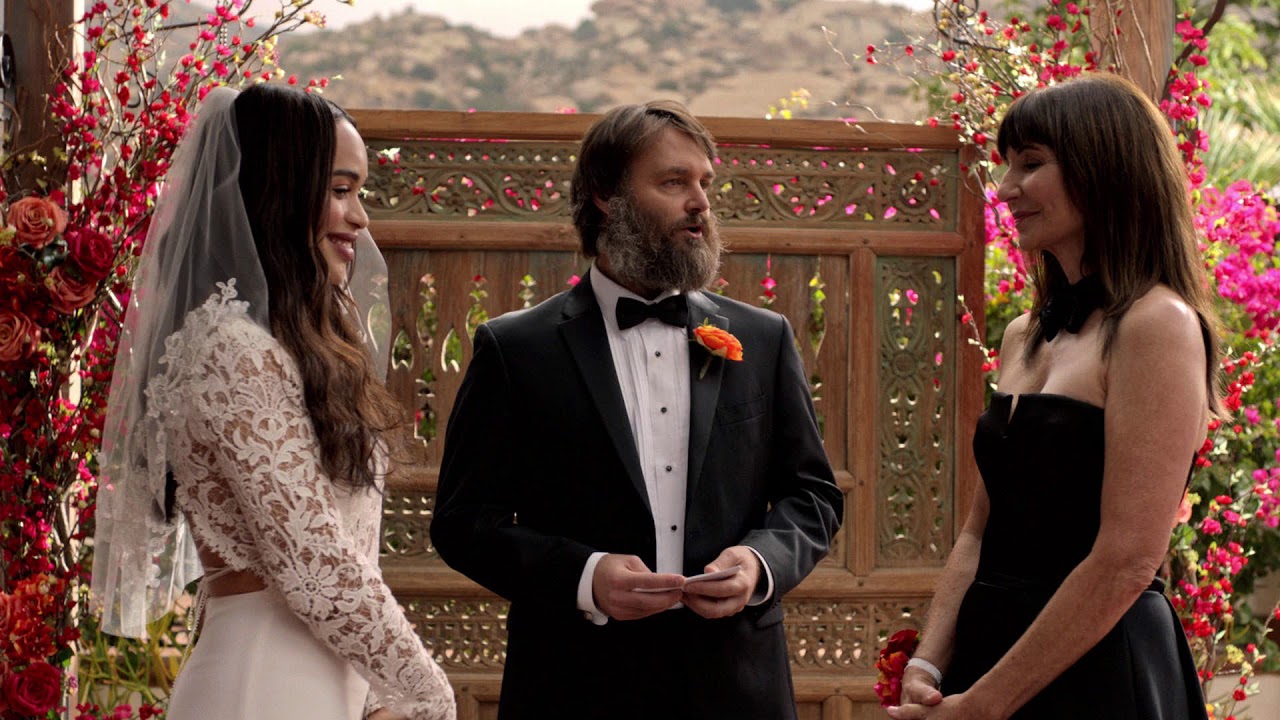
Riese: Gail and Erica’s relationship was initially written off as a thing they did before realizing they weren’t the only human beings left on earth, but eventually after three seasons of other pursuits, their union revealed itself to be the truest and most honest thing either had ever known.
Paige and Emily’s last bike race, Pretty Little Liars
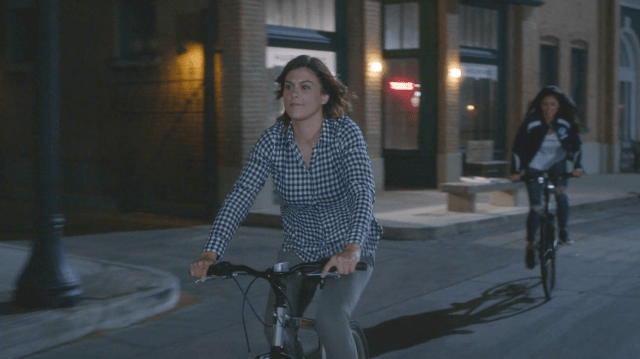
Heather: This was some hardcore Paily fanservice and, let me tell you, for suffering through the last few seasons of this show, we deserved it. Bikes? Check. Musical montage? Check. Camera swirling kissing? Check. It wasn’t going to last and everyone knew it, but for a shining moment everything was right in Rosewood again.
Odessa asks Tilda to run away with her, Into the Badlands
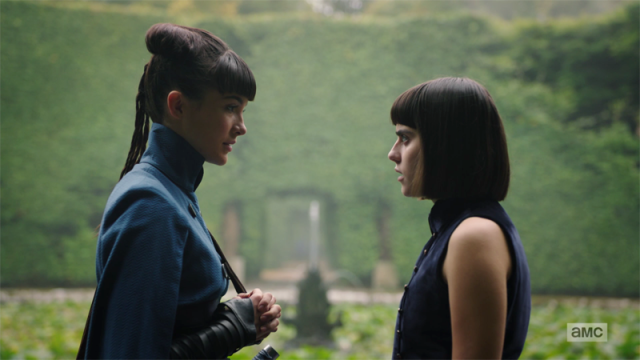
Valerie: “I’ve mentioned before that too often kisses between two women are cast entirely in shadow, or are a quick peck in the middle of a camera transition. But not here, not now. The camera loves them and the music swells lovingly and the light glows softly as they kiss and kiss and kiss. Meanwhile I am pressing my hands to my face so hard my eyeballs almost pop out of my head. Everything’s fine. EVERYTHING’S FINE.”
Tig and Stephanie’s whole storyline, One Mississippi
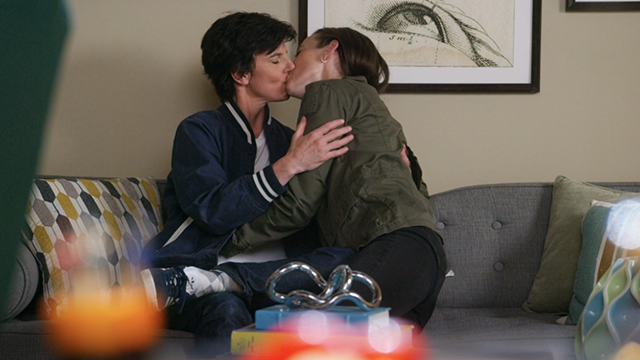
Heather: Look, do not fall in love with a straight girl. But if you do make sure it’s your soul mate. I know, I know, Stephanie’s not straight, but she sure thought she was for a long time, even though me and you and Tig knew she was very much in love with another woman and therefore was not straight. When she finally confessed it, Tig said, “…but?” And Stephanie said, “No, but. Just … and.” And I for one have still not recovered.
Zoë and Rasha’s first kiss, Degrassi: The Next Class
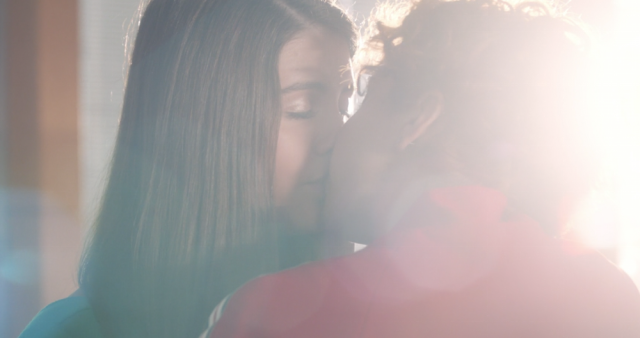
Riese: There were so many fraught elements to this union — Rasha, a Muslim Syrian refugee, was scared to come out to her host family, which included their classmate Goldie, and Zoe didn’t know if Rasha was gay or not, and they were both just generally young and nervous and insecure. When their first actual date gets so complicated it ends up ending before it begins, Rasha fears their union is doomed, telling Zoe it’s okay if she’d like to call it off, after all, Zoe is fearless and beautiful and can have any girl she wants! Zoe is like, wait, YOU ESCAPED ACTUAL WAR JUST TO BE ON “DEGRASSI THE NEXT CLASS” AND YOU’RE CALLING ME FEARLESS? Then Rasha kisses her. I didn’t want to be afraid anymore, she says, as melodic acoustic hipster music swelled and the light hits their faces just so. Young love, y’all. Sweet and against all odds and despite all closets and obstacles and fears, there we have it.
Cosima and Delphine’s clone-saving mission, Orphan Black
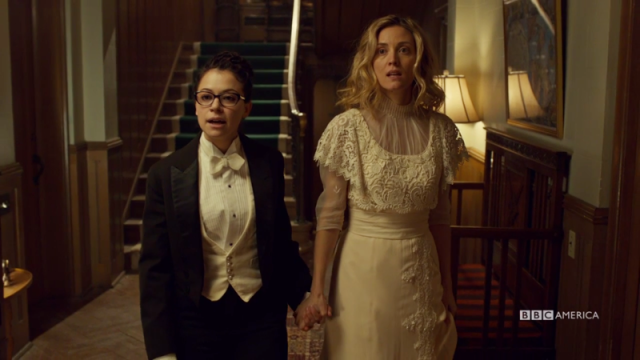
Heather: Delphine sacrificed everything for Cosima, and to keep her promise to keep Cosima’s sestras safe — and the whole time everyone kept expecting her to reveal that she the ultimate bad guy. Well, not only did that turn out to be untrue, we actually got to watch her and Cosima join forces and work together to save the day. The episode also included their sexiest makeout and Cosima in this tux.
Waverly and Nicole fall in love in a parallel dimension, Wynonna Earp

Heather: Two women falling in love in alternate universes where they’re with completely different people and don’t even know each other is what fan fiction dreams are made of. If Waverly and Nicole had had to take off their clothes to share their body heat to stay alive in this episode, it would have been the most romantic moment in all history on any space-time continuum.
Lyria asked Eretria to be her queen, The Shannara Chronicles
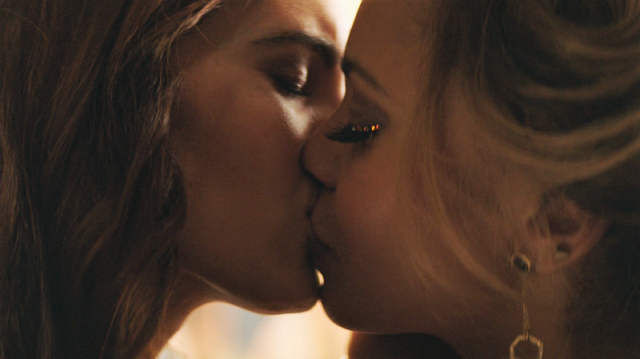
Heather: In another year one or both of them would be dead, but not now! And even better, when Lyria was asking Eretria to be her queen she said they deserved a happy ending. “People like us,” she said. (Like you and like me!) They’re not together yet because Eretria has to get a handle on her darkness, but their sweet, slow kiss goodbye felt more like a pause. And it didn’t end with anyone getting shot with a stray bullet.
Stef and Lena’s Notebook-style makeout, The Fosters
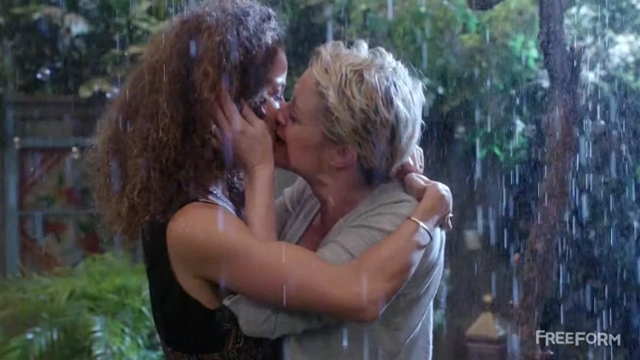
Heather: Stef and Lena have gotten married so many times now and every new time it’s better than the last. This most recent one, especially, because it started raining and all their million kids and their guests rushed inside but they just stood out in it open-mouthed kissing each other and promising forever.
Amelia and Violet’s second kiss, Harlots
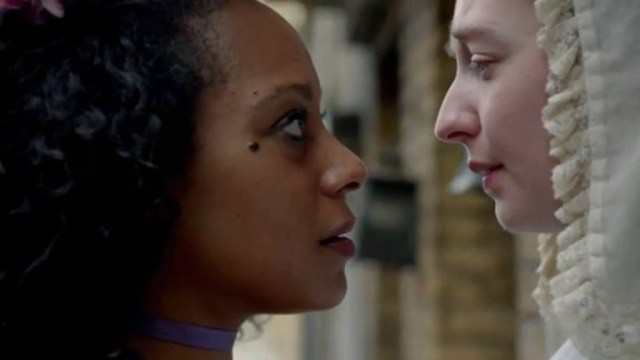
Riese: Amelia had been raised by her evangelist mother to see sex itself as evil, let alone women having sex for money, let alone falling in love with a woman who has sex for money and then kissing her on the mouth! So when Violet kissed Amelia after a gradual sexual tension build, it wasn’t surprising that Amelia immediately freaked out — which made Amelia’s return to Violet, and her eager kiss, that much sweeter.
Nomi and Amanita get engaged, Sense 8
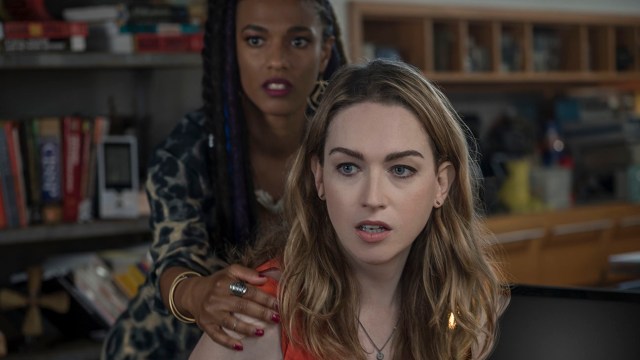
Sense8 was cancelled way too soon, but in the season two finale, Nomi and Amanita did get engaged! Jamie Clayton’s post-season interview with The Hollywood Reporter was almost as beautiful as the on-screen moment. “It’s just another testament to the strength of their relationship and how they’re on the same page. That’s the beauty of love. Even if you take two different roads, if you end up at the same place, that’s the most important part about love,” she said.
Honorable Mention Even Though They’re Not Technically Gay: Grace and Frankie take a hot air balloon ride, Grace & Frankie
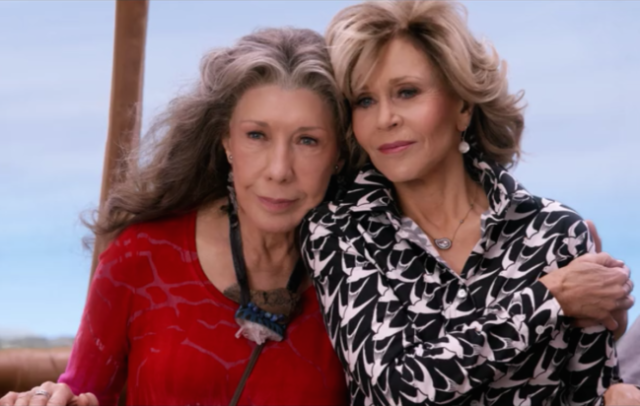
This is the part where this is the part where Grace ends her date with a man only 15 minutes in to turn it into a date with Frankie.
Riese and Erin: “When Frankie tells Grace she might be moving to Santa Fe, everything gets much gayer very quickly. Everything gays right out of control. Every word spoken is a word unspoken, and also a word that could easily precede the words “you have to stay because I am in love with you.”
As always these are the individual opinions of our writers and editors and we’d love to hear your additions, preferably bolded and in all caps with as many exclamation points as possible!!!!
It’s Time to Free Orange Is the New Black’s Stars
I didn’t know what to expect when I started the pilot of Orange Is The New Black on the morning of the show’s release in 2012. I was living alone in Los Angeles for a summer internship between my junior and senior years of college. Well, I actually had four roommates, but I felt very much alone. I’d heard about this new series from Jenji Kohan through the internet and my job as a television critic for my school’s newspaper. I started the first episode and couldn’t stop. The Netflix binge model was new and exciting, and I felt compelled to keep going and going and going. It was the most queer characters I had seen on screen at once since The L Word, and I was still mostly in the closet. Even though the first season was so fixed in Piper Chapman’s wealthy white viewpoint, I was struck by all the new faces in the cast, by all the Black, brown, Latina actors comprising the massive and massively talented ensemble. When I finished the season, less than 24 hours later, I was tempted to start all over again. Instead, I followed the entire cast on Instagram.
Much to my joy, these women were obsessed with each other. Or, at least, they appeared to be obsessed with each other on social media. I’m not quite cynical enough to believe their friendships were forced as part of the show’s elaborate marketing campaign. Taylor Schilling celebrated her birthday with the cast! They all post pictures together year round. When I attended a Regina Spektor concert with my girlfriend, we stood feet away from a group of Orange cast members, who all went wild for their own theme song. I remember my delight when many of the cast members were seen together at various Pride events after the first season, a tradition that has continued every year since, with new seasons always dropping during Pride month. Again, I was still struggling with my own sexuality, and as silly as it sounds, seeing these women who I was quickly becoming obsessed with celebrate Pride meant something to me.
Since the beginning, Orange Is The New Black has championed fan interaction. Orange Is The New Black and Netflix didn’t invent television social media campaigns. But because the binge model was new and meant that people could easily watch in a weekend and then move on to the next thing, OITNB had to find a way to stay in the conversation, so it used social media to keep fans active. It even won a Webby for its social media campaign in 2014. But as Raechel Anne Jolie and Melody Hoffmann write for Bitch, the show’s social media presence has become increasingly tone-deaf and counterproductive to shedding light on the horrors and injustices of the prison industrial complex. “From mugshot fan selfies to gimmicky ‘Pornstache’ t-shirts, the Instagram account promotes humor and joviality in the context of imprisonment,” they write.
A show about the horrors of prison shouldn’t make you want to watch it over and over and over again. Orange Is The New Black has always intentionally mixed drama with comedy in a jarring way with varied results. Sometimes, it works, reminding that violence and danger can manifest at any time in prison. But in the later seasons of the show, the writers’ attempts at injecting Litchfield with levity have fallen completely apart. This fifth season attempts to grapple with a prison riot and fails spectacularly. The same problem with the show’s social media presence has seeped into the show itself, mining pain, violence, and racism for comedy to the point where Reneice Charles actually had to remind people that slavery is not funny.
The novelty of the cast’s diversity quickly wore off. If your media representation discourse centers quantity over quality, you’re missing the point. Many of the characters being played by the show’s Black and Latina actresses aren’t necessarily poorly written. They’re dynamic, layered, real. But by constantly inflicting violence on these characters, Orange Is The New Black has created a theater of horror that replicates and even glorifies the real world’s violence toward women of color. And it’s all for what? To make a point? To inspire change? No, it’s grotesque tragedy porn, as Alaina Monts describes in their recap of this season’s most horrifying episode. And it has become far too exhausting as a queer woman of color to watch as the show keeps making jokes out of white supremacy.
And yet there still seems to be a sense among the writers of this show that they’re doing something noble, that they’re inspiring people to care about prison conditions. Jenkins Kohan has said she hopes to “provoke conversation and dissention” with the show. But Orange Is The New Black has inspired viewers to write fanfiction, not to write their representatives who profit from the prison industrial complex. And the cast members have become props in this quest to foster fandom.
While I have become increasingly uninvested in the show, I still care about the cast. I still become embarrassingly giddy when they post pictures together. I still wonder if I’ll see any of them at events in New York. In season five, the writers attempt to coast by on the ta lents of their cast instead of engaging with the prison riot premise in a meaningful way. Yes, Danielle Brooks gives the best performance of her career, and yes she deserves all the awards, but she doesn’t single-handedly save the season. As brilliant as she and Selenis Leyva and Jessica Pimentel and Adrienne C. Moore and many of the other actors are in this new season, it doesn’t change the fact that the show has become the worst version of itself.
I agree with my friend and fellow critic Caroline Framke’s assertion that the best thing the show could do at this point is hit the reset button completely, starting over with new characters. I’d add to that argument that they should also fucking hire Black writers (the fact that it didn’t happen between seasons four and five is ridiculous). But Danielle Brooks has already confirmed she’s on for next season. I think Jenji Kohan and Netflix know full well there are people like me who will follow Danielle Brooks to the end of the earth. Maybe they’ll shake things up, but they’re not going to hit the reset button entirely.
The show has created stars, amassing a huge fan base. But the only good thing to come from Poussey’s death at the end of last season was freeing Samira Wiley to star in other shows. I want to keep seeing these incredibly talented women on television. Never before have my distaste for a show and love for its cast been so at odds. Kohan has been guaranteed two more seasons, and she has said she wants to end it after that. Hopefully, season seven will truly be the end, and hopefully, casting directors will scoop as many of these cast members up as possible. They deserve awards and attention, even if the show no longer deserves being lauded as revolutionary, game-changing television.
Orange Is the New Black Episode 513 Review: Poussey Washington Was More Than a Martyr
In summer 2013, I fell hopelessly, completely, heads over heels in love with this little “cutting edge” Netflix dramedy known as Orange is the New Black.
I devoured the first season’s 13 hours in a little over 24. I followed Danielle Brooks, Laverne Cox, and Uzo Aduba on Instagram. I was delighted to become reacquainted with Natasha Lyonne. I wrote love letters in my mind to Samira Wiley, whose shy smile still turns my knees to jelly. Y’all don’t need the details; a lot of you were right there with me in your own ways. Which is why the show’s betrayal of its queer, and particular QTPOC, audience cuts so deeply.
I respect Autostraddle’s decision to continue recapping the show. I sincerely believe it’s important to keep forging our critiques publicly, especially for the shows that we once loved openly. I had spent the majority of the last 12 months vowing to never watch OITNB again, to burn any mention of the show to ground and salt the earth upon which it once stood. But, as June began to rear its head, I felt a pull to see where the show would go. Would the production have learned any lessons from last year? Could I really walk away from the queer, trans, feminist, Latina, and black cast members who I had let into my heart over the last few years?
Season five did not give me the answers that I was hoping for. There were very brief shinning moments to be found, but I can’t wrap my head around what on earth Jenji Kohan and the show’s writers thought their audience would take away from this experience.
The season finale opens with Stormy Weather playing as the SWAT team blows upon Litchfield’s front door barricades with explosives. Alison immediately removes her hijab. Janae— our beloved track star— makes a run for it before getting violently tased while Taystee looks on in horror. I watched from behind my arms crossed in front of my face. I struggled to catch my breath. Women are slammed against walls, dragged by their feet across the floor. They are beaten with batons and pepper sprayed. The entire episode is loud and frantic, screams on top of screams. It’s unbearable.
There are some small subplots tied up that I’ll glaze over for the sake of time. Namely, what is the point of the white supremacists and some of the side character Latinas joining forces to create #TeamLatte and setting up Home Alone-style traps for the SWAT Team? Or Angie and Leanne realizing that they are actually The Worst before deciding to burn all the inmates’ files in some form of anarchical penance for the past wrongs they perpetrated against their peers? Most of those files must be backed up digitally; still I guess it’s a nice symbolic gesture. More heartfelt, but unfortunately all too rushed, are the wrap-ups of Gloria and Maria’s plots. Gloria finds out on the phone that Benito came through his surgery healthy, and Maria finally spends five minutes with her daughter in the fresh air. Both actresses put their all into their respective scenes, but we didn’t have enough time spent with either to fully connect.
Nicky comes to warn Lorna that SWAT is coming their way. Lorna’s scared and begs Nicky to comfort her. I have loved their arc this season, and it has given Natasha Lyonne some of her best work on the show. Every time she soothes Lorna this episode, her naturally gravely tone warms and her eyes are brimmed with tears. The resulting effect is, obviously, me swallowing my heart in my throat.
Nicky tells Lorna that she has to surrender, even though Lorna wants to stay with the rest of their prison family. Nicky reasons with her; she’s pregnant and it’s only going to get more dangerous moving forward. She grabs both of her hands, and looks straight into her eyes: “I want you to walk down the hall with your hands up. I want you to tell them your pregnant the minute you see them. YELL IT. Make Sure That They Hear You. Go! Go… NOW!” Nicky’s firm, desperate to portray confidence, but she’s scared. This is the end. They embrace one last time.
Lorna does what Nicky tells her. She surrenders. She raises her arms. She screams that she’s pregnant over and over again. But, it doesn’t make a difference. Nicky looks back, crying, and all we hear is Lorna being forced to the ground.
SWAT reaches the corridor that has been turned into Poussey’s Memorial Library. They find Soso sitting cross-legged in the middle of the floor, eyes focused and stone faced, ready to peacefully resist. She uses her small frame to anchor herself against that floor, never saying a word as it takes two very large SWAT members to finally carry her out. Her body contours between them, so that we have one final shot of the library from her point of view, books hazy through the smoke of the riot. The next time we see the memorial, it is being ripped to shreds in SWAT’s hands. Last season, Poussey’s final act before joining the prison protest that ultimately led to her death was locking eyes with Soso. A silent apology for not believing that any of them could actually make a positive change. This is a painful, final reminder and goodbye.
Away from the riot, Tiffany is still making herself at home in Coates’ cabin. She pops some popcorn and watches the drama at Litchfield unfold on TV as if it’s the greatest playoff game that she’s ever seen. The past two seasons have been so disturbingly committed to rehabilitating Coates and watching Tiffany snuggle on the couch with her rapist is unspeakably horrifying. However, it’s played as if we are supposed to find it sentimental. Between this, Angie and Leanne’s quippy jokes about the sexual assault they committed, and Maria publicly sodomizing a guard earlier this season, it is hard not to see a trend on the show. Jenji Kohan had serious issues of not adequately dealing with rape and sexual abuse in the later seasons of Weeds; I can’t help but wonder if this is an ongoing problem in her writer’s room. Given Tiffany’s traumas before Litchfield, I can empathize with her journey. I am hopeful, though far from confidant, that we are slowly moving towards her moment of recognition that Coates is an emotional abuser.
Nicky leads Taystee, Cindy, and Suzanne to the underground bunker. She’s looking for an accelerant to counteract the Lithium that Cindy gave Suzanne last episode. Of course Freida, ever prepared, has an EpiPen stored away for just the occasion. Suzanne comes back to us all.
Once in the bunker, Taystee’s season-long arc comes to a head as she sees Piscatella chained. She grabs Frieda’s gun and unleashes all of her rage, blaming him for Poussey’s death. And all I can say is, GO OFF DANIELLE BROOKS!!!! The range she displays here is as arresting as it is breathtaking. I think everyone agrees that Brooks was the season’s most gripping player, and as Taystee held a loaded gun to Piscatella’s edge the only thing I could think was: Don’t do this, sis. Don’t jeopardize your own life over his. It ain’t worth it.
Ultimately, Taystee doesn’t shoot. She collapses to the floor and finally allows the grief that she has been fighting in the days since Poussey’s death to encompass her. Cindy holds her as she wails and thrashes, broken down into tears. Red lets Piscatella go free, and he is immediately shot leaving the bunker. He is the takeover’s only fatality. I wish I could tell you that I cared about his death, but I don’t.
Buses line up outside the prison, and inmates are separated randomly before being put into each. Chosen and found families are broken up from each other, emotional support systems lost for who knows how long. Alison and Janae are worried that they haven’t found Taystee, Cindy, or Suzanne among the masses outside. Lorna frantically looks outside the bus windows for Nicky. It’s the separation of Maritza and Flaca that hits the hardest; Maritza frantically pleading and Flaca choking out sobs as they say their parting words to each other: “I love you”.
The second Daya ended up with a gun in her hand at the end of season four, we’ve been on a timer that was barreling toward this. None of these women’s lives will be the same after this riot, and it’s safe to assume that that none of the changes that they are about to face will be for the better. This was always going to be the price of their fleeting found freedom.
The women in the bunker weigh their options. They heard the gun shot that killed Piscatella and they know their time has come. Nicky wishes she was high for this, and I am so thankful that she is not. Freida gives them their only option: Stand together with dignity.
And really, wasn’t that what all of this was about?
1. Replace all the current guards with properly trained professionals
2. Reinstate the GED program
3. Better Health Care
4. Amnesty for all involved, providing there were no hostage fatalities
5. An end to arbitrary, degrading searches and the misuse of solitary confinement
6. Fair work opportunities, No discrimination, Basic Internet access
7. The arrest and trial of CO Bayley for the death of inmate Poussey Washington
8. Quality of Life Improvements, including: the implementation of conjugal visits, Hot Cheetos and Takis available in the commissary, free tampons in medical, and healthier food for all.
That’s it. That’s what they were fighting for. To be respected and treated with basic common decency while they are incarcerated. And for this, they lost what little they already had. For many of them, they lost each other.
Cindy lifts Taystee off of the floor. They stand alongside Gloria, Freida, Piper, Alex, Nicky, Suzanne, Red, and Flores, arm in arm. They are all bracing for whatever happens. I am terrified for them. A flash bomb busts through the bunker. All the women jump back, but still holding together, defiant.
And that’s where we leave them as the screen fades to orange.
I want to be able to tell you that I am glad I decided to come back to Orange is the New Black after last year. I want to end this review saying how glad I am that the producers and writer’s room learned their lessons.
I can’t say any of those things. Thirteen hours of television later, and season five’s cliffhanger ends nearly exactly as season four: with women, many of whom are queer, many of whom are of color, in peril and facing a unknown future. Instead of grounding this season in a fight for social justice, they gleefully reveled in unnecessary violence and humiliation. They wrote lovingly of the white men who abused and raped and killed. The writers once again focused on appeasing their own privileged guilt on the backs of the vulnerable women that they created.
Riese started this season’s recaps with a plea that Orange is the New Black diversify their writer’s room. It was a conversation that many queer women of color fans had last summer and a critique that has been echoed a lot in the reviews this year on Autostraddle. I am going to end our time together by adding my name to the chorus. The writers of Orange is the New Black played a role in redefining the most recent wave of television. They created the first breakout streaming hit. And they did it on their own terms. They’re generally smart, at times hilarious, and have given us a story about women that we’ve never seen addressed in mainstream media. On top of that, the show has launched the careers of countless talented, civically engaged women of color. But there is a profound void in their team.
The choice to honor the Black Lives Matter movement by killing off a beloved black character as opposed to, you know, actually allowing her to live is an example of what can happen without having representative voices in the room. Having a group of black women participate in the auctioning off of a white inmate on a slavery block is an example what can happen without having voices in the room. Having Latina inmates gleefully sexually abuse their hostages is an example of what can happen without having voices in the room. Dedicating an entire season to a prison riot without ANY clear plan of how to justly conclude the arc is an EXAMPLE OF WHAT CAN HAPPEN WITHOUT HAVING VOICES IN THE ROOM.
I ask you, did Poussey’s death and the subsequent riot change one person’s mind about the broken prison system in this country? If you made it through first four seasons of Orange is the New Black, I would bet that you had already come to that conclusion without this most recent foray into white guilt and torture porn.
I said it last summer, and I will say it again. I will say it anytime anyone mentions this once great, now unimaginably painful, show to me:
Poussey Washington Deserved Better Than To Be Their Martyr.
May she forever Rest in Power.
Orange Is the New Black Episode 512 Review: Half-Baked Proposal
Larry. “Tattoo You” reminds us Larry exists. And Larry’s ass. Yes there he is, and there it is, and OMFG he had the Kool-Aid Man tattooed onto his buttocks because of course he does. Yet in a way Larry’s White Kool-Aid Ass is the perfect metaphor for this episode. Like, we now interrupt this prison riot/social justice crusade with the most jarring thing you never expected.
Look, on any other show, I would be thrilled when one of the main female queer couplings moved their relationship to the next level on screen. Like, hallelujah, thank you for reflecting our real, everyday lives. (Yes, yes – insert your own U-Haul joke here.) And maybe in the first season I would be excited to see Piper propose to Alex, maybe. But here it sticks out like Larry’s White Kool-Aid Ass.
Because what season five should be about – the through line that should be engaging all of our emotional energy – is Taystee and the prisoners’ quest for justice and fair treatment in a corrupt corporate prison system. That’s it. It’s that simple.
And for a brief, shining moment we think they might have won. Negotiations have stalled at Litchfield between the two most unlikely negotiators, Caputo and Figueroa. Was anyone rooting to see these two together again? Yeah. But then the governor grants them everything to stop the PR nightmare unleashed by the publishing of Piscatella’s torture tape. Not because it’s the right thing to do, mind you, but because of optics. Whatever, victory is victory. Viva la revolución!
Yet Taystee sees it as hollow because they won’t give them is the one thing her heart needs the most: Bayley’s prosecution for Poussey’s death. Figueroa tells her to “trust the system.” Hahahaha. Oh, wait, she was being serious? Trust the same system that allows cop after cop to be acquitted and/or not even charged in the deaths of countless people of color across our country? M’kay, lady. Sure.
Speaking of people who don’t deserve to be taken seriously, Bayley pops up again this time to scare babies and ask Poussey’s father for forgiveness. Seriously, he can fuck right off forever. Don’t give me any of this tortured puppy dog with his tail between his legs bullshit. If the real-life officers who killed black men, women and children with impunity were so guilt-ridden by their actions, they wouldn’t put up such vigorous, successful and often racist defenses of themselves.
And while we’re on the topic of police brutality, Piscatella remains tied up by Red and The Olds. Amid the unnecessary wackiness and tonal deafness, season five has given us a few genuine glimpses of the dehumanization caused by a system intent of profiting off of systematic racism and human fallibility. And, even better, the grace it takes to overcome that. One is when Red instinctively offers a coughing Piscatella a drink, which he spits out violently. To which she says back to him: “In addition to not seeing yourself, you can’t see me. And we have so much in common.”
Another is when Nicky calls Vinnie to tell him to love Lorna like she deserves, even though she really loves her. There but for the grace of whatever you believe or don’t believe in go I.
Yet, oddly, the biggest emotional swing of this episode is one no one really asked for. Piper – who the show thankfully continues to move away from much to its own benefit – somehow manages to re-center herself in true Piper fashion. Our flashbacks are to both Piper and her fish-is-beauty tattoo and Alex and her love-is-pain tattoo. But these memories do little to move their relationship forward because we already knew all of this. They’re toxic, incompatible and hurt each other over and over – lather, rinse, repeat.
Still there Piper Elizabeth Chapman is, on one knee, with a can of baked beans asking Alex Pearl Vause to be her partner through love and pain and beauty fish forever. It’s the Larry’s White Kool-Aid Ass of plot-points amid a prison riot gone wrong, negotiations undermined by released hostages and a rapidly approaching SWAT team.
Orange Is The New Black Episode 511 Review: It’s a Family Affair
Of the many themes that run central to the storylines of Orange is the New Black, family is by far the strongest and most consistent. The inmates have fierce amounts of love and loyalty for both their chosen families in Litchfield and those waiting for them outside the prison’s walls. These bonds drive every decision made in their daily lives, and this episode clearly portrays the struggles that arise when conflict is present within a family and any resolution comes at a cost. Fortunately it was a relatively chill episode to watch and review; unfortunately that’s because episode ten was so disgustingly filled with gratuitous torture there’s no way this episode could’ve been anything other than chill.
With that said, the first family at bat is Red & Co. After successfully escaping Piscatella’s terrifying, unneccessary, completely NOT OKAY (have we made our point yet?) torture rampage, tying him up and dumping him in the pool, the group is at odds about what to do next. Red is seeing red and wants to FUCK (clap) HIM (clap) UP (double clap). Destroy him inch by inch to get her due revenge. She refuses to hear the others’ calls for taking the high road and turning him over unharmed so they sneak attack her and tie her to a chair to prevent her harming herself or Piscatella, and naturally Red is livid. They all get scared and start blaming each other for where they’ve ended up, and a full on screaming match about what to do next ensues. It only ends when Gina comes forward with a video she secretly filmed of Piscatella torturing Red and Alex. I wondered why she didn’t get the others to immediately intervene once she saw what was happening and this was why. She knew they’d need proof to be believed and had to make the terrible sacrifice of letting her family’s torture continue a little longer, and watch it happen, to ensure their safety in the future. Jenji, are you okay?
Taystee is still working diligently to be taken seriously and get the prisoner’s demands met. She’s kept Caputo and Figueroa up for hours in her quest and is disappointed and annoyed with Cindy when she comes to ask Taystee for help with Suzanne. Suzanne is struggling because she’s off meds as Lorna refused to give her any after taking over the pharmacy and deciding that prisoners with mental health diagnoses don’t need medication anymore because their differences are special and unique, and should be accepted not shunned. That’s cute, and advocacy for de-stigmatization around Mental Health IS important, but also wildly inappropriate as Suzanne’s medication is a necessity and she is a danger to herself and others without it.
Taystee isn’t willing to drop everything to help with Suzanne and tells Cindy to figure it out herself because she’s fighting a bigger battle and controlling Suzanne isn’t her job, so Cindy goes to the pharmacy to get meds. She grabs what turns out to be lithium, and heads to Suzanne’s bunk to find her in the middle of an episode. She’s tearing the ceiling tiles down trying to claw her way to heaven because all the death around her has been too much to handle, crying out that she is “good” and just wants to be in a better place. Uzo Aduba’s portrayal of Suzanne’s inner battle with her mental health is breathtakingly poignant as usual, and some of the best acting of the season. Cindy coaxes Suzanne off her bunk with a mixture of shock and sorrow in her eyes, gives Suzanne the lithium — despite Alison contesting the idea of giving her a random drug she knows little about — and sings her to sleep hoping she’s done the right thing.
Back in the pharmacy, Lorna faces her fears and takes a pregnancy test, knowing that if it’s negative she will have to accept all the things she’s been told about herself and her patterns of dishonesty/delusions. Surprise, surprise, its positive! She’s gonna be a motha! Meanwhile, Boo and Linda are having a makeshift spa date in the showers by running them all and turning it into a steam room. Boo grabs a stack of towels, causing Linda’s phone that was hidden beneath them to fall out. She picks it up, unlocks the phone and sees a photo of Linda beaming next to Caputo who is kissing her cheek. Boo is clearly shocked and betrayed, she really has feelings for Linda which is unusual for her so this is a painful revelation, but she doesn’t want to let on that she knows yet so directs Linda’s attention elsewhere.
In Spanish Harlem, Gloria gets to work on her secret plan to release the hostages in return for a deal that will allow her to see her son, Benny, in the hospital following his surgery. She plays a hard-ass and starts locking the guards in the poo for seemingly minor infractions so the other inmates don’t get suspicious. Maria Ruiz, however, is already suspicious and overhears Gloria talking to her son on the phone and saying she has a plan to see him soon. She approaches Gloria, seemingly as as a friend to ask if she’s okay, and Gloria confides in her about the deal and her plan to release the guards in order to see her son. Through tears Gloria seeks affirmation from Maria that she’s not a terrible person. She’s feeling guilty for putting her desire to be there for her son over the potential for the betterment of all the prisoner’s lives, people she loves and cares for. Doing this will derail the entire negotiation process, but she is a mother first and in a rare moment of vulnerability for her, she seeks that validation from another mother. Maria tells Gloria that she’s not terrible, she’s brave. She owes nothing to anyone and shouldn’t feel ashamed because any other mother in the prison would do the same.This exchange is another of the strongest moments of the episode.
Later on, Gloria, Ouija, and Pidge head out to check on the guards in the poo and when they get there, all the doors have been cut open and the guards are gone. Gloria, bewildered, immediately starts screaming “no, no, no” and looks around trying to understand what’s happened. At that moment we see the last guard of the group escape through a hole in the fence. Someone else, likely Maria Ruiz, carried out her plan exactly before she could. A grim reminder that in their world, even after all these years, they can trust no one. Gloria sees her hopes of seeing her son vanish and starts to run toward the opening in the fence but Ouija chases her and pins her down before she’s able to escape. At this point Gloria is clawing at the ground, dragging clumps of grass and dirt between her fingers and she cries out about her son. It’s an image i’m not likely to forget anytime soon. Ouija then chews Gloria out for selfishly thinking she’s the only one with a kid they’d like to see and hauls Gloria, still screaming, away with Pidge’s help.
Orange is the New Black Episode 510 Review: Yep, I’m Gonna Cuss Everyone Out
WELL.
Here the fuck we are.
Let me start with this: I am so, so, so, disappointed and angry in this show this season. It’s messy, it’s joyless, it’s making light of really awful dangerous situations. This is not a dark comedy. This is not a drama. It’s tragedy porn. And after this episode, the writers finally got me to stop watching! Forever!
SO! “Reverse Midas Touch” begins in chaos. Linda from MCC is being chased by Cabrera, the Olds are chilling in the bunker playing scrabble and getting high, and Piscatella has six women — three of which I believe are naked — tied up in duct tape. He’s got guns and knives and all sorts of things that can be used to torture someone because guess what? He tortures them.
The writers then decided that we might want some of Piscatella’s backstory. I do not. I did not. I won’t write about it.
Leanne and Angie are running around and Leanne thinks she finds a stray BBQ chip on the floor, but nope, it’s Angie’s fingertip.
Caputo and Taystee are trying to get Figueroa to understand just how awful the conditions in Litchfield are. She rebuts by saying that, essentially this is all Caputo’s fault, and she is not wrong. Not one bit. But girlfriend, it’s your fault too, nice try.
Still covered in makeup from the last episode, Suzanne comes into the bathroom and sees herself in whiteface and the little scene she has primarily with herself is the best part of the entire episode, and maybe even the season. She reminds herself that ghosts aren’t real before doling out some self-affirmations that I want to scream out from the mountains in hopes that every Black Child in the United States will get to hear them. “Black is beautiful: from your hair to your derrière, from your nose to your toes. You make all the colors pop.” She washes her face and continues, “Your skin is beautiful. Like walnut wood and soil and western coneflowers and old metal and dark maple syrup in brown jars.” I love Suzanne. I love her so much and I hate that she’s in prison and I just want her to be safe and happy and healthy.
After giving herself a good pep talk, she realizes Maureen is in a bathroom stall, and her face is infected and yellow, and she’s begging for help, and Suzanne says, “I think it’s time to ask for help because sometimes you need help and it’s okay to ask.” Thank you for the reminder, because I needed it.
Back in the dorms, Ouija and Cabrera are on guard, and Cabrera makes a joke that if she’s any comedian she’s Kate McKinnon and all I wanna know is why we have to have five seasons about Piper’s boring ass queer life when we could have five seasons about the queer lives of quite literally any other queer character in this show. Gloria stops by and gets them to take a nap somewhere, because she has a plan brewing. My notes just say, “Gloria. Gloria Gloria Gloria Gloria.” I want so much more for all these hurting women that I sometimes don’t have the words to talk about it.
Piscatella has Red in a chair, attempting to make an example out of her to the other inmates. Red spits in his face. Nikki tries to make jokes to diffuse the situation, but he slaps her in the face. He puts a knife to Red’s throat, and everyone screams. And down in the bunker they hear them! They hear them screaming but they don’t realize what they’re hearing and so they ignore it! It’s so frustrating to watch because then Piscatella starts chopping off Red’s hair with a fucking hunting knife. He cuts her scalp off in a few instances as well, and then, because he’s tired, he takes a fucking drink of water.
There’s a moment in The Poo where Linda and Tiffany are both singing the song for Big Red gum and they comment on how often things get so out of control when you’re only trying to do something good. Tiffany sums up this entire season when she says, “Life’s just fucking weird, you know? Once we start on these paths it’s hard to get off it.” I feel like that’s where we are with this show. It feels like the writers started something that they shouldn’t have, but they’re so deep into it that they either can’t or won’t stop. And so season after season, this show just gets worse and worse, darker and darker.
The two have a few more sweet moments before Linda eventually gets out and offers to team up with Tiffany, once she realizes who she’s been chatting with, punches her dead in the face for stealing her best friend and walks away.
In negotiations it sounds like everyone has different goals. Figueroa is thinking about the Governer’s goals, Caputo is thinking about himself while making it seem like he’s thinking about the inmates, and the inmates are not even being considered anymore. Fig says, “You’re not going to reinvent the prison industrial complex in your shitstained boxers. The system is broken.”
I screamed y’all. I screamed in frustration at the computer while I watched this scene. Because how dare she try to act as if her hands are not as bloody as anyone else who’s supposedly in charge of these women? How dare she pretend as if she’s on the side of these women, as if she really is just trying to help them be the best that they can in a bad situation? I love her convenient forgetfulness. Remember when she cut every single program Caputo tried to add to the prison? I do!
Taystee, Janae and Cindy are watching and realize that their conversation is going nowhere. Cindy says, “White people mess up everything” and lists things like twerking, braids, and the White House. And I mean, kudos to whoever wrote this, but talk about a self drag! Have y’all seen Orange is the New Black’s writer’s room? There is not a single Black person in it. And maybe two people who I can tell from looking are non-white. If we’re talking about the things white people mess up, we could literally start with this show right here. But let me mind my business.
Ouija and Cabrera are having trouble falling asleep because someone has the news on. It’s some 24-hour news cycle and they’re talking about the riot that’s happening at Litchfield and its relation to the “typical” prison riot. The two end up leaving and going back to their post right before hearing one of the commentators mention that riots never end well, especially for inmates who are active participants in keeping hostages. He says that inmates guarding hostages almost never survive and I rolled my eyes.
During sort of game where everyone sits around a table, Yoga Jones says to her bunker buddies, “I wonder where Red is?” They all think she has the prison under her command, because what else would Red do in a situation like this? Piper screams again, and FINALLY! Someone in the bunker decides to investigate.
This episode enters it’s fifth act and rushes through a bunch of other stuff that isn’t well fleshed out. Suzanne and Maureen finally make it to medical where there is no nurse because he’s with the meth heads, who are planning to force him to cut off another person’s finger and sew it onto Angie’s. Suzanne realizes that the guard that got shot is dead in his bed. Leanne chooses Stratman as finger donor, and Angie says it’s because she wants to be able to finger herself with his finger forever. They decide to take the finger on a test drive, which is just him fingering her in the laundry room. We learn Leanne has never had an orgasm.
Alex breaks free from her bondage and chokes Piscatella, who overpowers her, calls her a terrible name, and breaks her arm. In negotiations, Fig says she won’t do anything unless she has Caputo’s word that the guard Daya shot is alive. We get some nice dramatic irony because we know that actually, he’s fucking dead. Suzanne even tries to bring him to Taystee but is stopped by Cindy and Janae. Like, where the hell has everyone’s moral compass gone?
Piscatella is about to do something awful and mentions that women inmates aren’t broken by violence, but that they “have to” be broken, and obviously, he knows how! Right before he’s able to complete his last awful act, Gina stumbles into the room. Piscatella chases her and falls right into a booby trap, where they knock him out. We end the show with him on the floor, unconscious.
More than anything, I’m disappointed in just how willing this show is to show women and people of color in pain, for what feels like no reason at all. There’s this essay written by Elizabeth Alexander titled “Can you be BLACK and Look at This?”: Reading Rodney King’s Videos” that I’ve been thinking about a lot lately, particularly with the acquittal of Philando Castile’s murderer, and the videos that have been released. I found myself thinking about it a lot during this episode. Alexander’s thesis is that when we show images of torture and violence we turn them into a spectacle, something to be watched, rather than something that needs to be stopped. Obviously, the show is fictional, but I can’t help thinking about the gratuitous use of violence in this season, and how it’s actually functioning.
We’ve talked about this before. The average viewer of this show is going to see this violence as exceptional or outside of the norm. They won’t believe that there are corrections officers who actually burn inmates to death, or tie them up and cut their hair off for sport. They think it’s an exaggeration. And so they’re not going to work for the abolition of prisons. They’re gonna binge another season.
There’s just this all around tone-deafness that keeps happening, both on and off screen. Lauren Morelli recently retweeted something that basically said, when we think of Poussey we should think of Philando Castile, and it’s like really? Do the creators behind this show not realize that what they’re doing is functioning exactly like white supremacy, but in a fictional world? Killing Black people for no reason should not be something that’s done to make a point. Torturing women and queers isn’t something that should be done to make a point about how shitty of a world we live in. And yet these are the devices they keep coming back to. They keep serving us shit, and keep trying to convince us that they’re actually saying something really deep, or making some profound statement about society at large, but they’re not! They’re using pain and trauma as entertainment. They’re creating a spectacle. And I’m done y’all. Spectacles rely on spectators, and I for one am not going to be pulled into this show anymore just to watch violence for the sake of violence. I can watch the news and do that, thanks.
Orange Is the New Black Episode 509 Review: American Horror Show
This episode opens up with shots of spooky hallways and the spooky church and the spooky library where there have always been people in every other episode, but now these places are empty to support the wacky idea to do a horror movie episode two thirds of the way through a season where nothing has really happened at all.
Flores is alone in the basement cleaning up her booby traps when Piscatella appears behind her like villains do and proceeds to beat the everloving fuck out of her. She fights back and the scene is really violent and quiet and hard to watch. Eventually he punches her in the face with his giant hand. Well, they certainly are off to a good start in terms of being horrific.
Red wakes up in a panic about Piscatella showing up but Nicky calms her down by reminding her that there is no logical reason for him to be there, and also there was never any logical reason for Red’s entire plot of this season. This is the way this episode works. Somebody gets grabbed and Red tells a new person that bad things are happening and they don’t believe her and then they or somebody else gets grabbed.
Next up is Nicky, lured into a closet by Piscatella who is not even trying to disguise his voice. It’s stupid. Then Red goes looking for her in the pharmacy and Morello is Morello about it but Zirconia mentions that Flores is also missing so Red goes off looking for her. Then Boo, being slimy with Linda from Sales, gets dragged off while Linda is looking for a light switch in their sex closet. Red finds Piper and Alex, who are having a debate about shower sex, and tells them what’s going on. Alex almost believes her, but then remembers that she and Piper are not allowed to be plot relevant any more, so that’s that. Red continues on her mission and Piper and Alex continue on to have the first thirty seconds of shower sex before they are also taken by Piscatella. Then Red’s roommate gives her back a cookbook she borrowed that had Frieda’s invitation/map to her bunker tucked into it and assumes Piscatella sent it to her, which he may as well have because believe it or not he is holding his hostages in the same room as the secret bunker entrance.
The flashbacks are Red, when she was in Russia, finding blue jeans and rock and roll and cute boys for the first time and then having her friends disappear. I guess the point of them is “people are disappearing, and people also disappeared before”? Like a lot of the flashbacks this season, they seem to be included mostly out of habit and we learn effectively nothing from them.
Elsewhere, Black Cindy is smartly rejecting the horror movie concept of this episode. The meth heads call her on an office phone and try to be scary but they are just themselves, which is to say, annoying and best ignored. Then she happens upon Flaritza singing a spooky tune in an improbably lit stairwell and leaves them to it. And also for some reason she is I guess kneeling in the shower when Piper and Alex are trying to bang? I don’t know.
The meth heads find Suzanne zip-tied to her bed while they’re in the dorms stealing finger maintenance supplies and being casually racist in a really tired way that I think was supposed to be funny. Instead of freeing her they decide to be horrible, but we don’t know exactly what kind of horrible they have been until Morello decides to bring Suzanne her medicine and finds her, alone and still tied to the bed, in white face. This was the point in this episode, and there were points like this in almost every episode, where I went cold and just thought “Why am I still watching this fucking show?” Where they’ll put a vulnerable black woman in white face to arouse sympathy but also have Linda from Sales spooked out by the port-o-johns but LOL it’s not The Monster it’s just our harmless comic relief white supremacists who have gotten more screen time this season than Suzanne has? What the fuck story do you even think you are telling at this point?
But ANYWAY. Morello is almost kind to Suzanne. She cuts her free, at least. But then she also denies Suzanne her medication on the grounds that her own bullshit and the lab coat she stole are more important that the actual medical needs of the actual human being in front of her, so she convinces Suzanne to be “free” of her medication while not giving her any choice in the matter.
Aleida shows up outside the prison to see Daya surrendering, and she is loud and wonderful and I miss her. She calls Gloria to test her, and Gloria, distracted by her concern for her own child, fails by saying that Daya is doing alright. Aleida calls her out and tells her she’s a shitty mother and it’s honestly very sad, because these two characters and their relationship are one of the few stories I still care about on this show. Earlier in the episode, Gloria had called MCC per Caputo’s tip and been told that to see her son she’d need to free the hostages, but she had been hesitant because it would screw over everybody and cause the riot to fail. But the call with Aleida shakes her, so she decides to get in with the girls on guard duty to do what she has to do to get to her kid.
Finally, in the plot that should have been the plot the whole time, Taystee is trying to negotiate the inmates’ demands with Figueroa but things are stalled because Fig is being a smug businesswoman about it. They pull Caputo out of The Poo to back them up on the failure of the “education” program, which had actually been unpaid manual labor. He does confirm Taystee’s information, but also he pretends not to know who Linda from Sales is because he’s no longer fucking her so obviously he has no reason to treat her like a human being anymore.I guess now that there is a white man to point at the same files that Taystee has been referencing this entire time, negotiations can finally get started.
Anyway. There you have it. Halfway a horror movie themed episode, halfway not, and mostly a mess. Please feel free to use the comment section to discuss shower sex instead of this episode of television.
Orange is the New Black Episode 508 Review: Tied To The Tracks
“Tied To The Tracks” is a slow burn compared to the season’s first six episodes of Orange Is the New Black that mostly boasted a crowded ensemble acting out cruelly in the name of justice for Poussey. Or in the name of an unfocused and homogenous writer’s room, you decide. I mean, can a black man get his damn insulin??? When all is said and done, episode eight is a welcome return to a focus on the core group of characters that we grew to know and love/hate in the first three seasons.
While on a pharmaceutical-grade amphetamine binge/sleuth sesh, Blanca and Red attempt to lure giant man-child Piscatella into the prison by catfishing him with an iPhone. By the way, Red stole said phone from a catatonic Humphrey right before slicing off his thumbprint and taping it to a pencil for unfettered access and let me just say that’s exactly why I use a numeric password on my phone instead of that iTouch bullshit.
Anyway, press-starved Judy King makes an appearance on Meredith Viera’s “The Review” where she is unexpectedly joined by Aleida for a segment on “Riot Girls/Grrrls.” I’m guessing they spelled it the second way because daytime TV, y’all. Judy tries to paint herself as a heroine/ally to the cause and Aleida promptly shuts that shit down by calling out the mountain of special treatment Judy received during her too-brief stay at Litchfield. In what seems like calculated retaliation, Judy spills the beans about a guard being shot and drops an ignorant and less-than-subtle clue about the perpetrator’s identity: “That Spanish girl who doesn’t speak Spanish and has those puffy lips.”
Aleida immediately calls Daya and urges her to “be the shark instead of the manatee” by lying that the shooting was self-defense because Humphrey is physically unable to tell his side of the story. Daya has an epiphany that not being a shark doesn’t make her a manatee.
At the governor’s urging, Natalie Figueroa shows up with a plea for the women to make some major concessions on their demands due to the MCC’s alleged budgetary restrictions. Taystee has come to play ball and makes it clear that she’s very aware of the CEO’s multi-million dollar bonus and the MCC’s overall decreased institutional expenditures. Just when it seems like they might have some leverage, Figueroa gets a phone call informing her of Judy King’s rat turn on “The Review.” She informs the group that amnesty is completely off the table unless the shooter turns herself in.
After being mostly absent this episode, Piper dispenses her sage white lady wisdom without anyone asking her to because that’s what her annoying ass does. She petitions the inmates to decide whether they’re willing to sacrifice their well-being as a unit to protect a single member of the group.
Alex is still reeling over The Greenhouse Murder and tries to open up to Daya who confesses to having no remorse for shooting Humphrey but also refuses to take responsibility for the act. Daya blames Humphrey for bringing the gun and the other inmates for cheering her on. Flashbacks throughout the episode illuminate her mindset by showing Aleida gaslighting a sensitive and empathetic young Daya (played to perfection by Dascha Polanco’s real life daughter) while pressuring her to be self-serving and opportunistic above all else.
Mendoza finds out her son Benny is comatose in ICU after having been badly beaten and begs Caputo for advice on how to visit him before it’s too late. Caputo assists her the best he can from the confines of a porta potty in exchange for a promise to help end the riot turned stalemate. Only time (or a couple more episodes) will tell whether Gloria will be able to be there for her son when it matters most, but she can definitely still be there for Daya. Gloria encourages Daya to reclaim her humanity and hold herself accountable for the shooting, once again proving herself more of a mother figure to Daya than Aleida ever was.
Cabrera, Pidge, and Ouiji joke about raping Josh and Luschek. More than a little disturbing is the writers’ choice to portray the potential and actual sexual assault of guards as alternately comical/flirtatious and the young Latinx inmates as gleeful predators. Suzanne discloses her childhood history of sexual abuse and tries to protect the guards. This results in her being tied to a bunk (where she remains for the rest of the episode) and the hostages dragged to yet another holding area.
Inspired by Gloria, Daya calls Pornstache’s mom (Delia Powell) to confess that her daughter Armaya is alive and in foster care. Daya asks Delia to raise Armaya as her own so that she can have a semblance of a normal life. Figueroa is very much over playing negotiator but Daya shows up to turn herself in just as she’s about to make her final exit.
The Skinheads and The Meth Heads (Methskins?) team up to torment Tiffany and refuse her access to the prison’s sanitary facilities. She runs to Big Boo for guidance and is turned away because Boo wants to spend more time fucking/wooing Linda who’s playing this game like freshman year at Mount Holyoke. This is notably uncharacteristic of the woman who has until now been Tiffany’s guardian, confidant, and best friend. Tiffany finally snaps which leads to her getting thrown in The Poo. Can we talk about how Leanne should have gangrene in her shot off Saran-wrapped finger by now?
This study in self-preservation versus altruism closes on Nicky helping Red come down off of meth and Gloria clandestinely ringing the MCC from Caputo’s office phone while a giant man-child-sized figure in SWAT gear cuts a chain off the back door of the main building and slips inside. How long can the remaining five episodes stretch all hell breaking loose?
